This interview conducted by Yesmine Elloumi and Jersey Manabat of The Lumen Series in partnership with Operation Friendship Senior’s Society.
Pauline
OFSS Drop In Volunteer
P: I’ve been a volunteer here for three and a half years. I clean tables, sometimes I cook in the kitchen. I make sandwiches, I serve people. I give out donations to people. I like to help people out. It makes me feel good inside if I volunteer. There is not a senior that comes here who is not living in unfortunate circumstances. When they come here and see a smiling face, they feel happy. I only live four blocks from here. I’m originally from Ontario. I came to Stony Plain when I was just 15 years old. I lived there for five years and then I came to Edmonton, and I’ve been in Edmonton ever since. I moved by myself.
L: What prompted the moves?
P: Well, I had to get away from my mother. My mother and I never got along, ok? So, I had to leave home very early. But I was real close to my dad. Real close. And my mother was jealous of me because I was so close to my father. All my family stayed in Ontario except for me. I guess I just always wanted to come out West… I was a waitress looking for work. I worked as a waitress until I was 47 and then my knees and my legs just collapsed at West Edmonton Mall. So, I haven’t been able to work since I was 47 years old.
L: What happened to your knees?
P: They just collapsed. I would have to run back and forth from Phase I and Phase II in the mall for my job, 7 days a week, 8 hours a day so I think maybe that just stressed my body out too much. So, I was on welfare for about five years and now I’m on pension, and I get a pretty good pension now. I’m 67 now.
L: What was the happiest moment of your life?
P: Oh when I got married. When I was 15, I got married but it didn’t last. He was an air force guy; he was a drunk. I had to leave him. He would never come home for supper. He would get drunk all the time. But I do have three children. They’re in BC and they’re all grown up. Since then, I have never found a good man. But that’s ok. I met a lot of good people here, especially here at OFSS. I’ve met a lot of good people. Some are not that friendly… or maybe they are just miserable? And I don’t really like miserable people. But I try to be friendly.
L: So, on the other hand, what was one of the toughest moments of your life?
P: Oof, well I don’t know if I want to tell you that. I was in four violent relationships, ok? I left a guy seven years ago. He was really bad, yeah. I went through quite a bit (chuckles).
L: I’m so sorry about that. How did you get through it?
P: When I was on welfare I couldn’t leave and then I got into some money and I said, “Thank God! I can leave now.” I basically didn’t have enough money before to let me leave him.
L: Ok, that makes sense. But what about psychologically? How was it like mentally to get away from him? Did you have any social supports?
P: No, no. No. I didn’t. I was on my own. And the reason I left was that I wanted a better life for myself. I didn’t want to get beat up every day. I wanted peace of mind. I do lots of crafts at home. I like to knit, I paint, I just learned to crochet. I read lots and lots of books. I love my books. That’s what I like about here, OFSS. They always get lots of books here. There are always lots of donations here too. And as a volunteer, if I need something? No problem. They’ve helped me a lot here as well. I get clothes here. I can get lotion, gloves, toques, scarves, anything I need. I mean there’s a limit of course but still.
L: How was the pandemic for you?
P: It was pretty lonely at times because I live alone. I try to keep busy. I knit. I just became a Christian. I am taking two Christian courses online and I have two Bible study books. So that helps me a lot, but it’s been tough! All winter I have to stay in because it’s too cold and I have bronchitis and asthma so I can’t take the cold weather. It was tough for a while. I kind of got used to it after a while, you kind of have to. Some people are miserable because of it. But why get miserable? You have to live through it!
L: I can tell from your stories that you’ve been through many hard relationships such as with your mother and domestic violence as well. It’s incredible how strong and resilient you are and how you came through and out of them. Do you still have any goals in your life?
P: My dream is to go to Alaska on a cruise. I am working towards it. I hear there are a lot of cheap cruises going on but I would never go while the virus is on.
L: That makes sense. I hope you get to go! Do you have any last advice you would like to share with the readers of your story?
P: A lot of people don’t want to help themselves. But you have to help yourself! Make a positive life out for yourself. A lot of people don’t think about that, you know. Focus too much on drinking and drugs. I like to live as long as I can, happily. Positively. You know? Being negative is no good as far as I’m concerned.
To read more stories, visit: Hello Lumen Series
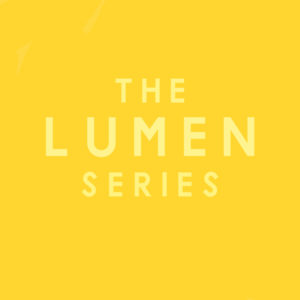
Christina Czarnecki
C: I was married twice. I got four children, four grandchildren and my first marriage I got an annulment from the Catholic Church. We were married in a Catholic Church but he’s not Catholic so they gave me an annulment. And then the second marriage: he was fine at first but then it wasn’t very good. He was supposed to be Catholic. He said he was baptized and everything. And then he didn’t let me baptize the kids. He said, “They’ll make up their mind when they get older”. My daughter and son ended up getting baptized, which is good. Except, my daughter is a little bit weird. She turned around and got baptized with the Mormons and she was not supposed to do that! We’re Catholic, we’re Roman Catholic! I was lucky because my mom and dad came from Krakow in Poland. That’s a history breaking place- that’s where a lot of Jews lived. They told me a lot about it. My dad owned a big field and that’s where the Germans came in on horses because they didn’t have any power. He really didn’t want to talk about it because he saw a lot of horror, and he’s dead now. My mom came from a really rich family. She went to work in Austria, they had a camp there where she worked as a secretary because she could speak eight languages. I can speak Polish, Ukrainian, some Russian, and a bit of German.
LS: When did your parents come to Canada?
C: They came in 1947, maybe a bit earlier than that. I was born on the 26th of May 1953. I had a rough life. I had one brother that wouldn’t stop bullying me. He just didn’t like me. Whatever. When I got pregnant with my first husband, I was here in Edmonton. One day, my stomach started to hurt so much and I started bleeding. I had to be rushed to the Royal Alexandra Hospital. Baby was born and then they asked me if I wanted to see the baby. I said, “Well yeah, of course.” But there were a lot of problems. He was very small. His brain was fried. He wouldn’t have made it. Then the doctor said, “Did you want us to bury the child?” and I said, “Yes but you have to call the priest and have him baptized.” Then, life got better and easier until that second marriage. He did everything to hurt me. He would put a knife up and threaten to kill me. He was not all there.
LS: Why did you marry him?
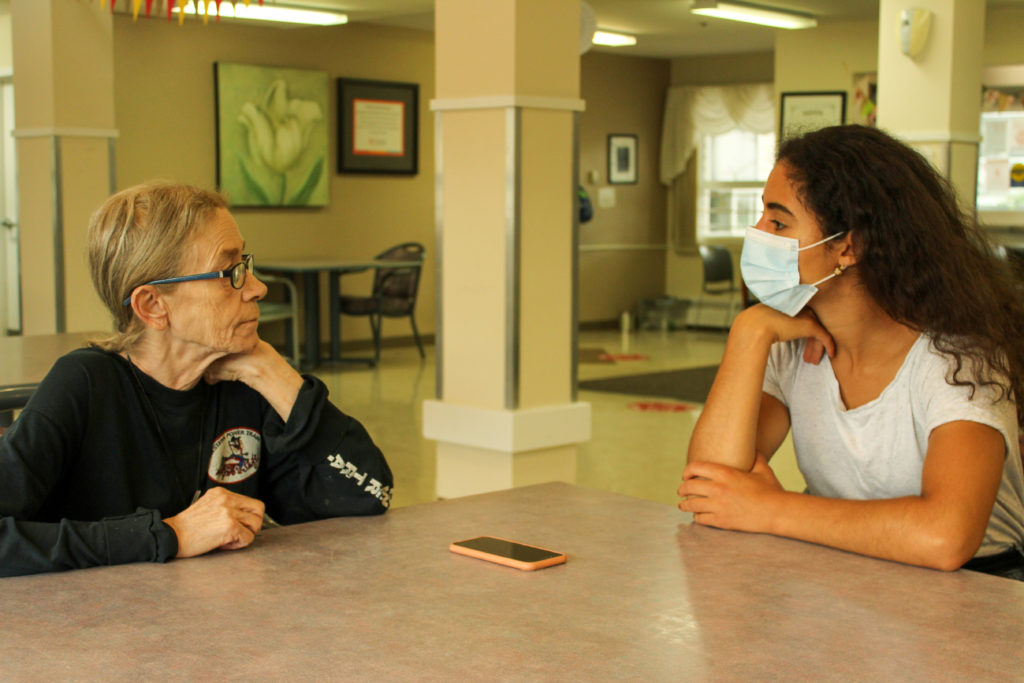
C: Because we were doing ok but then after a long period of time not so much. We became friends. But then that all ended. He took my daughter and he hid her from me but I found out from my neighbor, who was Polish too, where he was living. I had to go to court and fight for her. Today, I know where my kids are. They phone me and I phone them. My son Bobby and my dog Chino come to visit me every so often here at Sparling Lodge. I used to live in the building next door, but then they moved me here because I needed more assistance. They have a kitchen here that feeds us. The staff here is nice, the place is good. The people are nice too. I’m the only one here who doesn’t get homecare. I wouldn’t take it because I wouldn’t want to pay an extra $200 for it. I take care of taking my own medications. I clean my place three times a day all by myself. They come to clean it on Sundays but, there is nothing there to clean!
LS: What was one of the happiest moments of your life?
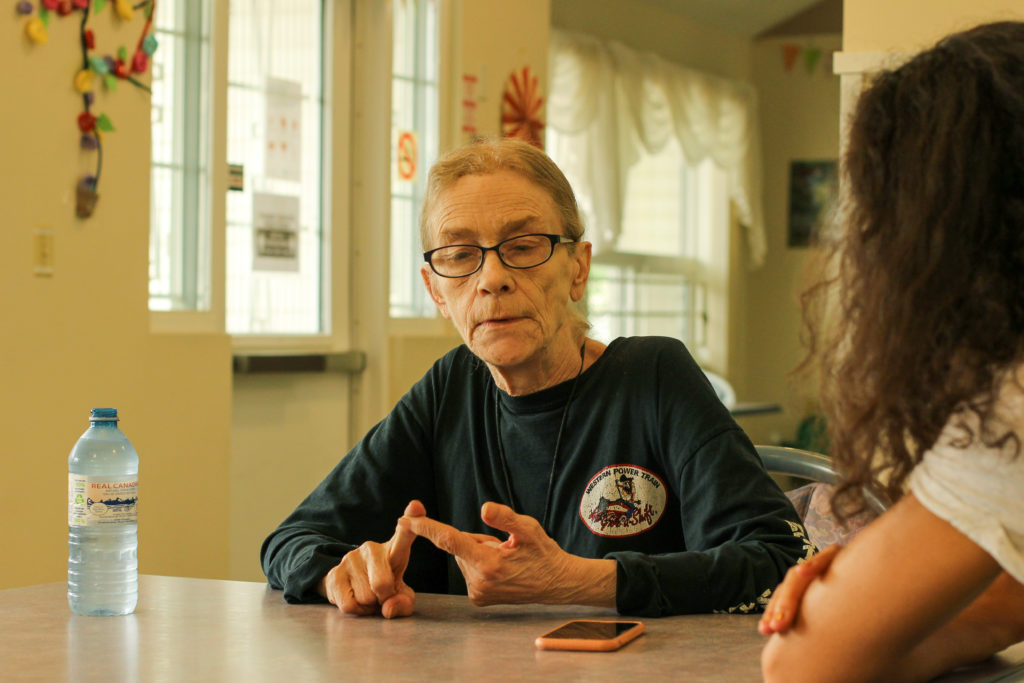
C: My youngest daughter was a very smart child. Her name is Kyla. I got a call from someone that asked me if I would be willing to put her in ABC Head Start, which I did. They helped her get into different activities and all that and they helped her get into Delton School. She was there until grade 6 and I worked there as a teacher’s aid too. My older daughter Tina has diabetes and a lot of pain in her feet. She is on AISH. And then my son Bobby did a lot of security work and had UFC cage matches. He is ok as far as I know. I haven’t heard from Kyla for quite a few years. She moved to BC with a friend for college and everything seems to be ok… I feel like if something was wrong someone would have let me know. She had a good life. Except I am a little worried about her and what she’s doing. But I can’t be doing that. She moved for college, so.
LS: What are some lessons you have learned from your life?
C: Be polite. Talk nice. Don’t cause trouble. This place is safe- we have our own rooms and we are safe. I take to a lot of painting and coloring. They are all up on the walls in my room. Here, let me take you to my room.
In Christina’s bedroom, she has an old radio playing background conversations. She takes us through her space, the art on her walls, and the shrine of photographs by her window.
C: I do word searches. The drawings I color come from a big book. I like my place, it’s clean. I have my own bathroom and a kitchenette. Here, let me show you my kids: this is my son Bobby, this is Tina. She’s a very heavy girl now. That’s my older son Stanley. These are my granddaughters Tasmin, Sienna and Maddison. This picture is me. This is Kyla. Then here are my mom and my dad and that’s me in their arms. Those are my brothers Stanley and Edward. I named my son Stanley after my brother Stanley because my brother passed away. He turned the corner and went off the cliff.
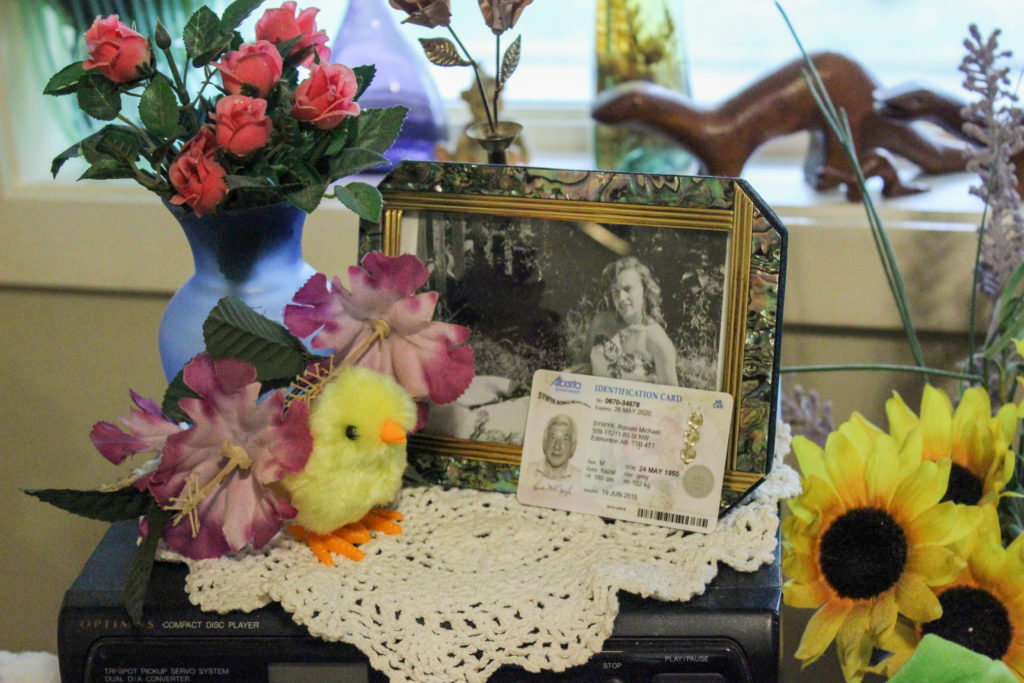
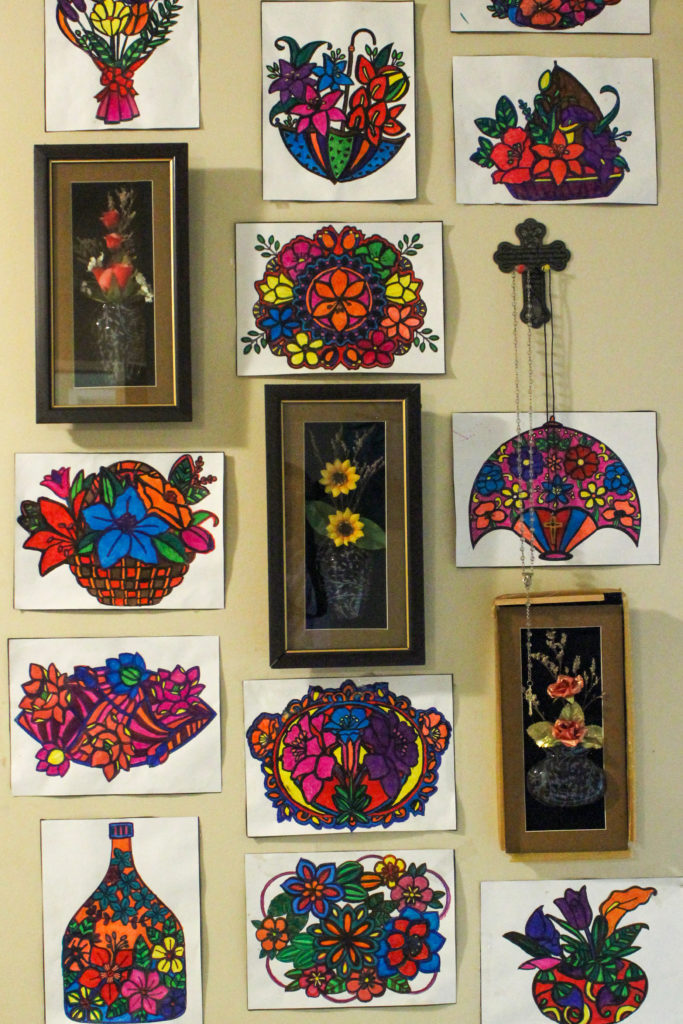
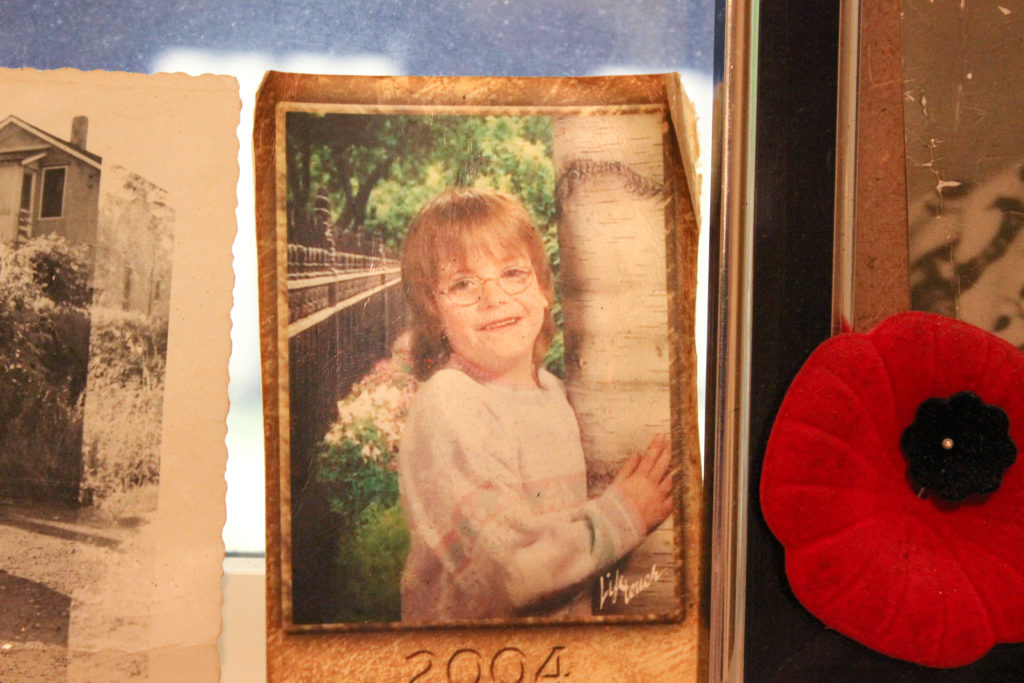
LS: That’s too bad, I’m sorry to hear that. Thank you for sharing your family with us. That’s very kind of you! And you have this magnificent painting next to all the photos as well, hey?
C: Yes, I painted that one. I call it Walnut Grove. Can you take my picture with it?
LS: Of course we can.
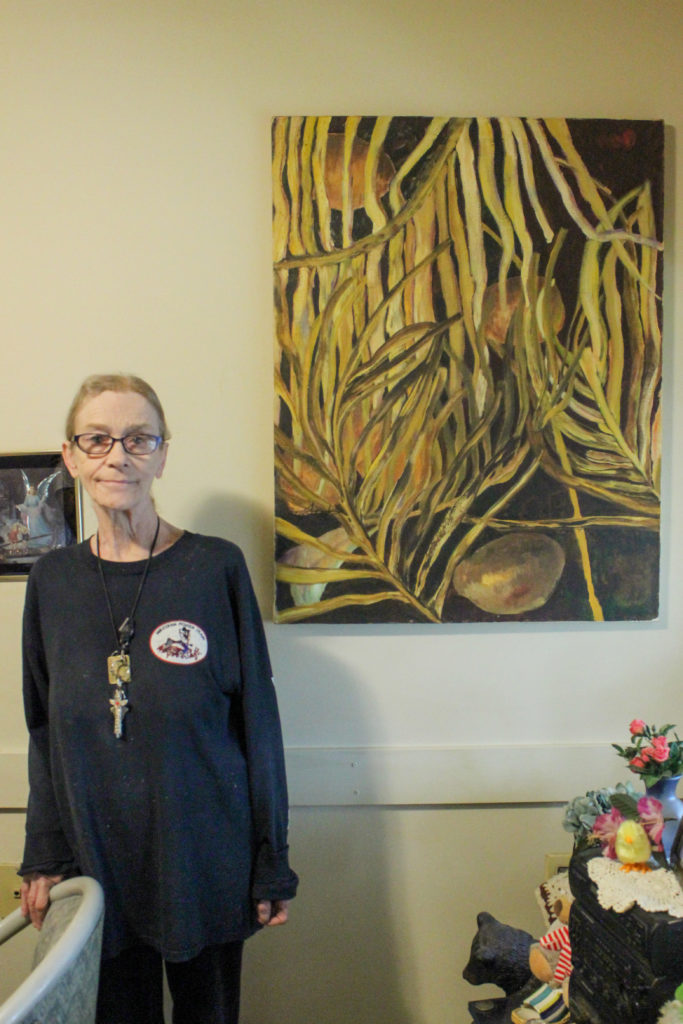
After Jersey takes Christina’s photo with her painting Walnut Grove, she picks up a driver’s license from the shrine of photos. It has the face of a man on it.
C: He has given me the best satisfaction I could ever have from a man. His name is Ronnie. We’ve been together for about ten years. He loved me, I loved him. We were both born at the Royal Alexandra. He was born at 09:50 and I was born at 09:53 on the same day. He lived in this building as well. Then in 2016 on December the 16th I was wondering where he was. He wasn’t feeling well, he said his chest was hurting. He phoned me at around 9:30 and said, “I’m just going to go lay down.” I asked him if he was going to go to the hospital… I begged him to go to the hospital. I said, “You just might be having a heart attack, Ronnie please go to the hospital!” Then, I didn’t hear from him. Nothing. I got very worried. I went downstairs and talked to one of the staff. I said, “I am worried about him and I want to go to his unit to check on him.” We went up and when I walked in, he was laying at the foot of the bed with his mouth hanging open. He had a major heart attack. I was very sad of course but I had great memories with him. I found his ID in his pocket and I kept it to remember him.
To read more stories, visit: Hello Lumen Series

Ghysiaina – OFSS Volunteer
L: So, you’re a volunteer here (OFSS)?
G: I like it, I like the people. I am nice with them and they are nice with me. They all know me very well now. I come in, say hi to everyone and they come in, they are happy to see me. They like what I do for them. I like them! Not all the time they are the way people think they are. Sometimes it just happens. You know? Something in their life went wrong and this is why I like them. They are great people. To me they are great people. And they help us too, oh yeah! They help me to bring the cups in from outside and they do the same thing inside. You know, they will put the chair on the table! Haha!

L: How long have you been volunteering at OFSS?
G: I’m just starting this year; I never did this before. But as a substitute teacher, you know, I work with all kinds of people, and you like them or you don’t. And most of the time I never have a problem with anyone. I love them. And they are great to me. You know, they return when I give it to them and the kids too. They know I accept them the way they are, you know. They’re all different, they are all unique.
L: Do you currently work as a substitute teacher?
G: Not currently, I am on EI. I have a pension. I’m on the Francophone school board. I used to do work with public and Catholic school boards.
L: Can you tell us about what it’s like being a substitute teacher.
G: Oh, for me, I love it. For me, I do. It takes me a few minutes to look at the plans of the teacher. And I write on the board what they need to know for the day. They know what they have to do. It’s easy. It’s good because I don’t have to deal with anything else. No report card, no behavior plan. All that extra, extra. I like to teach online. I’m learning online and it is something to learn.
L: What led you OFSS? Like how did you become connected with volunteering here?
G: I just came and give my name and Danielle took me and they put me with Marcia. She is very good; she is great to follow. She is a great cook. She looks at what ingredients we have and she makes a plan.

L: And you said you’re from Quebec?
G: I left in 1977. I came to live in Fort McMurray with my ex-husband… I don’t want to talk about him. Yeah. He was not a good man. He’s a beating man. Then I have to get rid of him or we would kill each other.
L: Oh, I see. We don’t have to talk about that if you don’t want to.
G: I went to school to get my education in B Ed. I wanted to be a nurse, but they didn’t have the program at the time. So, they switched me to education. I like it, but I wish I could have been a nurse. Because I have that in me. Helping people and I like what I do. Any kind of people don’t mind me. A person is a person.
L: Did you have any children?
G: I have two girls and they are in Quebec. They are women: one is 38, one is 37. I got pregnant, we separate, then he take me to Banff, then I get pregnant again. But that one made me strong to leave him completely. Because we have counseling, and they would put us back together because he love me! He love me, okay! But what kind of love it was? Every three months, he punch me. Every three months, he would do that.
L: How did you get out of that relationship?
G: Well, I finally say no more, no more. It was during a trip to visit his mother. On the way there, you know, we were all crying. I said, “I will take my luggage, leave me there. And I will find another way to go.” It was the baby girl who gave me the strength to leave him. The 38-year-old. She gave me the strength to leave him for good. Well, I don’t know. I just felt now it’s enough. I was feeding her, and we were crying. My daughter cry at the back. I cry in the front. The baby was on my breast. I said, “No, no, no”. So, I took them back to Quebec. We have a home in Trois Rivieres.
L: What was it like taking your daughters and just going away from that?
G: Well, it was okay at first because she was a baby, and she was really great at daycare. They love her! She was all the time smiling that girl you know. When she come home all tired I give her a bath and she fell asleep on the bath towel. She was so great.
L: When was the last time you got to see them?
G: Now is a long time now because they are over there in Quebec. I’m planning to move there but I have too much stuff to move, ugh. I have to rent a truck to move all my stuff. I have furniture, clothes, and bags because I put all in plastic boxes and double garbage bags to make sure everything is fine. And I have a truck and 19-foot trailer to move too. I live in a house right now.
L: Other than moving back to Trois Rivieres, are there other goals you would like to achieve?
G: Well, I think so. I would go live with my family, yes. But what I would like, I would like to have a nice loving man. This is what I want. I want to be in love. And I want somebody to love me. I need that. You can’t be alone for all your life. Some people maybe can live like that, but not me for me. I need someone in my life. I need to be loved.
L: Have you had any other people in your life who were able to give you that after your ex-husband or not really?
G: Not much. Not much because I don’t know. I don’t look enough my age, and sometimes younger men look at me… but I want an older man, right? And I look young. I want the older one, but often it is the youngest that look at me. What will I do with a younger man? I want a man. I want something older.
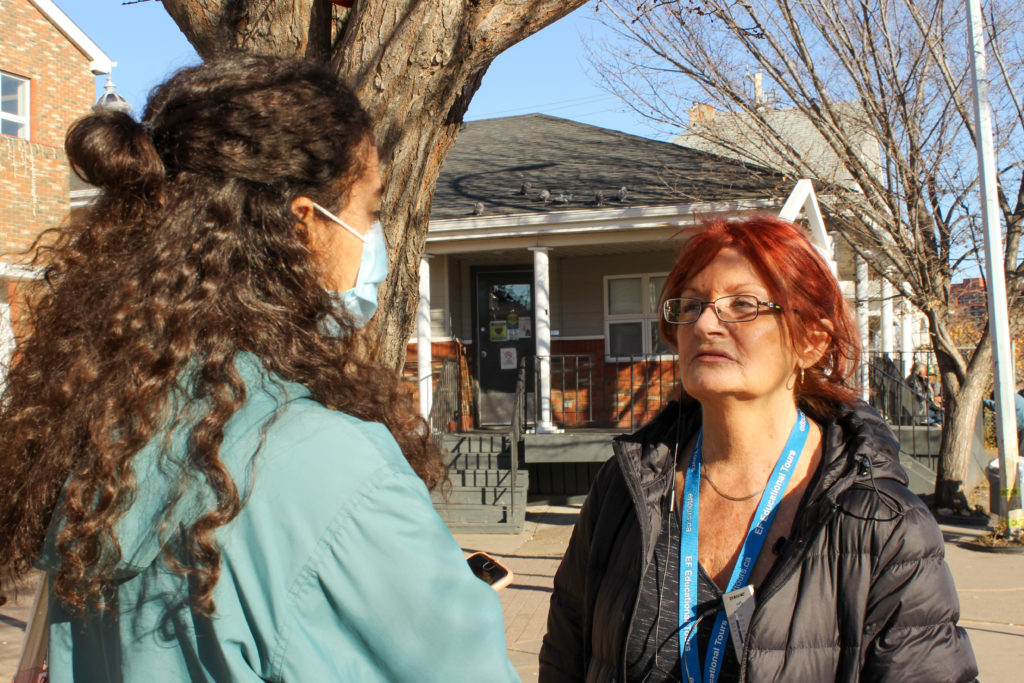
L: How old are you?
G: 73. I know, I know. That is why I always have this problem all of my life with that. Yeah. Yeah. I always look younger than I was. And before much younger. Now I am getting wrinkles but I did not have that. And my sister always would say to me, “Wait till you’re 50! Wait till you are 65! You will see!” (laughs).
L: Okay. Last question. Do you have any lessons from your life that you wanted to share? Any advice?
G: Well, it’s just love people. It’s love. What is it? It’s love. Everything is based on love. And for me, it’s what it is that the lesson is to love. And to be loved is the more important thing in life, in your life. To have someone love you, and for you to love them. Not only in one way though. It has to be both together. What is the most important? I did meet a nice man after my ex-husband. He was nice, he was gentle. But he got Alzheimer’s dementia. I spent 25 years with him but he got dementia. He is handicap completely. It defeated him. I don’t like to talk about it too much (chuckles). It makes me sad and I don’t like to be sad.
To read more stories, visit: Hello Lumen Series

Samuel Borges
SB: I’m Samuel, my name is Samuel Borges.
LS: Nice to meet you. Thanks for agreeing to talk to us. So we love to talk to folks that want to share their life stories. Is there anywhere you wanted to start?
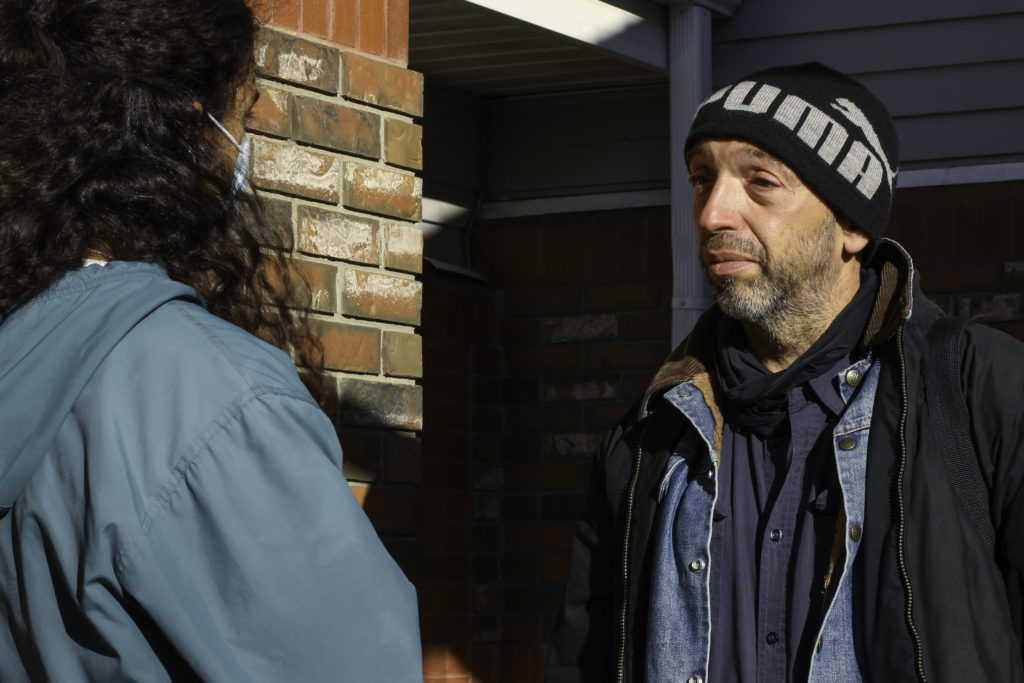
SB: Well, my wife and I had a business here in Edmonton for 35 years and it was a cleaning business and a commercial team. And we love it. The last few years before COVID it was getting difficult, but we were still enjoying it. COVID made it almost impossible. In fact, that I went bankrupt and broke. Didn’t help either. My wife didn’t, she went into a proposal, but we tried to manage, but COVID was just too much. Right. And my wife took it a lot harder than I did, but by the grace of God, we got the COVID benefit. You know? Thank you. This is an unbelievable government. We have, you know, I want to say that I’m happy to be a Canadian. I mean, every day, I thank God for everything he does for us. I mean, you know, we look at how things in America are shaping up and they don’t listen to each other.
And listening is important. Everybody wants to be heard. Right. And when you stop listening, it’s no longer a democracy. And that’s the most difficult thing, right? I have relatives in Boston and all over the United States. And the hardest thing is when they started saying defund the police. I mean, I know there’s bad in everything. There’s nothing perfect in this world, but we do have to stand behind law and order. And the rule of law it’s important, right? Because that’s how you maintain a society, but everybody has to have the right to speak. Right? You can’t muffle anyone. Everyone has the right, right or wrong. And the thing that made me more active in my community is when I decided to finally give my life to God. And I realized that I owe so much to so many people: my church, my city, everything. And I wanted to give something back. And there’re so many children on the street that don’t even have parents or anyone to look up to. Right. And I came from a family with two parents. It may not have been perfect, but they believed in God.
My parents were actually from the islands off the coast of Portugal. They immigrated to Canada and started a new life. And that’s the reason I’m here. And it’s so amazing. Right. I could have been born there and it’s much worse in that country. Portugal is a difficult place to live, but it’s not the worst place. It’s not the worst place ever. There’re so many other terrible places where you can’t even get drinking water; you have to go miles to get water. I could go on and on.
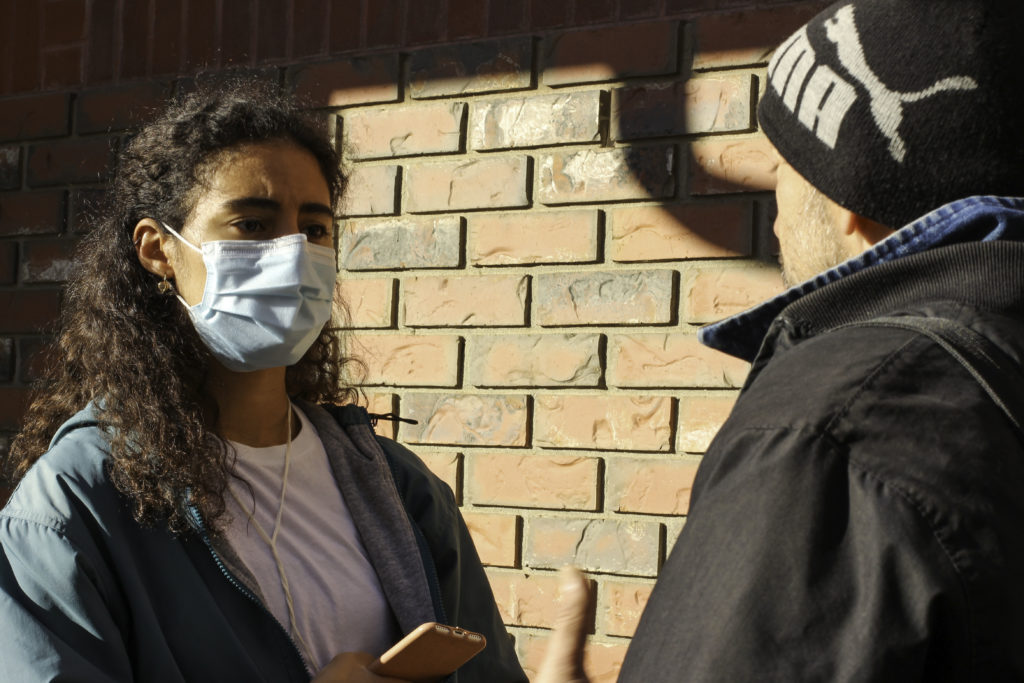
LS: Let’s go back to, I guess, this year with COVID and how it made it really hard for your business to keep going.
SB: We lost the business, we lost the business, but it was difficult. And my wife, she was so burned out from the business. She just went into a depressive state and she has asthma and thyroid condition, so many other things, and she’s just a fighter. She’s always fighting. She didn’t want to give up. And it was actually a blessing that we lost the business because it was already failing when it finally just went up. And I was glad because I didn’t want to lose my wife. And she was, she’s a fighter, she’s Irish. And she never gives up. She never gives up. She just, she’s amazing. And she is my hero.
LS: I love that. So how did that affect your day to day, kind of like, how did that change your life? You said, you said it was a blessing, right?
SB: It’s a blessing because I mean, I had been, you know, I had been doing drugs towards the end, like to cope with stress and whatever else. And it was not a good thing. It was about seven years ago that I started using drugs. It was kind of like a midlife crisis where you decide all of a sudden, hey, that’s okay to do this and this and this. And it helped me to work harder, faster. And it was a really stupid, right. And when I finally realized what I was doing, I almost died before I was getting close to having a heart attack. I thought I was going to go broke. I didn’t think I was going to be able to handle it. So I took an overdose and my wife found me and she called the ambulance (crying).
LS: I’m so sorry.
SB: I’m just lucky to still be here. I got two ventricle blockages. A team of neurologists and cardiologists keep asking me, “How are you still alive?” I say, “There has to be a reason why I’m still alive.” And I just thank God everyday for every day. Right. And my beautiful wife, the only thing I worry about is, you know, I never saved anything. Right. So I think God is keeping me around to bless her because her family died. She has no family… just me (chuckles) and I made a mess of things, but I did drugs. You know, but I came from a very strong Christian background. And I said, I’m not giving up. And God saw fit to make sure that we got the COVID benefit and she got a chance to take a well-deserved rest. And I said, I’m not going to sit at home.
I decided I’d go downtown. And I first started talking at the Edmonton Convention Center when they were having the shelter there. And I met a lot of people that were doing drugs. And I talked to them about how, you know, going off drugs with the help of God in my life: Jesus. And that, you know, I told a lot of people and I got to meet the most amazing people that I’ve never had a chance to talk to. And you know, like the homeless people are unbelievable that people go through every day. Right. And they’re just unbelievably kind in the most adverse situations. Right? I mean, like when I had no money, one time the man who had nothing, I knew he just came up and gave me $20. He said, “Sir, you need to have money.” He gave his last 20. I couldn’t take it. But he was going to give it to me. He had nothing. And he was going to give me this last dollar. And it’s just like, wow! That was last year, last year that happened.
In any case, there’s a lot of excellent facilities all over the place. Like there’s a lot of good being done. Like there’s days when I’m walking around the Boyle street area and people stop their cars and open up their trunks and the minivans and there are piles of backpacks and coats and they bring food and I go “wow!” We got a lot of beautiful people in this country. A lot of people that are trying every day, even, you know, people say, “Oh, that rich person doesn’t know!” But you don’t know what he’s doing. You don’t know who helping. And God says, don’t judge, because you don’t know what he does. All right.
Jesus said that. He said, don’t judge anything. You don’t know the heart of any person. Right. God loves, you know, and I’ve never loved anything… except money until he took all away. And it’s the most beautiful thing, I lost 70 pounds too beause I was walking everywhere. It was like it helped me stay alive because I never walked anywhere in my life. I was always in my car. Even if I had to go to the drug store, I jumped in my car. Right. And like I was overweight, I was ready for a heart attack. And then God decided to make me broke, to keep me alive, I guess. (chuckles). And that’s the greatest thing in the world because now I go jog by the river… we have one of the most beautiful green spaces! It’s like, wow. I used to drive out of town to go and see beautiful places like the Rocky mountains and Banff national park, you know?
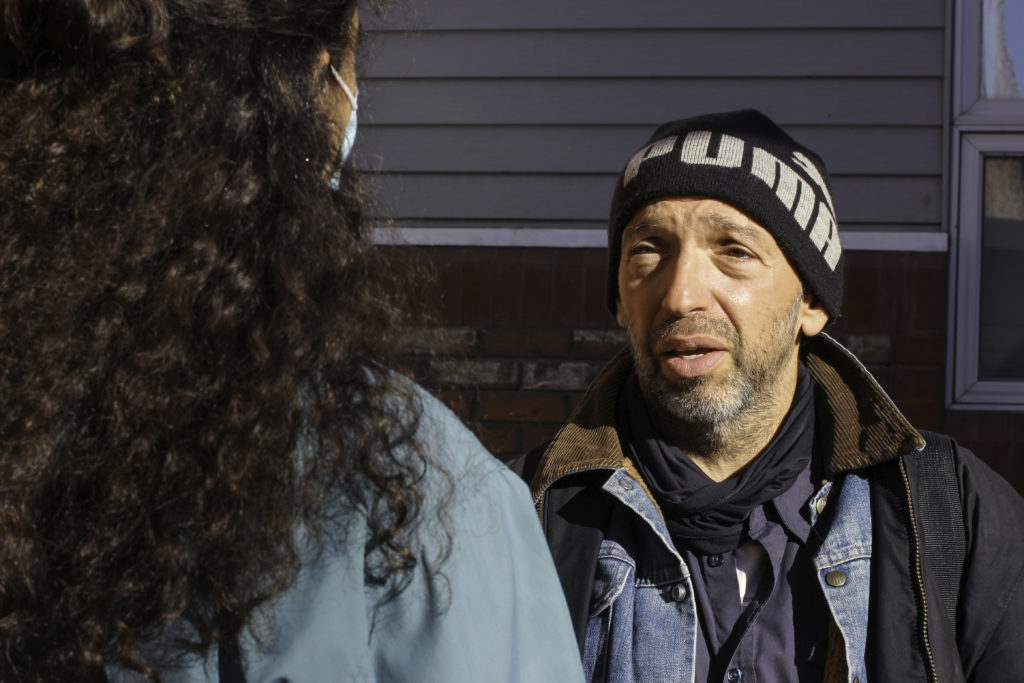
LS: So do you live around here? I
SB: I live in the brewery district. I’ve lived there all my life and it’s a beautiful area. There’s a lot of new development in that area. It’s a really vibrant area. I mean, they just rebuilt the Roxy theater and its beautiful new theater and it’s,I love that area.
LS: So what brought you here today?
SB: I mean, I come all the time. I’m affiliated with the Central Seven Day Avenues church. And I talk about, you know, changing your life with God. Like there were so many things I tried… that didn’t work, right? But when I gave my life to God, all of a sudden I had a strength that I never thought I had before because I had this Father that loves me. That changed my whole paradigm, everything. Right. And it just gave me the courage to do things I never thought I could do. It happened almost seven years ago, so. It was a slow progression. It’s a very slow progression. It was a very different paradigm, right. To give up all these bad habits. Every day I just took a little step.
I mean my youngest sister, you know what she said to me? “A journey of a thousand miles begins with one step” and I never forgot that. I never forgot that. My youngest sister, she’s like a ray of sunshine, she always laughs at my ridiculous jokes. And she was the only one who talked to me because I alienated everybody in my family because of my drug abuse. And like, I was doing a lot of things that weren’t cool. And my family is very traditional and I was scaring them. Right. And rightly so.
LS: What was it like having your sister as an ally?
SB: She was just like a joy. She’s like a Ray of sunshine. Her name is Christine. She never judged me. She was always there with big hugs and smiles and she laughed at all my jokes. The biggest way she helped me was just by listening. And, and of course laughing at all of my corny jokes. She’s just a joy.
And of course my wife is amazing. My wife is amazing. She just put up with me for 35 years and trust me, I’m not an easy person to put up with, but she’s Irish and Nova Scotian and that’s an unbelievable combination. And I’m just so lucky. I never appreciated anything until I almost lost everything. And now I appreciate everything. And I thank God for that.
LS: What would you say is the happiest moment of your life?
SB: My happiest moment of my life is the first day I laid eyes on my beautiful wife, Patricia. Patricia Patterson originally. The first time we met I was at this office party and she was with someone else at the time and you know, I wouldn’t say hi to her. And she always remembered that. Right. But there was something about her, She was kind of a little taken aback that I wouldn’t say hi. I felt it wouldn’t be appropriate, but she had never forgotten for some reason. And we met years later and she was wearing these unbelievably yellow tights. I was with a man, his name is Ivan and we were working together. He says, “You like that girl, go and ask her out!” And I said, “No, no, no, no.” But I did. And I never regretted that ever since. You gotta have courage when you meet that girl, just jump. Right. You know? If you’ve got a great girl just never let her go. Never let her go because years later you’re going to realize you’ve been through everything together. Just wow.
LS: What did you learn from your relationship with Patricia?
SB: The love of God. Forgiveness. She forgave him. And when she didn’t need to forgive, she did. I was unfaithful to her and I made a mockery of our relationship.She forgave me because she loves God. And she loved me when I didn’t deserve her love. And one thing I needed to do was to confess to her everything that I’d done and that I wasn’t wanting to do because I was broke! I was thinking I’m going to end up under a bridge. And that scared me to death. Right. But I was compelled to do it because it was the right thing to do. I couldn’t live with myself. I had to tell her and I couldn’t believe it. She forgave me. Right. She was upset of course, but she forgave me. And there were a lot of difficult times but I weathered them and I tried very hard to change everything that I did.
I never did any dishes my whole life. I didn’t do any dishes. I didn’t vacuum. I didn’t do any laundry. Now, all of a sudden I’m doing everything and she’s going, hold on a second, “Who is this guy? Where’s my husband? He’s supposed to be on the couch.” I said, “I don’t want to go sit on the couch and watch a football game anymore. I want to help you with everything. Now, I want to do it for you. I want to be there for you.” And that’s the way it’s supposed to be something like a husband and wife are supposed to help one another. It’s a team. The most successful relationships were the ones that respect one another and help one another. And then it’s a joy. The relationship is a joy. When you have that perfect team. There’s no, “I” in team, right? And the fact that she forgave me and trusted me enough to change my life showed me the love of God for the first time in my life that there was God. Because I saw it in her, I saw it in her brilliance. To forgive is divine. Right. And anybody that does it, it’s a beautiful thing. It’s so beautiful.
LS: That was very beautiful. I only have one other question. You shared with us a lot of wonderful lessons, but we always like to end by asking folks if they have any advice they’d like to give to others based off what they’ve experienced.
SB: Love conquers all. It’s important to realize that those difficulties in your journey are what builds character, right? And when you have adversity, it’s for a reason. It’s to show you what really matters in your life. And I used to think it was money and having things, but the people in your life are the most important thing, because when you’re an old man what are you going to be looking for? Are you going to be looking for your pocket book or are you going to be looking for the people that you loved? That’s the most important thing of all. And I never cared about that. And thank God I learned it before I lost everything. That’s the most important thing is: love. Love conquers all. There’s nothing else that matters. It’s all that you take into the next life.
LS: Thanks so much. Is there anything else you wanted to talk about?
SB: Jesus loves you. That’s all you know, and you guys are doing a beautiful thing.
LS: Thanks for joining us today, Samuel.
To read more stories, visit: Hello Lumen Series

Keith
L: What was the most memorable moment of your life?
K: When I used to play professional soccer for the Whitecaps in Vancouver. I played from 1966 to ‘69 when I came to Alberta. I stopped playing because I lost my legs. I lost all blood circulation in one of them and it turned black so they cut it off. Then in a month it happened to the other leg and they had to cut both off (chuckles). And that was a shock!
L: Wow. What lead to the lack of blood circulation?
K: They just lost all blood circulation and they just turned black. I probably damaged them a lot when I played soccer. I started playing soccer probably when I was five years old. I played juvenile soccer, then junior soccer, then pro soccer. I coached a lot too and got a few awards for coaching and for playing. I was a good baseball player too. I always had the highest batting average in the league. Stuff like that. I was a good athlete.
L: How did you end up playing for the Whitecaps?
K: Well I was scouted. When I played juniors, when I was younger, I guess they just liked the way I played. It wasn’t that I was a big guy, I’m a small player (laughs). I just loved playing the game.
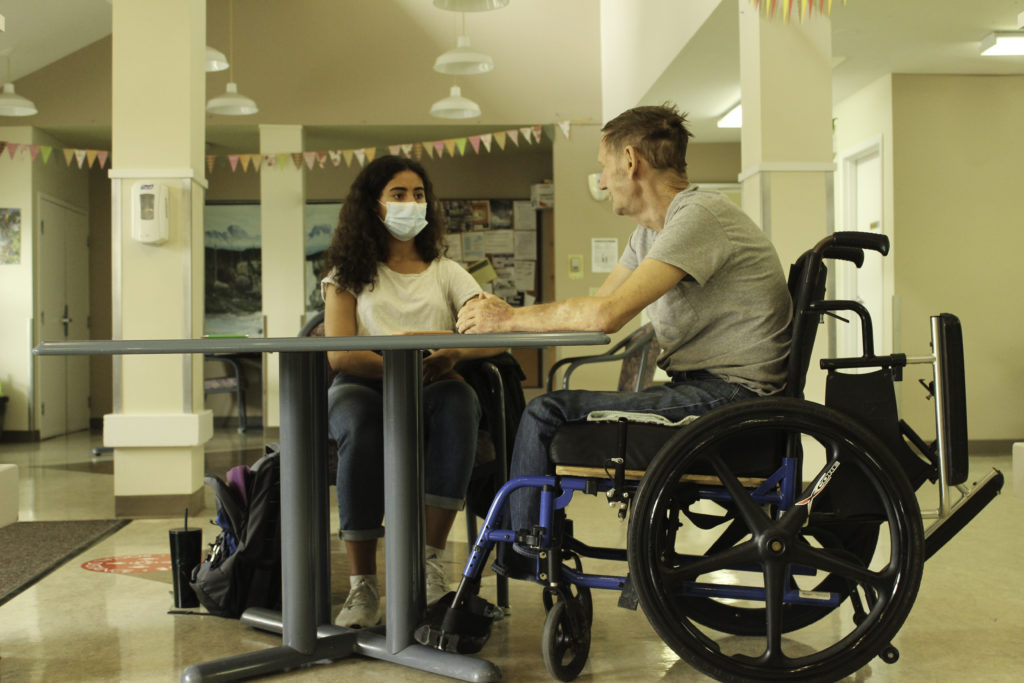
L: How did soccer shape who you are?
K: It’s no different from baseball or any other team sport. You have to have good sportsmanship and be a team player. You have to like being with people and enjoy connecting with people on and off the field. You play better when they cheer for ya! I’ve always been an easy going guy.
L: I like that philosophy a lot.
K: Yeah, me too. I didn’t get the amputation in 1969, by the way. It happened three years ago.
L: Why didn’t you stay in Vancouver to keep playing professional soccer then? Why did you come to Alberta?
K: I needed to work and make more money (laughs)! I was in the restaurant business, and I built houses. I was a framer. So, I’ve always been active. I’m 73 now and still going.
L: Did you keep playing soccer after you moved to Alberta?
K: No. I got married to a nice lady and got busy. I’m still good friends with her. We didn’t fight or anything; she just had her way and I had mine.
L: I’m surprised you just stopped playing soccer, though!
K: I just got busy. I played a couple exhibition games but I just couldn’t find the time for it. I should have played longer but it was part of life! I got a boy and a girl from my marriage and my daughter turned 50 this year. Father’s Day was the last time I saw her. My son is in Vancouver and all the rest of my family is in Vancouver. My mom only died two years ago, my dad is still living. He is 103! He’s still walking, he’s not in a wheelchair yet!
L: How did the amputation affect your life?
K: Oh yeah, it slowed me down. Put it this way: there’re a lot of places I can’t go while being in a wheelchair. To get in a mall or something, you can’t get up unless there’s an elevator or something. You can’t see it all. It’s just restricted my mobility. Or when I go to the mall, little kids look at me and ask, “Why is that guy in a wheelchair, daddy?” and the dad gets a little embarrassed! I offer them a ride if they want to sit on my lap (laughs)! Anyways, I’ve just accepted it.
L: What’s your day-to-day like now?
K: Boring! I’m okay with it now. It took a while to get used to. You know, not being able to just get up and walk. If you gotta use the washroom, you gotta hop out of bed and into the wheelchair then gotta hop back on to the toilet. At least I got really good upper arm strength. I don’t work out or anything! I honestly don’t know how I maintain it… I just always had it. I guess now I just keep it up by moving my body where it needs to go. Every once in a while, I have to face some stairs. Yeah I could go up stairs myself, but then how do I get my wheelchair up?! So yeah, it’s just that a few things are inconvenient but not much else. It bothered me at first, but not now. You’ll never be 100% used to it, but that’s life.
L: That makes sense. Going back in time to when you moved to Alberta, why did you choose to work in restaurants and frame houses? Why were those jobs a good fit for you?
K: I love to cook. I was manager of the place, but I did a fair amount of cooking especially when people didn’t show up to work. It was called Hasselway House, and it was on the corner of 105th and Jasper avenue. The reason it went down was a fire. The fire started in a flower shop half a block down and my restaurant was close enough. I mean, my restaurant was able to seat 110 people. We served mostly breakfast and lunch, American style cuisine. It was not a dinner crowd although we were open then.
L: Did you start the restaurant on your own?
K: Well, no, my father started it and I took over. He moved back to Vancouver when I did. It was a big change for me, but I enjoyed it. Unfortunately, I didn’t really keep cooking after the restaurant went down in flames. My wife was the main cook cause I was at work all day, framing houses. Let’s put it this way though: my wife was a good baker, and I was a good cook (laughs)!
L: How long have you lived in Sparling Lodge?
K: For two years now. I came straight from Glenrose, dear. I enjoy being on my own and around here, everyone is nice. You get a lot of privacy here which is nice. I have my TV, cable, and radio in my room. I like to read. Everybody is friendly here and that’s one of the main things about this place: no one gets into your business, everyone leaves you alone, but everyone is friendly. I love this place! Every once in a while, a sing-along or BINGO night or something once a week for something to do pops up.
L: What’s your favorite activity?
K: Sleeping! (laughs). I like to get a good 8-10 hours of sleep. I sleep well. A lot of people can’t sleep but I have no problem sleeping.
L: That’s amazing. Sleep is #1 for a good life. You need to get a good night’s sleep. Do you have any lessons from your life that you’d like to share?
K: Put it this way: If something happens to you, you have to accept it and just try to do as much as you can to take care of yourself. Like me with the amputation of both my legs: don’t let it slow me down! Keep going. You might not be able to do things you used to be able to do, but you still have more freedom than you think.
To read more stories, visit: Hello Lumen Series

This interview conducted by Yesmine Elloumi and Jersey Manabat of The Lumen Series in partnership with Operation Friendship Senior’s Society.
Diana
Sparling Lodge
L: So you’ve been here for seven years in this building. That’s quite a long time.
D: Quite a long time, but it’s a nice place to live. I like how friendly everyone is. I like the convenience. We’re close to everything we want to go to. And I like the programs they’ve got. I LOVE their food. And the staff is just fantastic. So we got everything.
L: Where are some of the places that you like to go?
D: I love to go to the parks. I love to go to the hair shop. I guess I’m just so comfortable here and I think that’s the main objective. As for the food, they’ve got a variety, which is so nice. We always seemed to have a variety of different things going on and we’re offered fresh fruit. You know, it just makes such a difference to have all that. And the variety of meals is great.
L: Was there a meal that you kind of really liked that they make?
D: I liked them all. So I had to say one more than the other, but I love when they make the pizza of course!
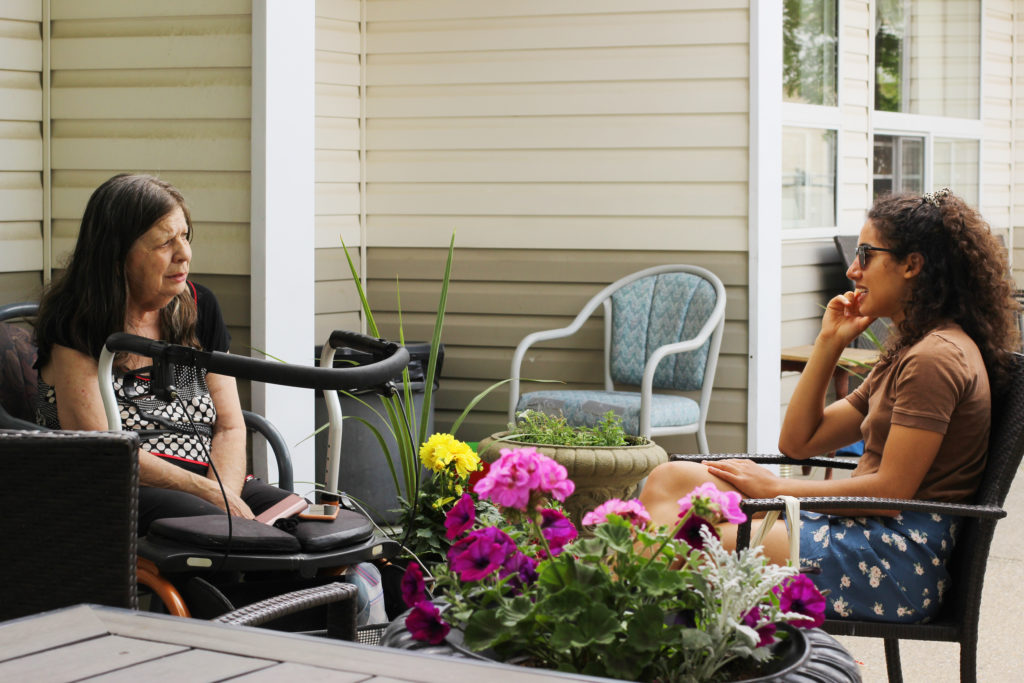
L: Well it’s a good thing you live so close to the Italian Centre!
D: That’s exactly right, that’s what I mean when I say it’s all about convenience! I go there maybe once every week and a half. Two weeks. I’m addicted to diet Pepsi. I like to get diet Pepsi or diet Coke either way. Or pick up some snacks which are nice. From their bakery I love their cream puffs and I really pig out on them!
L: Oh I am the same when it comes to bakeries: it is really hard for me to hold back. So living here for seven years, have you made some nice friendships?
D: Yes. I made some really nice and some. There is one very difficult lady here and it’s so hard. some days. Like today, just before lunch, she called me a bunch of dirty filthy names and, you know, I should, I should get used to it. I’ve been a registered nurse for 31 years. So, I heard a lot of things, but it hurts when it’s directed. It’s in my home. That’s the worst of it. It’s ruining my happiness.
L: So sorry to hear that.
D: Yeah. And I actually like to tell you the truth today, I thought about moving out, but then I thought, no, after seven years, I’m not going to get her to push me out. This is my home.
L: Right. And it’s difficult living with so many people coming from such different lives. There are lots of different reasons why someone might behave a certain way. I bet as an RN, you really learned to not take things personally.
D: Oh, definitely. It was trying at times, but it was very satisfying. After 31 years, I must’ve liked it or else I wouldn’t have been there that long. Yeah. And then I worked in trauma, I was always in emerg. I worked at the Royal Alec and at the University too which was a great place to work.
L: Did you do your nursing school here at the UofA?
D: Yes. I was born outside of Edmonton in Drayton Valley, but I came into Edmonton to take all my training.
L: What was some of the most challenging parts of being a nurse and how did you work through them?
D: The most challenging part? The very difficult patients as we always have some of that. But we learned to cope with it, roll with it, and be reasonable and it all worked out fine. But sometimes it can be very difficult.
L: And in terms of difficult patients, do you have any examples of what it was like for you?
D: Well, for instance, some of them would come in and they would be very angry for sure. So they would spit on me or when I had to examine them, I had to take the blood pressure and everything else. They would claw, they would fight. Some of them would try to bite. So, it was definitely a challenge! And you’re going to have that challenge too, honey.
L: That’s interesting because one of my best friends who has worked as a nurse for a year now was telling me how she had a patient use a coworker’s stethoscope to strangle the coworker while they were examining the patient!
D: You never know what you’re going to get! Sometimes it’s just so funny and you can’t help yourself from laughing although you know as a professional you shouldn’t. It’s usually because their presentation is just so wacky- out of this world. I get such a kick out of it although I know that I have to keep a straight face.
L: I bet. Medicine is a funny world where we need to stay professional and somewhat detached although so much is going on for the patient and their family. Since you worked in the emergency room, you likely had a lot of trauma patients that you looked after?
D: A lot of trauma. Yes, yes. I had to deal with a lot of trauma patients. I found that the worst for me was when it was the children. For instance, the one that always sticks out for me is a three-year-old that was brought in and she was raped by her stepfather. Now that’s something you have to deal with… but it’s so hard. Oh, that little girl. I will never forget her as long as I live. And she just, just hung onto me.
L: She must have been completely petrified.
D: She was petrified and just completely traumatized. I had to phone child services and they picked her up and that was even harder on her of course. But she couldn’t go home with her mother because the boyfriend was there. Some children were brought in, they were beaten so badly by their parents. You know, it’s the children that get me the most. I can deal with anything I’m sure I can. But with a child it’s so terrible. Especially when a child would die in the emerg.
L: How often would the emergency room have patient deaths?
D: Quite often actually. Like at least four times a month. You’re getting so many different types of traumas so it’s common. And I would think, oh my gosh, why did I go into this?
L: What helped you stay resilient?
D: My friends after work. They were outside of healthcare. We’d go out for supper after my shift if I was on day shift, right? We’d get some food and have some drinks. It was so relaxing. And that’s what you need after your 12 hour shift of crazy. I did my fair share of nights too.
L: You did your fair share of shift work then. If you worked for 31 years, did you retire at the age of 65 or a bit earlier?
D: Later actually. I was 23 when I finished my training. Took me four years. I took my training in trauma and emerg because that’s what I wanted to do.
L: What do you think compelled you to that specialty?
D: I don’t know what it was, to be honest with you. I think it was a natural feeling to help someone in distress, to help someone that was really injured or hurt or, you know, it was compelling for me. It just seemed to come naturally.
L: Have you had some physicians that you really clicked with?
D: Well, of course in trauma and emerg is where I met them. Some I just clicked with. Some One of them was just special. He handled the patients in a different way, he was more understanding, he was patient.
L: That’s really important that they were like that which is different from so many emerg docs that can get so burnt out and become just like zombies.
D: Yeah. They do. They really do exactly. Exactly. It’s hard for the physicians in there in emerg. Well, they really become so burned out, they become so overtired that you could tell they just walk like zombies all the time. It’s really hard on the nurses and the patients to see that. And then when a patient comes into the emergency with a trauma, the doctor has to be right on top of it. Sometimes the doctor would get so grumpy and I’d go onto my breath, “Shut up.” (laughs).
L: They needed some selfcare.
D: My selfcare was hanging with friends then going home, having a hot shower and hitting the sack.
L: I’m glad you were able to take care of yourself when you were taking care of others! My next question is did you notice changes in healthcare over the course of your career?
D: Oh so many! There was more care in healthcare. Doctors and nurses had more time. That’s what it was all about: time. And then it became so overloaded with patients. So many so fast so we couldn’t keep up. We couldn’t give that specialized care that we wanted to give. Which I found so sad, but you did the best you could. I mean, if you’ve got all these patients ready to see you then you have to pretty well rush through it, you have to. Right. So I thought that was fairly sad. It’s a timeslot… 15 to 20 minutes that you have to talk to the patient and come up with a plan.
L: That’s hard because even when you try to take a focused history to finish up the encounter in 15 to 20 minutes, the patient may share something significant near the end of the history and then you have to explore that.
D: Yes! And so you never know what you’re gonna get!
L: So time has gotten limited since you started working. What else has changed?
D: The tests being ordered, the technology has advanced. However, I think that not enough tests are being ordered. I got the sense that doctors were kind of like, “Yah.. let’s get them out of here.” The docs were more thorough in the past but honestly I don’t blame the docs today because they don’t have the time. There can be so many patients and just one doc on shift. It’s horrible.
L: What is one of the more positive changes that have happened in healthcare that you’ve notice across your career?
D: Well, the lab work has improved in terms of how quickly we get results and what we can order and investigate. The toolbox has expanded. The xrays have improved so much, everything has gotten better in terms of technology.
L: Since your retirement, have you had to visit the hospital as a patient?
D: Twice. Since I worked for years in trauma and emergency,my back is shot. Before all this new technology and everything came out like lifts, we had to just literally pick the patient up and that took a toll on my back. There was no other way of doing it! And sometimes we would have large patients and we would have to call in backup. Anyways, I was in the hospital for two weeks because my back was so bad. And then I was told they would like to go in and repair a couple discs, but I haven’t got right. If I can do without surgery after what I’ve seen, all the better.
L: For sure. Everything in medicine has risks and benefits so you want to make sure the benefits definitely outweigh the risks as much as possible when making any decision like surgery. I like to advocate for preventative medicine as much as possible so you don’t have to get cornered with a tough medical decision.
D: Yes, exactly. The second time I went in, I had trouble with my stomach. It’s bothered me for about four years and I refused to go in. “I didn’t have time! I was too busy nursing!” So finally I couldn’t tolerate it anymore. And my mom said while she was still alive, “You go in, or I’m gunna have to turn you in!” and she was this little 94 year old woman trying to carry me in. So I went in and I learned that I had a rupture in my esophagus.
L: Oh, my. Did you have heart burn?
D: Oh yes, for a long, long time. So then I have to have surgery for that. And that was one of the hardest surgeries ever for me. I was so sick! I’m telling you I was in intensive care. And then I was in the hospital for two and a half weeks. This was before endoscopy so I had a pretty invasive cut that needed healing.
L: That must have been really difficult and painful for you. I’m really happy you were able to recover and are doing ok today. I do have a few more questions if that’s ok. The first is, what was the happiest moment of your life?
D: The birth of my children. Two children. That was the absolute best. And they’re the best of my life… they are my whole joy. I love them so much. And I’m divorced. My husband couldn’t tolerate my shift work, right? He didn’t like my shift work and he gave me an ultimatum: either quit the shift work or he’s leaving. I wasn’t going to quit the shift work for my career! That’s my love! (laughs) So he left! (Laughs more). And that was okay, I didn’t mind. I think he was just jealous because I would give my time to emerg and he wanted more time from me. But I thought grow up, man. You need a babysitter, a mama. You don’t need me.
L: That’s hilarious. Did the divorce happen when your children were younger?
D: My son was 14 and my daughter was 10. So they were taking care of themselves and they understood. Cause I didn’t ever have anything to surprise them. Everything was wide open between me and my kids, so they understood. And they were good.
L: Most times kids just want to know what is going on.
D: And that was what it was, you know! And I told him, I said, “We’re just not going to be able to live together anymore, Mom and Dad.” Then my son says, “… I figured!” (laughs). So I asked him, “How do you feel about that?”. And he just said, “Ok!”
L: Definitely. I believe that children would rather see their parents happy. Happy mom, happy child.
D: And I got such a kick out of them, we would always have so much fun. Ohhhhh! The things we did together, you would not believe. They both live in Red Deer today so I don’t see them as often but we always talk on the phone. I would be lost without them. And then I got a grandson from my daughter, so he phones me every night. That little shit he knows how to dial the phone! He’s seven years old so I guess it’s not crazy that he can use the phone. Every time the phone rings I can guess it’s likely him calling. Last night he said to me, “Grandma…” I said, “Hi sweetie!” and he responds, “… have you got a boyfriend yet grandma??” (Laughs). I said, “No actually… Do you want to find me one?” and he goes, “Right on!” (laughs). Everything is “right on!” with him. I love kids, I just love them.
L: He sounds like a thoughtful kid with a funny personality! My last question for you is: what are some key life lessons that you gained through living your life?
D: Relaxation. Take time for yourself. Very, very, very important. Make sure you take time for yourself sweetie. You don’t want to become burnt out and depressed.
To read more stories, visit: Hello Lumen Series

This interview conducted by Yesmine Elloumi and Jersey Manabat of The Lumen Series in partnership with Operation Friendship Senior’s Society.
David
Seeds for Seniors Program
L: You told me that you’re pretty involved in the garden here, hey?
D: Yeah. Well I figured I lived here two years and this year I started to get interested in it. I wanted to get outside, get some fresh air, work around the garden, work and get your hands dirty. That’s basically what it’s all about: getting dirty. It just feels good when you get your hands in the earth. I mean you can always wash it off! As far as I’m concerned, I don’t see why these places that have their own backyard don’t start their own garden. They just need to build some boxes and that’s it! And people would be out more, helping with the gardens too.
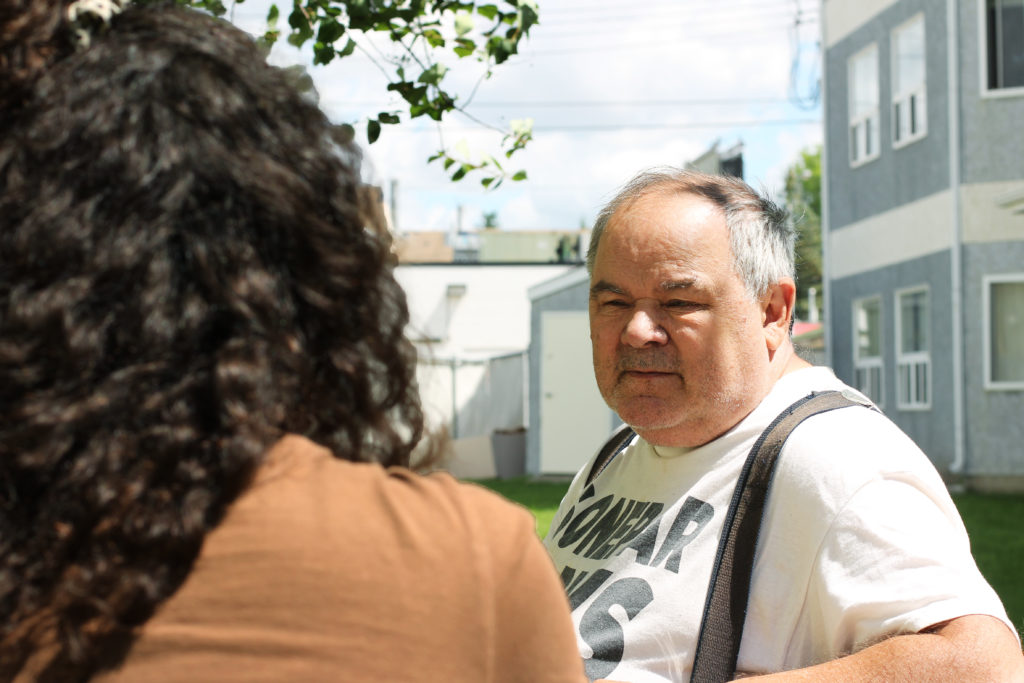
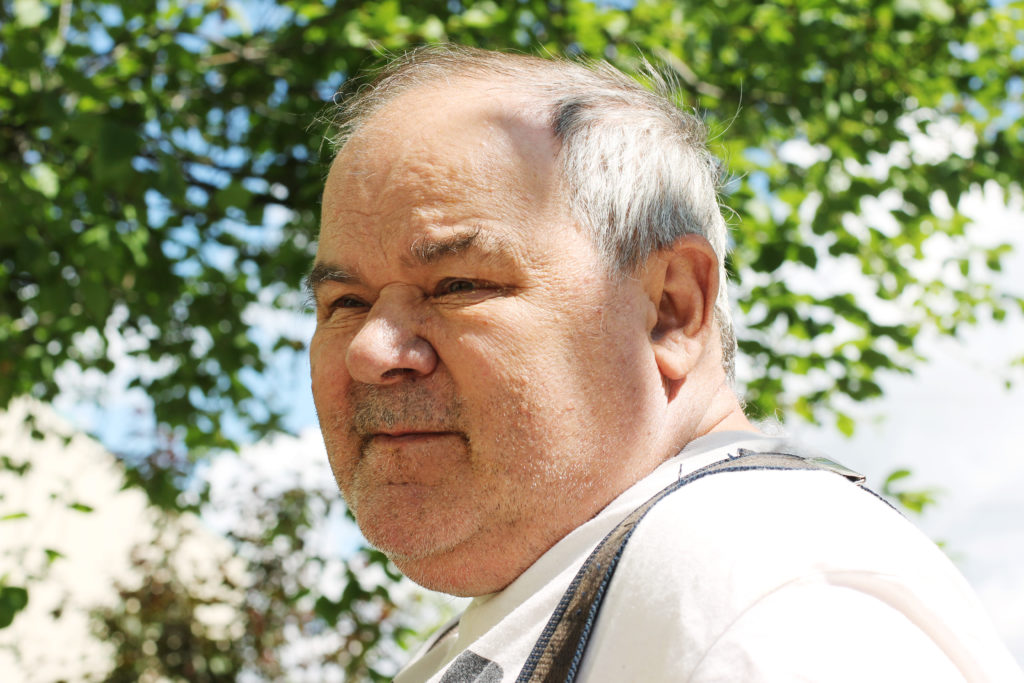
L: How does gardening help you?
D: Well, I used to live on a farm near Cochrane and I loved gardening. I would help my mom every summer. A lot of work but it’s worth it in the end. You have fresh vegetables that you’ve actually grown with your own two hands.
L: Brings you a sense of pride and accomplishment. Any other feelings?
D: Helps out with everything. Helps everybody out. I started planting seeds this year with Preema in the middle of May. We got beans, carrots, lettuce, radishes, garlic, onions. The beans have come pretty high; they’ve had the most success so far. Our volunteer Gabby comes to help as well in the garden once a week or so. If I know she’s coming I usually sit outside waiting for her. We took a head of garlic and we broke it into its individual cloves and we planted each of the cloves.
L: And then each clove grows into a new head of garlic. How magical! Do you ever feel that plants are super magical?
D: Yeah I do. They’re magical. You watch them grow from seed to a plant and you know you’ve done what you’ve had to do to support it in that process. It’s amazing. You feel a sense of purpose by doing what you have to do.
L: So how long did you live at your family’s farm?
D: Until I was 28 years old then I decided to go into construction. But then when I got into construction, some people weren’t really interested in gardening much. And then I noticed that most kids these days also aren’t too interested in gardening and getting their hands dirty. Instead, they go to the store or the market to get their produce. But, if you’re ambitious enough, you will go out there and do it. You would do what you have to do to make your own food.
L: How long did you work as a construction worker?
D: Oh, the rest of my life until I retired at 65. I worked up in Peace River where I worked on tanks for gas stations. I always did the grunt work. I also went into pumping gas and driving a cab which I did for five years. Being a cab driver could be a bit scary at times. I worked out near Ponoka and at times it was actually really scary when you get a silly guy who’s very drunk who wants to hit you over the head with a baseball bat. It wouldn’t happen that often but over time I would get to know a lot of the people I drove so once they recognized me, they would settle down. I drove a lot of people in town. That was a good part about it: making those connections.
One time, I had a guy pass out on me and I didn’t know where he lived so I brought him back to the office and told them to expect a customer. My boss was telling me I couldn’t do that but I wasn’t gonna leave him out in the cold! There wasn’t a hospital or clinic I could’ve dropped him off at either. Some of them were pretty grateful too. I always made sure that every one of my customers that got out of my car would get into their door before I pulled away. I see the door open, the light go on? They’re in. They’re warm, they’re safe.
L: That’s very noble of you. What was one of the most memorable clients you had as a cab driver?
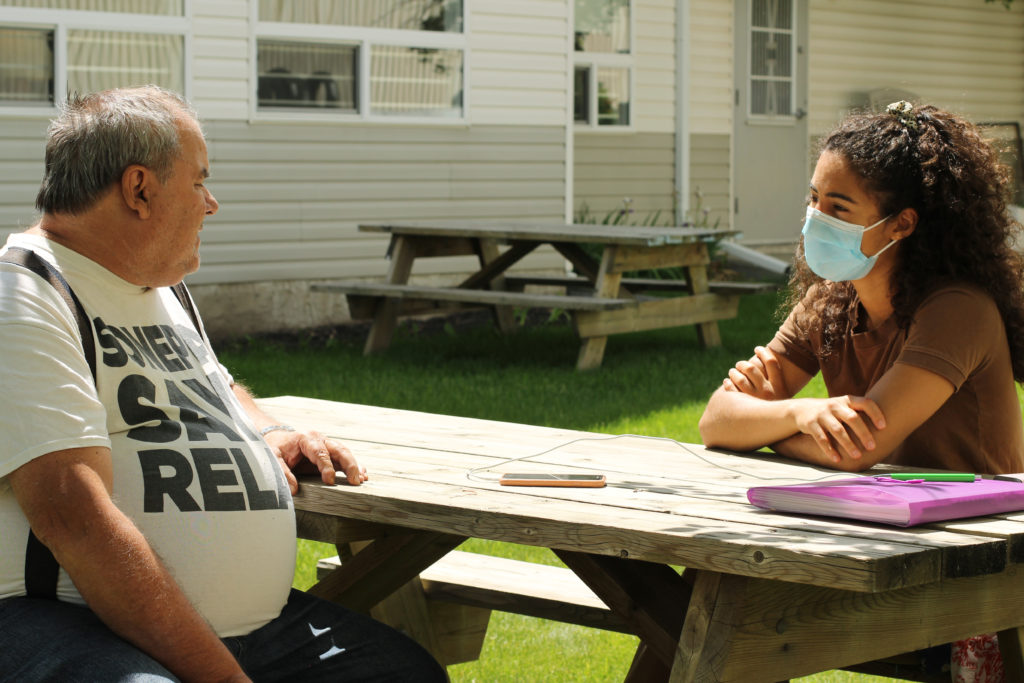
D: A little girl that was in grade one. She wouldn’t ride with anyone but me! She sort of liked me because she would get to sit in the front seat and we would talk about what she would do when she got older. She would talk about what she wanted to do and how she wanted to do it and I would tell her that you could plan a lot of stuff but when you get older, it all seems to go to caputs on ya! Other than that, a few kids I didn’t mind driving.
L: Interesting that this town must have used their cabs a lot since they had school aged children take the cabs as well.
D: Yeah! Well the kids didn’t wanna walk to school so they took the cab. But I feel that I kept a lot of people happy.
L: It sure sounds like you did. What was one of the happiest moments of your life?
D: My mom and dad. They lived and worked on a farm all their lives and they had a tough life but they still raised me. They valued me. Once a month we would always go to town and go to Calgary and my favorite place was the zoo because of all the animals. I guess I liked the animals because on the farm I loved being with the cows and chasing them around. Anyways, it was fun. Other than working as a cab driver I also pumped gas. We had this guy who would bike in the middle of winter. He would put his snowsuit on and away he’d go in below 40 degree weather.
L: I’ve seen people who bike in the winter here in Edmonton too but they usually have a lot of gear and their bikes have the wide, fat tires to help them tread through the snow. I don’t think this guy of yours had that hey?
D: No, he just had a regular bike.
L: What’s your day-to-day like here, David?
D: Get up in the morning, have breakfast, if it’s warm enough come outside at noon and sit outside for a while, then I come back inside and have a little nap. Then, watch some TV to give me something to do.
L: Do you feel like you still have things you want to achieve before you pass away?
D: I think I’ve done it all. I got my grade 10 schooling and although I am not very mobile anymore I still get out in my wheelchair to do the gardening. I try to. I still get out in the garden with my wheelchair. When it gets cold the old hips start to ache so I need my wheelchair. Gardening helps quite a bit. You have your days… everybody has their days.
L: What’s some advice that you could give based on what you’ve experienced in your life?
D: Well my advice to any one who is young is to go to school and get a good education. Don’t quit school when you’re in grade 10. Go and get your grade 12 and then you’ve got it and then go for college or university. Sometimes I wish I could go back to school again.
L: If you could, what would you have done differently?
D: I would have gotten my grade 12 and then gone to university to study Agriculture and try to get my Agricultural degree. I would be able to start gardens for different people. Start a company. I would like to teach people how to garden.
L: What would you call your business?
D: I would call it Dave’s Gardening Service. I would like to get more people out into gardening.
L: You’d be a proponent of urban gardening.
D: Yes, exactly. Because if you go out in the city here and you look in the back alleys, you don’t see very many gardens. It would only cost about $200-300 for the lumber and another $200 for dirt and there you have it you got a garden. Then kids wouldn’t be sitting around just playing video games in front of their screens. There is just too much technology. When I was growing up we never had a computer. We just had the weather. We would spend our time outdoors. Go outside and play in the yard or go help mother in the garden.
L: How do you think spending time outdoors or gardening helps a child’s development?
D: It helps them quite a bit. They wouldn’t be so lazy because they would be out there working a bit more. It would help them learn that nothing comes out of a plastic bag. It would get them right down to basics. Another achievement would be if I bought about 100 acres of land not too far from the city. And it would be a place where people could come and plant their garden. They would get a 20 by 20 lot. And if you can’t drive out from the city then you could use our shuttle service.
L: That’s such a great idea! And this would all fit under Dave’s Gardening Service.
D: Yeah! It would be free. All you’d have to buy is a spade, a hoe, a rake, and your seeds! We would collect rainwater somewhere in the middle of the water. Have a little pond so when you want water you just go to the middle of the garden and grab a hose.
L: It always brings me joy when I see a community garden because it brings people together. That’s another amazing thing about gardening. It creates community and promotes bringing us together in person, in our real world. Technology is very useful and it helps us to connect virtually but it’s not the same at all. If anything, it can be very isolating as we’ve seen. I guess my last question to you is: what is the importance of community to you?
D: You get to know each other and you can watch out for each other. You have people to contact if you need help and you know that you’ll be there if they need help. That will help everyone out.
To read more stories, visit: Hello Lumen Series

This interview conducted by Yesmine Elloumi and Jersey Manabat of The Lumen Series in partnership with Operation Friendship Senior’s Society.
Carol
C: January the 4th, there was an ad on Facebook for a couch. A pull-out couch, like a sofa bed. And it was $27 and something, and I’m thinking “yeah right”, but I bought it. It came to $49.19. I kept wondering when it was going to come now it’s coming from China. I finally got the number that you call to figure out where it is. I got an email and I printed it out. They said it was going to be delivered on the 15th. I knew it would take time, but anyway I got a package in the mailbox. It was teeth whitening strips, no couch. I’ve ordered a compacting garbage can. I got a little box, and it’s full of garbage bags. So now I know, I don’t bother with online shopping at all!
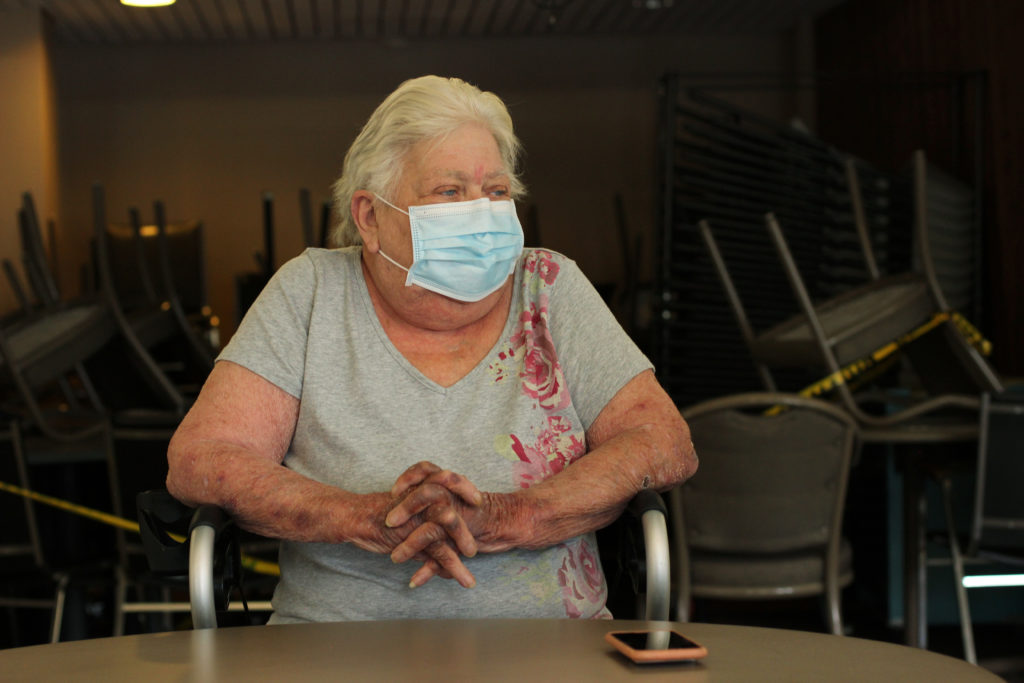
L: Oh my!
C: I’ll be ordering online this week for a bed. I’m getting it on Wayfair. I ordered a table last year. I got it, I wasn’t happy with it, because there were no chairs that came with it. My daughter-in-law got me another table and chairs set from the Marketplace for $75. So I sold the other table, but the bed I’m keeping.
L: The Wayfair bed came in, and it’s good?
C: No, it’s here yet. I have to order it. They call it a sleigh bed. It’s rounded like a sleigh on the headboard and footboard. I’ve been wanting one for so long, I’m tired of the bed frame. I don’t want them. I slide easily. It’s really nice. I’m really looking forward to getting it.
L: I bet you are. With online shopping it’s a bit exciting though eh?
C: It is. Well, I go out to go to doctor’s appointments, I have to go to the bank today. Other than that shopping I do online, they deliver it. I used to drive, but I had my license pulled December the 1st of last year.
L: And how did that feel?
C: Actually, pretty good. I was getting kind of scared. It’s not so much me. It’s the idiots around me. You know they cut you off, and they turn with no signal. Just stop in the middle of the road. I can’t do that anymore. The doctor’s the one who decided and it was because of vision and health. I wear compression stockings. I’m having a hard time getting in and out of a vehicle. I just got a cubie that I’m going to start using to strengthen my legs. So that I’m able to get in and out of a vehicle without falling.
L: Right, that’s good, that’s useful. Do you wear compression stockings because of peripheral vascular disease or anything like that?
C: I have what they call lymphedema. It’s bad today, because I had a bad day. I use these everyday. I put them in the morning and then take them off at night. So that’s helpful.
L: That’s good. Yeah, they’re pretty useful because you want to avoid getting ulcers from too much blood pulling there.
C: My legs were like this, so they had to wrap them. They did that for 8 weeks, 9 weeks. Then they measured me for the stockings. I got just a $35 pair, but they weren’t strong enough, so they had to go to the custom made. So that’s what I’m wearing now, the custom made.
L: Good, and they’ve been serving you well?
C: Yes, I feel comfortable with them. A lot of people don’t like them, but I feel comfortable with them. I moved in here, like I said, will be three years on the 8th of March. I was up on the 10th floor. Then I fell and broke my hip last year. The year before I ended up in the hospital with pneumonia. I was in bad shape. Last March I fell and broke my hip. My kids are my caregivers and my Powers of Attorney and they didn’t like me up on the 10th floor. The elevators and fires, I come down once all those stairs out the front here, and for three, four days I can hardly walk. Now with the walker, they put me on the main floor in September and it’s the greatest thing. I like the scenery out there.
L: With the 10th floor, it might be nice to have that view.
C: All you see are those high rises, and lights, and ambulances. I like it down here, because I get to see the squirrels and birds without them flying by my window. It’s nice, I watch the people walking by with dogs. I enjoy that.
L: Yeah, it’s enjoyable to watch people just living.
C: Well you can’t do anything else.
L: Right now especially.
C: Yeah. I stay pretty well to myself. I go to the common area to go get a pop. They shut the doors at 4 o’clock which is good. Too many people were congregating down here, and they didn’t have face masks, and they weren’t self-distancing, and I’m thinking you’re putting our building at risk. So I stay in my apartment, that way I’m safe.
L: You said you usually go to the doctor, this morning you went to the bank. With your lymphedema is that related to a heart condition or is that related to something else?
C: I do have a slight heart condition. Apparently, I had problems in the hospital until December 18th, I had that happen here. I got light-headed and dizzy, and my heart rate just went crazy, and the nurse took my blood pressure and it was sky-high so then they called the ambulance. The first set that came they couldn’t give medication so they had to wait for the second group to come. Four ambulance drivers, plus a supervisor, they had to give me medication and take me to the hospital. Hopefully, which it did, they got it down to which they were able to take me home that night. Apparently, I have to have something up into the groin area, and it’s like an extension cord in the bottom of the heart that they have to clip then I won’t go through this problem. When will this take place I don’t know. Other than that I can say I’m quite content, and I have a nice little apartment. I made friends in the building. I enjoy it here.
L: I’m happy to hear that. Do you mind if I ask questions about your childhood, and get more of a chronological story. It’s very broad, and if you feel uncomfortable at any time, you’re the boss, we can stop.
C: I didn’t have a perfect childhood. My mother worked all the time, and she worked night shifts. At that time my mom and dad got separated and divorced. She lived with a guy. We called him dad, but I didn’t want to because I knew he wasn’t. That was rough with him around. We got older then they separated. I have pretty well been on my own since I was 15. I’ve done alright. I’ve had five kids, I lost one. I have four of my own and 14 step-children so there’s 9 boys and 9 girls, and I have something dozen grandkids, and great grandchildren. I have a few that live here now.
L: Really? Oh cool, so you have family that lives here.
C: I have my son, and my daughter-in-law. I have my daughter and her husband, and they have two boys. Mateo just turned three, and Emilio will be six months old on the 23rd. I went to Ontario last year and met my great-granddaughter for the first time. She was not quite two when I met her.
L: So you have great-grandchildren, and then your children, your son. Is it your daughter and your son-in-law?
C: So I have two girls, two boys but the youngest boy lives here.
L: How old is your youngest?
C: Fifty-two. He’s working right now in Yellowknife. On the ice roads.
L: Oh wow, that’s wild.
C: Yeah. That’s scary. He sent a video on his phone of the ice roads and you could hear the ice cracking as he’s driving. I go “Nope”.
L: Not your cup of tea eh?
C: No it isn’t, and I’ve been a car jockey too for the longest time I drove all over the place.
L: What’s a car jockey?
C: I worked for a car company, and we picked up cars. I lived in London, Ontario. I moved out here 32 years ago on the 4th of November. I used to drive from London to Toronto to pickup vehicles, Fort Erie, Kincardine, Detroit. These are cars the companies have bought. There were 15-20 of us, all following-the-leader sort of thing. Coming up the other side of Toronto, it was bad because you got six lanes of traffic that you have to come through. There’s only one turn off that goes to London, so you can’t miss it. It was fun.
L: Sounds like it’s fun.
C: I think that’s why now driving isn’t as exciting for me anymore. I’ve seen too much out there. Silly people, icy roads and they think it’s summertime.
L: That can definitely stress you out for sure.
C: I just decided not to drive anymore. The doctor has stated too though, and I said “yeah, I agree”.
L: It’s good that you were on the same page. It’s always challenging when people don’t agree with that decision, then they can’t do much about it.
C: Well I did it. The doctor said that “We don’t want to take the chance”, and I said “I don’t want to hurt anybody and I don’t want to get hurt.”
L: So we talked a little bit about your childhood, you said you were essentially kind of on your own since you were 15. What did that lead to? Where did you go from there? You did talk about your kids, but maybe like more about your story before you had children.
C: I was 15 when I first had a child. He was put up for adoption, 20 years later though I found him.
L: How was that experience?
C: Oh, fantastic!
L: Really? Tell me about it.
C: When he was adopted, if the adopted parents have said “no” they didn’t want to meet the biological parent then there was no way. But they were okay with it, the same as me. The government intervenes and gets you together. I had to go to the Children’s Aid and there were women in this room and I’m sitting there and he walked in. As soon as I saw him, I said “you look identical to your father”. I took him back to the house so that my own kids could meet him. They were really excited to meet him. When my mother met him, my brother and he stood together, and you swear up and down they were brothers. The resemblance was just unbelievable.
L: Wow! Did you make the decision to put him up for adoption?
C: No, my mother did, because I was under the age of 18. That was her decision, and my mom and I didn’t get along for a long time after that. It soon reversed back. She was my mom and I did everything I could for her. She moved out here in 1993, and she passed away in 2011. I was her caregiver. I looked after her. I took her wherever she had to go and whatever she needed. It was hard, but I did it.
L: After saying that what was something you learned from that experience?
C: Regardless of what the situation is, if it’s your parent, they looked after you all those years. You should in turn do the same for them, and that’s exactly what I did. She’s my mom, you know. My dad I never really knew that well. The last time I’ve seen him was in 1968, and then when I left Ontario I went up to Vancouver, because that’s where he was living. I wanted to meet him. I got off the bus, and I reached to grab my luggage. He was standing behind me saying “there’s my baby girl”. The voice I knew, and I turned around and it wasn’t my dad. It was him, but the dad I knew was 6.4 feet, very slender, with lots of hair. The one that stood behind me was huge, no hair. I knew he was my dad, but he definitely had a big change.
L: What was that experience like meeting your dad?
C: It was really great. It didn’t take long to reconnect. I can remember my dad years ago. He was in the service. He’d come in, and be home for a few days. I can remember him, in the bathroom, taking his razor, undoing it, taking the blade, putting it in the glass, and sharpening it. That’s what they did. I can remember I struck a match, a wooden match, and the match went off. He came in and gave me a tap in the back side. That’s the only time my dad ever laid a hand on me. I’ve never forgotten it, and I thank him so much because I could have burned the house down. I didn’t really know what the matches were. I just saw it, so when it went off he did what he had to do. I can remember Easter, and going around looking for Easter eggs. We had a radio. I remember moving it, and finding Easter eggs behind it.
L: Was it your dad who hid the eggs?
C: It was my mom and dad, but then they separated like I said. I don’t remember too much after, I’ve never seen him until 1968. I’d already had three kids by then. He had a heart attack at Woodstock, and the police got a hold of me. They told me about it, and I said when he gets out of the hospital tell him to come and see me. I gave him the address and I had my dad stay with me for a couple weeks. He knew he had a grandson and two granddaughter’s, but he didn’t know about the other two until much later. That was when mom’s second husband passed away, July of 1989. Her birthday was on the 2nd, and he passed away on the 3rd. I moved in with my mom to help her out. That was not a good plan.
L: Was it? What was challenging about it?
C: Well I was going to school, I was taking a business course during the day, and then I worked in the evenings from 5 until 9.
L: Was that when you were working as a car jockey?
C: No, this was before that. I worked at the Factory Carpet Outlet at the main desk. When the salesman had sales, I’d add them all up and send it all to Toronto. Make phone calls and stuff like that.
L: And at that time, how many children did you have?
C: I still had all the kids but by that time they were old enough to take care of themselves. The youngest was like 18 or 19 and he would make me mad. I’d come home from school, shower, change, and head off to work. And as I’d head out the door he’d ask, “Moooommmm… can you make me a coffee?” This guy would still be in bed. (laughs).
My first marriage was a bad marriage. Really bad. I first got married in 1969 and I was 20 years old, I think. It’s been too long… I’ll be 73 in May. Ages are just a number though. My son and daughter in law are the greatest because they pick me up and take me to see my grandparents and have a big meal for me and birthday cake and all that. I tell them not to do that… it’s just a birthday, it’s just a number.
L: What was one of the happiest moments of your life?
C: With my kids, my grandkids, and my great grandchildren. Mateo is priceless. He calls me GG because I’m great grandma and he can say that but he likes GG. He turned three years old last weekend and he says, “GG play?” and I ask, “What do you wanna play?” and he would say, “Tickle me!” and so he’d lay on the couch and I would just tickle him and he would just love that! And then I gave him money for his birthday and he bought himself a Hulk figure and he brought it in front of me and said, “Grrrrr!!!!!” (laughs). “That’s what I got for my birthday, GG.” Then he got a Spiderman bike with lights, a car that he can drive. The grandparents spoil him and the great grandparents, so. I saw something the other day that I’m going to get him. It’s a car that you can put on the wall and it races around on the wall. I’ve seen it advertised last year and I wanted to get it for Christmas but they were out of stock. You just put the car on the wall and it drives all over the wall and it doesn’t leave any marks! But other than that, like I said I moved my oldest daughter down here to Edmonton in 2017. She stayed for a year then decided to go back to Toronto because she didn’t like it here. So I just put everything in storage and stayed with son and daughter in law until I moved into Pioneer Place. I love it here and it’s not far from my son’s either. I just take the number 3 or 5 bus and I’m there.
L: What made you move from Ontario to Alberta?
C: My late husband passed away in ‘84 and the kids were having kids of their own and I was still working and they would want me to babysit and they wouldn’t come home until 2AM and I just said I can’t do this. They would go out partying… they didn’t want the responsibility of kids. So I said, nope. It’s time. My grandkids were two years old when I left. They haven’t been bothered by it, I still talk to them and they’re happy. So I came to Alberta with my brother. He was visiting my dad in Vancouver at the time and he had a car so he drove me.
L: What were some lessons you learned from your life?
C: If I had a do over, I would do it again but sort of do it differently. The first husband: I wouldn’t have married (laughs). The second husband, yes. My mom said I had to get married again after my late husband but I don’t want that. I don’t have boyfriends and I don’t want any. I like the way I am. I’m my own boss and I control my remote without anybody else there. Hey, do you mind if I drink this Sprite?
L: Of course not, go ahead.
C: I like Sprite but I can’t drink dark pops because of my illness. I have diverticulosis and colitis. I’ve had it since 2018. The first couple of years were so difficult because there were so many things I couldn’t eat. But as the years had progressed, I learned that I could have all of that stuff but within moderation. Like nuts, corn, cabbage, cauliflower, broccoli.
L: That makes sense. Going back to the advice question: what advice would you give to people who may be reading your story?
C: Do what you feel is right within you. If you feel it’s wrong- don’t do it! I became a Legion member years ago because of my late husband. He fought in the war and he was 32 years older than me. I was 30 and he was 62 and we were married seven years. When I got out to Alberta, I got involved with the Legion. I became a member, and it’s all women. I wear a uniform and am proud of it. Right now we can’t do much because of the pandemic but it’s an honour to be able to talk to some of the people who were in the war. Sometimes I wear the uniform in the mall and people come up to me and thank me for my service and say, “I was never in the service. I do it because of my late husband, he was in the service.” and they say, “You wear the uniform proudly and we’re proud of that.”
L: That’s great to hear that you found a community here in Edmonton that you can meaningfully connect with and that brings you closer to your late husband too. Is there anything else that you would like to talk about as we end our conversation?
C: It was really nice meeting and speaking with you two. It’s nice to see the younger generation talking to some of the seniors because a lot of them don’t. I’m just hoping that we can get through this pandemic together. I’m so tired of having to stay in! I’m so used to getting out and getting around. I get out yes but it’s to doctor’s appointments, whatever.
L: What is one of the first things you would like to do once life goes back to “normal”?
C: Get the family together and be able to give them a proper hug without needing to wear a mask. Even with the grandkids when they come to give me a hug, I’m wary. Because I don’t want to make them sick! Mateo doesn’t like the mask. He says, “GG! Your face!” and I take the mask down for a moment and put it back on and say, “GG needs to wear this so you don’t get sick.” It’s hard to explain to a kid and I’m thinking about all these kids in school who don’t understand. Like I say, it’s all part of growing up. Some of the younger generations haven’t got a clue of what is going on and what is happening. I think they’re a lot brighter than we give them credit for.
To read more stories, visit: Hello Lumen Series

This interview conducted by Yesmine Elloumi and Jersey Manabat of The Lumen Series in partnership with Operation Friendship Senior’s Society.
Nicolette
L: Nice to meet you Nicolette. How are you?
N: I’m okay.
L: How’s your day been so far?
N: It’s been pretty good thanks.
L: What have you done so far today?
N: I went to my bank, and we went to one of the stores, and then we went to Walmart and Dollarama.
L: Did you get anything from the stores?
N: Yeah, I bought some birthday gifts for my birthday coming up in two months.
L: Oh wow, how old are you going to be in two months?
N: Sixty-two!
L: Is this [camera] distracting?
N: No, it’s okay. I’m used to it.
L: You’re used to the camera, the paparazzi?
N: I don’t mind.
L: What did you buy yourself for your birthday?
N: Two baby dolls, and I can’t remember what else. I like them alot. I like them because they look like we are… like real babies.
L: They look really cute? Do you want to show me?
N: (Shows photos of her dolls on the phone)
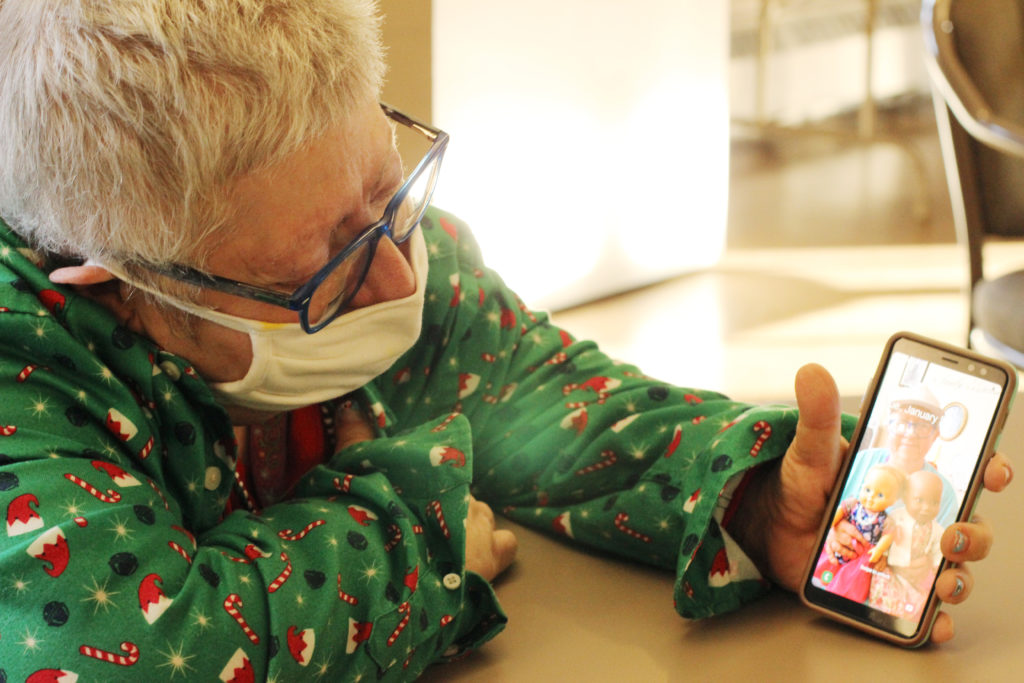
L: Oh! Do you have names for those dolls?
N: Yea! That’s Precious, and that [one] is Happy. She does look happy. She’s named after my outreach worker. Happy is really sneaky.
L: Your outreach worker or the doll?
N: The doll! She’s pretty sneaky. She likes to hide things. She likes to… you know just before Christmas comes, she likes to buy presents, she likes to depart. Write a lot to Santa.
L: Wow. What did she ask for Christmas? Do you remember what Precious asked for Christmas?
N: I can’t remember. I buy gifts for them. I got them some little dresses.
L: Is there a store you like to go to?
N: Walmart.
L: So how many dolls do you have?
N: Oh! Lots. Probably about forty. I started to collect dolls Before I had to move in here at Pioneer Place.
L: Okay, so how long have you been here?
N: Coming up this July, I think three years. I even was collecting dolls where I used to live, at my old apartment. But I didn’t like it there, so that’s why I moved here. I used to live at the Santa Rosa Apartments.
L: Why didn’t you enjoy living there?
N: Because either people were not nice, or being mean to me. The supervisor was not good, the maintenance guy was not good. He didn’t want to fix nothing.
L: That’s so unfortunate. How about your experience here at Pioneer Place?
N: Here it’s nice. I like it. Here they have… you know the staff here at the office. There’s home care.
L: Do you mind if I ask you, what does home care help you with?
N: I had surgery about 2 years ago. It’s called a colostomy surgery. I have to wear a bag. I couldn’t go to the bathroom. They said if I didn’t have the surgery, I could have died in 2 days.
L: Good thing you had the surgery. One question I have for you, Nicolette, is what was the happiest moment of your life?
N: What do you mean?
L: What was that time in your life that you remember very well, because it made you very happy?
N: I don’t know.
L: Okay. How about we start from the beginning. Can you tell me about your childhood?
N: What?
L: Your childhood when you were a kid, when you are young. What was that like?
N: I was okay. My parents are not alive anymore.
L: What was your childhood like? Can you tell me about it?
N: I know my parents used to like me. My real parents. Now they’re both gone.
L: I’m so sorry about that. You said your real parents?
N: Yeah, they’re both gone. They’re both in heaven.
L: Do you have other parents?
N: [Shakes her head]
L: Do you have any siblings? Do you have any brothers or sisters?
N: Just half brother and sister. But they don’t care for me.
L: Why not?
N: Because they’re from a different mother. And my mother, my stepmother, she doesn’t care for me either.
L: Is she alive?
N: [Nods her head]
L: So, what did you do when you were younger? Did you go to school?
N: I can’t remember.
L: You said that Happy is your outreach worker?
N: Yea.
L: Can you tell me what your outreach worker does for you?
N: She comes here. She helps me do some cooking or baking, or we go to the bank appointments. She’s been with me for I think almost four years.
L: That’s good. What do you like to do for fun?
N: I like to go shopping, or watch TV. Play with my kids.
L: Who are your kids? Precious and Happy?
N: [Nods her head]
L: Okay, do you have any other favourites?
N: Lots of them, they are my favourite. The most, I think it’s her and her (pointing at Happy and Precious).
L: Before you used to collect dolls, did you have something else that you used to collect?
N: [Shakes her head]
L: No? Okay. What made you start to collect dolls?
N: Because they look just like real kids. I know they’re not real. The way they make them nowadays, they make them so realistic.
L: They look like us.
N: They look like real babies. I like babies but I couldn’t have any. Because I had breast cancer.
L: You had breast cancer? How old were you?
N: I think I was probably about thirteen or fourteen when I had breast cancer.
L: Really, that young? Oh no, that’s very young. Oh, I’m so sorry to hear.
N: That’s okay.
L: Did you have any other cancer in your life?
N: [Shakes her head]
L: Just the breast cancer at thirteen and fourteen? Then you have the colostomy bag as well now. Were there any other health conditions that you had?
N: No, but that’s why I have home care.
L: So, you have breast cancer at thirteen and fourteen, and then did you go to school?
N: [Shakes her head]
L: Do you remember why not?
N: Because my dad didn’t want me to go to school.
L: So what did you do instead?
N: Just stay home with my dad and my real mom. My mother was sick all the time. She was diabetic.
L: I see. When did your parents pass away?
N: First it was my mother that passed away, then in a few years my dad passed away from a heart attack.
L: I’m so sorry about that. Was it recent or was it a long time ago?
N: That was a long time ago.
L: So who are your closest friends and family?
N: Right now, I only have one friend that lives in Canmore, and one that lives in the West-end.
L: You got to talk to them on the phone?
N: Yea. It’s always nice to talk to them.
L: Okay Nicolette, so I asked about the happiest moment of your life and you talked about your dolls. What was one of the saddest moments of your life?
N: Well when Christmas comes.
L: When Christmas comes?
N: Or Easter, or Mother’s Day, Father’s Day, my dad’s birthday, my mother’s birthday.
L: Is it because you miss your parents a lot at those times?
N: I miss them.
L: What was something that your father taught you?
N: [Shakes her head]
L: You don’t understand? Your dad, what was his name?
N: Tony
L: Did Tony teach you something very important?
N: I know he’s taught me how to, you know, how to bake, how to do dishes, how to clean.
L: How about your mom, what did your mom teach you?
N: My mother, she didn’t do too much because she was in the hospital. Because she was diabetic. She needed to be in the hospital, because she couldn’t take care of herself anymore.
L: That makes sense. Okay so you like to go shopping, you like to watch TV, like to play with your kids. Is there anything that you have learned, that you can give us for advice?
N: [Shakes her head]
L: Is there anything you want to tell us?
N: [Shakes her head]
L: I’m curious who gave you those rings?
N: I bought them.
L: Do you collect them?
N: [Nods her head] I bought them and I collected them.
L: I like your shirt too.
N: Thank you!
L: Thank you so much too Nicolette. I hope you have a nice day.
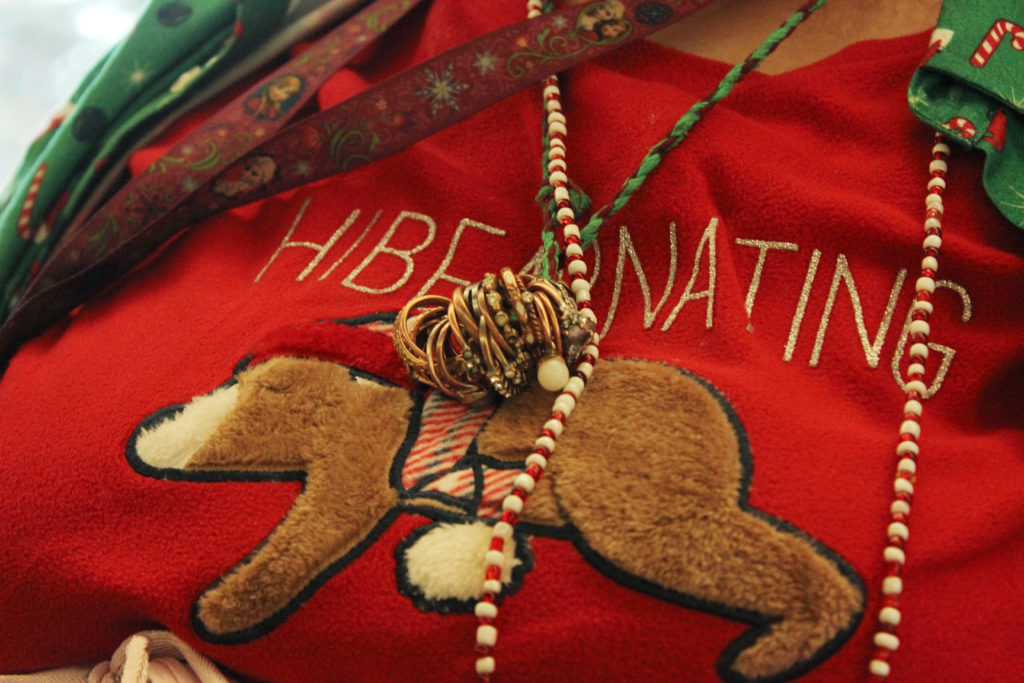
To read more stories, visit: Hello Lumen Series

Teresa
This interview conducted by Yesmine Elloumi and Jersey Manabat of The Lumen Series in partnership with Operation Friendship Senior’s Society.
L: Thank you for joining us today, and I hope you’ve been having a good day so far
T: So far, yeah. I’m having a pretty good day today.
L: I love to hear that. Awesome, so what we do is we like to meet the different seniors here at Pioneer Place, and kind of get to learn their life story. Because we know that you all come from very different experiences and backgrounds we’ve collected some amazing stories so far so I’m really excited to talk to you today. I always like to start with asking people I meet what was the best moment in your life?
T: What was the best moment in my life? Having my children. Helping them be good, kind, adult children. Now I have my grandchildren. I have five grandchildren, four children and five grandchildren.
L: That’s amazing. Wow! Have you been able to see your grandchildren and anyway you recently liked online
T: Ah… not right now. I have a little bit of quarrel going on. My daughter’s don’t want me to see them yet.
L: I’m so sorry to hear that.
T: It’s okay, I’m getting into contact with some again.
L: That’s good to hear. So you said you have four children?
T: Four children, and five grandchildren. So I have four daughters.
L: How’s that experience of having four females?
T: The female part of it was pretty good. They were pretty good girls. They don’t do anything that I wouldn’t do anything I wouldn’t do. You know, like drugs. They don’t do alcohol. They don’t do any illegal things.
L: What was maybe something that your daughters taught you?
T: Patience, you have to have patience especially when they’re young. My four daughters have all had special needs, so it was quite an experience for me. I managed it, and they turned out good.
L: Do you mind talking about what their special needs were?
T: My oldest one was born premature by three months, and she has cerebral palsy. She will be 41 years old this year. She walks, she talks, she does everything like any person would, except her leg problems with cerebral palsy. Which so far she refuses to use her wheelchair. She just has braces. It was a lot of work when she was younger. A lot of work.
L: Did you have a support system or a partner to help you when you were raising her?
T: Not really. I had a partner, but he was not really interested in the children. It was a bad marriage. I pretty much did everything myself. I divorced him when the oldest was 10 years old, and raised pretty much all of them on my own.
L: When the oldest was 10, the other three were born as well from the same partner?
T: Yes, they were all from the same partner.
L: So how old was the youngest when you separated with their father?
T: About 6, 7?
L: 6, 7 years old? So they’re close in age. So oldest was 10, and you had twins?
T: No, then I had one girl and then I had my twins.
L: Wow! Very close, which I think can be the best case scenario when you grow up really close with your siblings. You can grow together at the same time, and you learn from each other. You’re all kind of interested in the same stuff. At the same time there can be a lot of problems. Because you can get jealous of each other.
T: I’m afraid that showed up.
L: I have three younger brothers and they’re really close in age. It’s really really funny sometimes, but also quite exhausting.
T: It can be exhausting, but I handled it. Time went by really fast. I still think of them as 17, 18 years olds. Not 30s and 40s. It’s okay, time goes by.
L: It kind of humbles you, to think about what’s important.
T: It does, it really does humble you. They had their special needs. Other than that, they were really helpful children.
L: So your first daughter was premature and had cerebral palsy? And then your second daughter?
T: She had a learning disability, personality disorder, and epilepsy. I’m still in contact with her quite frequently. My twins had a problem when they were born. They would not speak english. They would speak to each other in their own little language. They would know what they were talking about, but nobody else can understand them.
L: Really?!
T: Really!
L: For how long? Until what age did they have that?
T: About four, four and a half.
L: That’s like kindergarten by then eh?
T: Yeah, they were close to each other. They still are very close to each other.
L: So how did you manage helping them learn how to communicate with others?
T: We got them into speech therapy at the age three, and then we put them in a special kindergarten for children with speech disability. That was very helpful. We also started separating them more. So that they would interact with other children. It was very difficult, because all they wanted was to be together.
L: Do you mind telling us more about what they’re like today?
T: My oldest one is very independent, but we discovered that she could not really have a job. She tried, but she had a little bit of a disability with reading and writing. She was a slow learner. Because of her walking, she did try to work in a daycare, she loves children. That didn’t work out because she kept falling. We were afraid that she was going to fall on the children, or she was afraid that she’s going to fall herself. Other than that she does some volunteer work here and there. I don’t know what she’s doing right now. She lives alone now and gets help in the home. Some home care with housekeeping, something like that.
L: How about the next daughter?
T: My next daughter has epilepsy, personality disorder, she’s kind of a bipolar. When she gets angry, she gets really angry. She takes it out on people. When she’s happy she gets super happy and silly.
L: It’s just those two extremes, it can be exhausting because you feel so strongly. The con is that you can be out of control, it can be so exhausting. You can’t feel like you can be in charge of what’s going on. I’m speaking from the experience of a friend who also has bipolar personality disorder. She said that was definitely the con, she’s very optimistic, and she wants to manage her disease. The good is that you truly feel everything. You feel like you’re alive. Because you really do feel happy when you’re happy and you see the colours in the trees and the sky. You feel like you’re in the present. The lows are low, so it’s important to have those supports in place.
T: She does. She has me and she does have home support coming in to help her. She also lives on her one, and all my daughters are all in the city here.
L: What do your two younger daughters do?
T: My one younger daughter is a stay-at-home mom. She’s got four children. Sometimes she’s trying to look for work. I’m not sure if she’s working now, because I haven’t talked to her in quite a while. The other twin has a child as well. Last time I heard she was working as a supervisor at an A&W.
L: Why do you think you haven’t spoken with them for a while?
T: For one I haven’t got their phone numbers. Firstly, their numbers changed. Number two: they don’t seem to want to talk to me and work things out between us. It’s more of a “you pay more attention to this one than you do to us.” And that’s not the truth. I treat all of them equally, and my grandkids equally as well. I really miss them. Although I don’t have their phone numbers, I have found out they phoned my twin sister and they gave her their numbers.
L: Oh so have a twin?
T: Yes I do. She is also here in Edmonton.
L: Is she here in Pioneer Place?
T: No, this is a low income place that is very well kept and I really like it here. She makes too much money to come into the low income bracket. So, she lives in an apartment right now. Yeah. My life has been fairly good. I cannot complain.
L: Not to minimize your role as a mother at all, but other than being a mother for your four daughters, and other than being a grandmother for your grandchildren, and a sister, what are some other experiences in your life that are memorable to you?
T: School friends, friends, mean a lot to me. I don’t know really. I had a bad spell when I was going through my divorce. I was about… 35.
L: What was your family upbringing, your childhood like?
T: My childhood was very busy. I was… of course it was my twin sister and I. We were adopted right from the hospital and then my mother had five more children so there were seven of us in the family. Big family. She didn’t adopt the others. She had them normally. We were treated just like the others were. It was really good.
L: Do you know why your biological mom may have wanted you to go to a foster family?
T: From what I gather she was single. My biological father is married to somebody else. She was single, and in those days you normally didn’t keep your children.They gave them up for adoption if you were single. That’s what she did. Since there were two of us, you know it would be too much for her to cope with. So she gave us up for adoption. I haven’t heard anything.
L: Have you met your biological mother?
T: No. The desire to meet here was on and off. I had a fairly good life. Gene and Ronald took really good care of me.
L: Actually, I haven’t spoken yet to someone who told me that they were adopted in these stories that I’ve collected. I’m always so happy to speak to different individuals because that’s how you get to know about things.
T: Unfortunately, I didn’t work too much because of all the appointments for my children. Working for me was out of the question.
L: Yeah, not only do you have four children. You had to ensure that they got to the appointments they had. I can’t empathize fully, but I understand. One of my three brothers was quote-on-quote a sick kid. He was in the hospital, in-and-out in-and-out, for eight years. You can’t really plan a day sometimes.
T: You have to go by what’s happening at that time.
L: Was there a moment when you were taking care of your children that was very important for you? Did it help you realize something?
T: I think so, I think I learned from the experiences that I had with them. I had to practice respect, kindness, and understanding. Things like that. There are people here in Pioneer Place with disabilities. I do have a disability right now, but there other people that are worse than I am. You learn to look beyond their disability.
L: What do you think are some things that most people don’t realize or understand about people with disabilities?
T: From what I see, a lot of people do not understand when a person has these disabilities that it is not always their fault. They can’t help it, that’s just the way they are. People should be accepting of that. Here at Pioneer Place we do that. We try to do it. We live with respect for each other.
L: So I guess speaking about living here, how long have you been here?
T: About seven years now.
L: Okay, and your experience you said has been delightful?
T: Yes, very good. I’ve had a couple of ups and down but not with the building here. It’s been with myself. Because I do suffer from depression. Sometimes that is really hard. People here have boosted me up when I’ve been down. That really helps me. It keeps me out of the hospital, let’s put it that way.
L: That’s really good to hear. That’s wonderful to hear. I’m also so sorry to hear about how depression has affected your life.
T: Well it’s affected it, but I don’t let it get to me. It’s been with me throughout my life. The first time I felt that way was when I was a teenager. I didn’t know why but I knew that I wasn’t happy with things, I don’t know why. I just wasn’t happy at that time. Now, I’m fine.
L: Do you have new strategies kind of help you when you feel this way?
T: I do take medication for it. And I stay on the medication. I don’t just take it here and there. I take it when I’m told to take it. That is one good thing that has helped me. Talking about some of my problems with a specialist who has really opened my eyes to see that earlier on in my life I was thinking wrong. That I was using my feelings as a guide. I should be using my senses instead. Now that this event has happened, what am I going to do? Instead I used to be stuck in the fact that an event happened and I would feel really down.
L: Yeah, because your emotions are your response to the situation. So they’re completely valid, and they need to be expressed.
T: And with that you need help. My doctor helped me get in touch with a specialist.
L: Do you feel like you get the kind of healthcare you need?
T: Yes. A little slow, especially with the COVID. I had a telephone meeting with my doctor and I don’t like it. I don’t like it. Because they’re not really seeing you. They can only tell what you tell them. There may be some other underlying reasons that do not get addressed because of the lack of physical contact.
L: Do you have any advice for future doctors?
T: That’s good. Patients like to see that doctors are listening to them, and not just putting your pains and stuff aside. Maybe instead of putting them aside, find out why or how they can help. Because there are some doctors that do push the pains and aches aside. Yeah, that’s all I have to say. Listen to your patients because they know what they are talking about.
L: For sure. Was there a physician or a healthcare worker in general when you were taking care of your kids that you were grateful for?
T: Oh yes, I had a lot of help from my family doctor getting things and getting help for the children. My primary support team was my family doctor in Glenrose Hospital, social workers, psychologist, therapist, speech therapist, occupational therapist. It’s a whole team, and they all worked together. I can’t say that anyone of them really stands out among the others. They were all really great.
L: I started with the best moment of your life. On the other spectrum, we kind of touched on it already so you don’t need to feel like you need to answer, but what are some of the most challenging moments of your life?
T: The divorce was a very tough time. He was making it very difficult. Every time I listened to him and tried to work things out with him, he would refuse to do anything I proposed. In other words he refused to pay child support. At one point, during the divorce, he wanted full time support of the children with me looking after them. It took a long time in the courts for it to be figured out that that’s what he was doing.
L: That’s really exhausting. Is he still in contact with your daughters?
T: No. And, yeah, I’m fine with it. I would rather see him away from my children, and not mixing them up all over the place. I’m sure he talks about me too. I can’t control that, and I’m not doing anything about it. I’m living my life now for the moment, and I’m enjoying it.
L: What are some of the things you do today that bring you joy?
T: Quite a few things. I do an awful lot of volunteer work at Canadian Mental Health Association. I was a care support worker. I have a lot of crafts that I do.
L: Okay, is your necklace one of them?
T: No. This was made by somebody else. I make homemade cards. I do some picture crafts, colouring, sewing, knitting, quilting, and embroidering. So I can keep myself busy. We actually had a sale thing here to raise funds for a trip, and it’ll be taking quite a while to do it. It’s time for me to go. I’m sorry.
L: Thank you for your time.
T: You’re welcome.
L: I hope you have a great meeting and the rest of your day.
T: Yes I will!
To read more stories, visit: Hello Lumen Series

Lynda
This interview conducted by Yesmine Elloumi and Jersey Manabat of The Lumen Series in partnership with Operation Friendship Senior’s Society.
L: Lynda
LS: Lumen Series
LS: What made you want to come and talk to us?
L: I want to tell some stories. I came here with my husband about 10 years ago. He was very sick, we moved to the city so he could be closer to specialists. I got here and I walked around for about two weeks and I couldn’t find anything interesting going on and one of the cooks at the time said, “Well why don’t you come and help us in the kitchen?” and I thought…, “Ok!”. And I worked with two very kind gentlemen at that time. One was a Chinese gentleman and I loved working with him because he taught me so many things! I didn’t know for most of my life that Chop Suey meant “everything that is leftover in the fridge”!!! I had no clue until I asked him one day and he said “Oh it’s whatever you have left in the fridge you throw it together and that’s it!”. But I learned many things from him about Chinese food and how to cook it. It was fun working in the kitchen! The minute you hear somebody say “Oh, I have to do volunteer work……”, tell them to change their job because if you’re not happy when you’re doing it- get away from it. I loved it, I loved the idea of cooking because it was so much fun to make these big meals for all the seniors here and we would have anywhere between 40-50 people at a time, we’d cook one night a week. It was a good thing because people didn’t have to worry about supper that night. It was a nice change and I think they paid $5 for a meal and it would have salad and roast beef and potatoes and vegetables and dessert. Hey, when it comes to cooking, old farm wives: we do it!
LS: Oh so you used to live on a farm?
L: Oh yes. I lived in Edson, Stettler, Camrose area. So you get used to that where all the neighbors come and help everybody take their crops off. Well, all the neighbors wives come and cook big meals to feed the guys that take the crops off!
LS: Wow yes! That is what it was like for my parents too! My parents come from Tunisia and my mom told me when she was growing up, that’s what it was like! Everyone in the neighborhood was known for something. They didn’t have farms but for example, one lady would be known as the lady who knew how to make really good baklava or sometimes people actually did grow a lot of say dill or couscous or chickpeas or whatever. So the day that they would need to harvest it all, the women would cook with the harvest and they would all eat together!
L: Yes, exactly! I came here in 2012 and my husband was very ill with Chronic Obstructive Pulmonary Disorder (COPD). And when you get that it just keeps getting progressively worse. He had to have 4 different doctors that he had to go and see for his breathing problems and of course he had asthma on top of that. It was hard for him for sure. It got so bad that if it was too cold in the winter he couldn’t handle it. If it was too hot in the summer, same. I mean in this weather he would just wilt. As his illness progressed, as a way of getting away from that for a little bit… I would go to the kitchen and help. I know it sounds vicious because you ought to be there but it really can be a bit too much sometimes as a caregiver.
LS: What was your husband’s name?
L: My husband’s name is Gary.
LS: You probably were Gary’s primary caretaker, then. If he lived with you while he was here, how was that experience for you?
L: That experience was probably the worst in my life. It was tough!! You lay down to go to sleep at night and you lay there with one eye open and one ear listening to hear any changes in the breathing machine or if he was coughing or choking. It is constant and you’re not sure where the next problem is coming from…
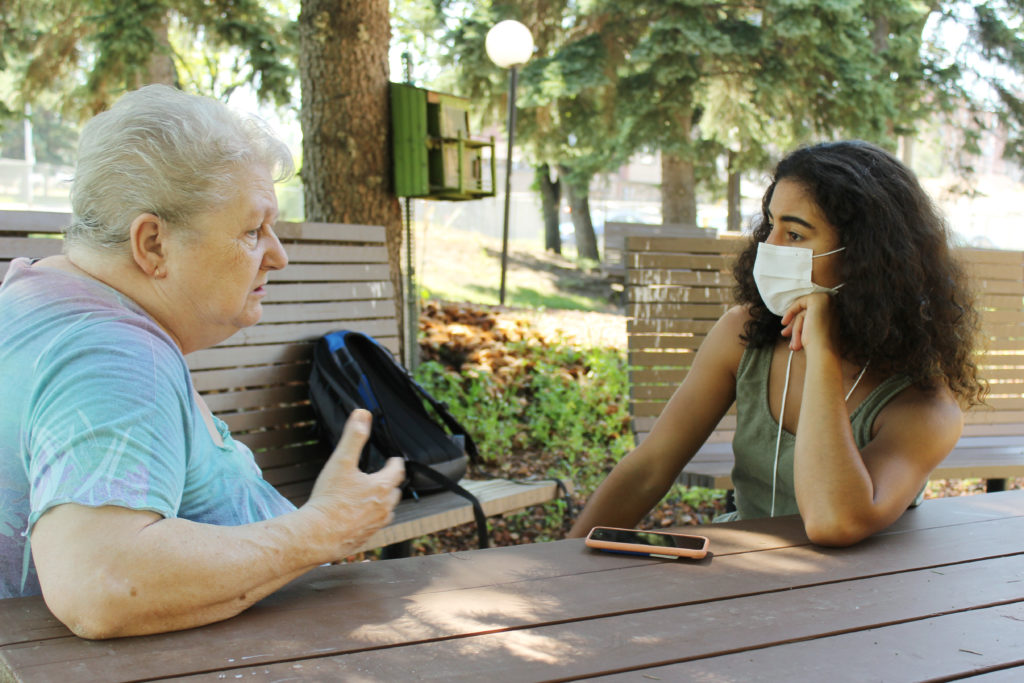
LS: Right, it sounds like you’re constantly stressed.
L: Oh! Terribly stressed! And of course, I had done it so long, I didn’t even realize that it was stressful until after he passed. And I went to my daughter’s for three or four days- she lives here in the city- so she felt better about it. And when I came back and walked around the house going, “ … Wait a minute… the breathing machine is gone, they came and took it away.. That’s what is missing!!! It is that beep!” And the fact that it was gone drove me absolutely out of my mind!!
LS: The fact that the beeping sound of the breathing machine was gone?
L: Yes!! I was just so conditioned to it that when it was gone I had a moment where I felt that something was wrong. I would wake up in the middle of the night and I would look for that beep and so I would get up to look around and I would realize that it wasn’t there. That’s why. But it took me about three weeks after he passed before I could actually lay down, go to sleep, and not be listening for it. And then I started realizing, I was conditioned to be a rabbit!!! WOW! And after that I was fine, I came out the other end of it. But yes, it took me about three weeks. It was about fifteen years that I had looked after him.
LS: How are you different now because of that experience?
L: I look at people now and I listen to them and they try to tell me, “Oh no, I’m fine!” and I just look at them and say, “Really?” Because I can see things now that I never saw before. I will look at some of the girls and notice that they may look pale one day although they tell me they feel fine. Two days later, they come back and tell me, “You were right!” (chuckles). I can see that now because I was used to looking at him and notice when he was declining. But before I never used to notice. But when you are constantly mindful of someone’s health, you start to notice the signs.
LS: Definitely, thank you for sharing. I wanted to ask you about farm life.
L: I was born into a farm family and only came to the city for Gary’s health, right. Coming from a farm makes me a little bit different in that I know when it’s going to rain. It’s gotta feel damp, you’ve gotta smell it before you can jump up and say it’s going to rain. So when I say I don’t smell anything the people here look at me like, “Lynda, what are you talking about??” I guess, living on a farm just made me feel like the weather doesn’t really concern me that much, I’m not going to worry about it, because there are a lot more things to worry about than the rain. The only thing that really upsets me now is this pandemic.
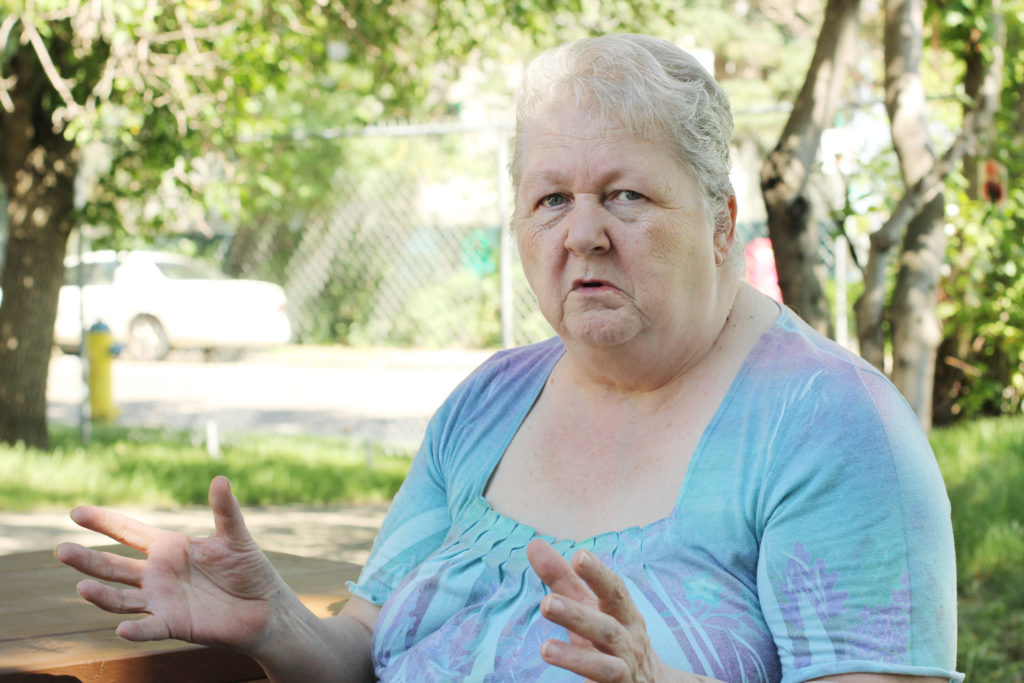
LS: For sure, I’d love to hear about your experience with this pandemic.
L: I HATE this! I mean, it is all over the news, constantly, and the bad part is that it is ALL COMMON SENSE! Wash your hands. Keep your distance from people. Don’t be breathing in their face. Take care of yourself, make sure you are looking after you, and the rest of it will work out! It’s hard on people who have preexisting conditions. If you have two brain cells that you can rub together you would know that with pre-existing conditions like asthma, you’re going to do way worse with a bug like the flu! And then on the news you hear how it’s going to be a gorgeous summer day and so everyone is going to the beach. The masks and the gloves and the social distancing are just gone! Well, guess what? It might be nice outside and it might be nice to go to the beach. But, if you stay 6-feet away from each other, you can enjoy the beach and still go home and still be okay the next day. It is very frustrating! Didn’t you people learn anything when you were children?? Your mother was constantly hollering at you: “ Wash your hands! Wash behind your ears! Don’t do that! You! Get away from that table and go wash your dirty fingers!” You know what I mean? That was my mom and every other mom in the country!
LS: How do you feel about how Alberta is going to open up schools again in September?
L: I don’t think that is a good idea because children are not going to be as careful from staying away from each other and to kids. Anything over two weeks is like a year. So everyone is going to want to play together which is normal for children.
LS: I almost have to put a limit on how much I talk COVID for self-preservation. I’m going to ask you a different question, but only after we take a deep, cleansing breath (deep breath together). I want to also talk about good stuff that happened in your life.
L: Good stuff? Oh! Having children. Seven children. When I was 15 years old I wanted to be the perfect person. I was going to quit school because it was boring and I was going to go to work as a waitress at a truck stop and I was going to make my fortune there. …. No, no. It doesn’t work that way. (laughs). One of the best things in my life is the fact that when I was 15 years old that was the year I left school and the year I left Alberta. I left with three friends to BC and we were all gonna go get jobs and be on our own. They lasted three days. They couldn’t find jobs that would pay them big money so they went home. I found a job and I knew I wasn’t making big money where it was a dishwasher job in Fort Macleod. I went to work, they went home but they didn’t tell me they were leaving or anything. I got off work and I found a note stuck to my locker saying “We went back to Alberta. See ya.” And I thought, okay!!! That’s cool!
So I told my boss and she offered me a spare room in her basement. She was one of these perpetual grandma ladies. She was grandma to everyone in town. I don’t think anyone called her by her name, just “Grandma”. So I stayed with her for about two months until I decided to go see BC. I figured that the only way I could do it was on foot so I hitchhiked to Macleod to Williams Lake to Vancouver to Victoria and I worked all sorts of jobs all the way along. I would wash dishes, waiting tables, milking cows. Just outside of Victoria is a little town called Saanich and 3 miles out of that town was a dairy farm and they would milk 150 cows. I thought for a 15 year old kid that grew up on a farm and I knew what a milk machine was and I knew how to put it on the cows so I spent two months washing cows’ udders and milking them! It made me money, it was a new experience, I was independent. It was wonderful! I loved it. I was on my own from the 11th of January that year until the 15th of November. When I came back to Coronation in Alberta, my home town, I knew that I had not phoned mom while I was away. I just never thought about it. My mom was kind of one of those where she thought, “Well, if the police get a hold of me, I’ll know she’s either hurt or dead. If they don’t, then she must be alive and I’ll just let her go.”
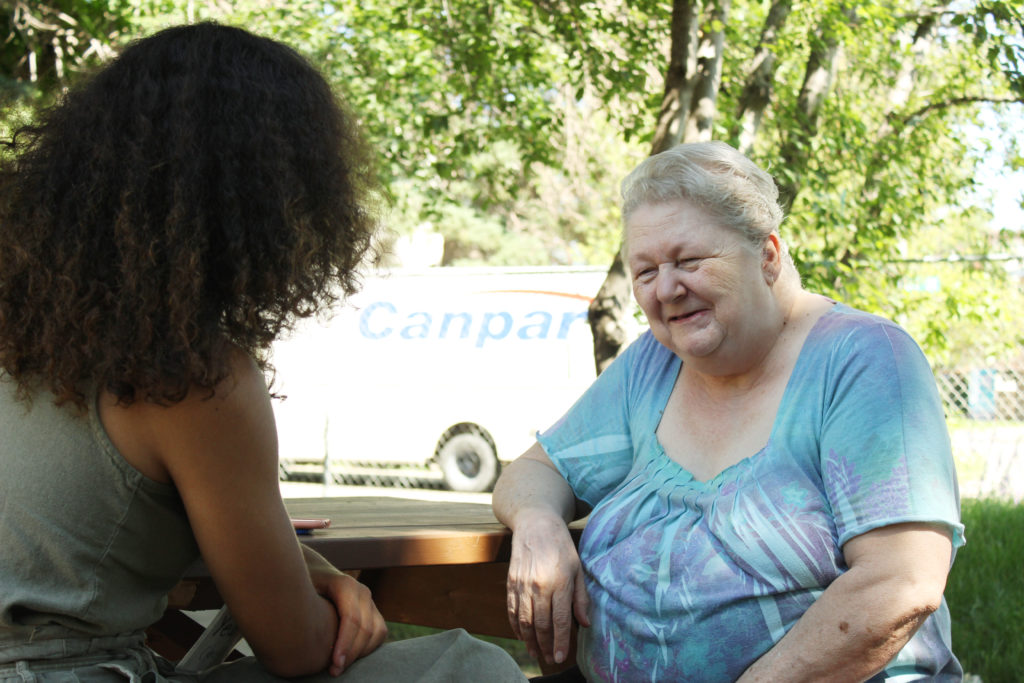
LS: So what drove you to come back home?
L: It was almost Christmas time so I figured I would come home and see everybody for Christmas. When I walked through the door my mom said, “So. How’d you do?” (laughs). I mean I’m here, I’ve got new clothes and I remembered when on my BC journey I was asked by a lady if I wanted to go and pick fruit. I didn’t realize that picking fruit meant whatever fruit was left in BC and then going across the border and keep going until San Jose, California, and then come back. So…. yeah I picked a lot of fruit (laughs). Almost any kind of fruit you can think of. And I got to see an amazing amount of country and I met some wonderful people!
LS: So you got some amazing life experience just from the start, fresh age of fifteen.
L: It was really cool! Even though hitchhiking was probably not even close to how dangerous it is now but, you know. You didn’t hear so much about it. I wouldn’t suggest to a kid now to do that but it was really great. You learn to start using your gut. “Do I want to ride with them? Hmmmm. No. I think not….. It’s okay I’ll walk!”
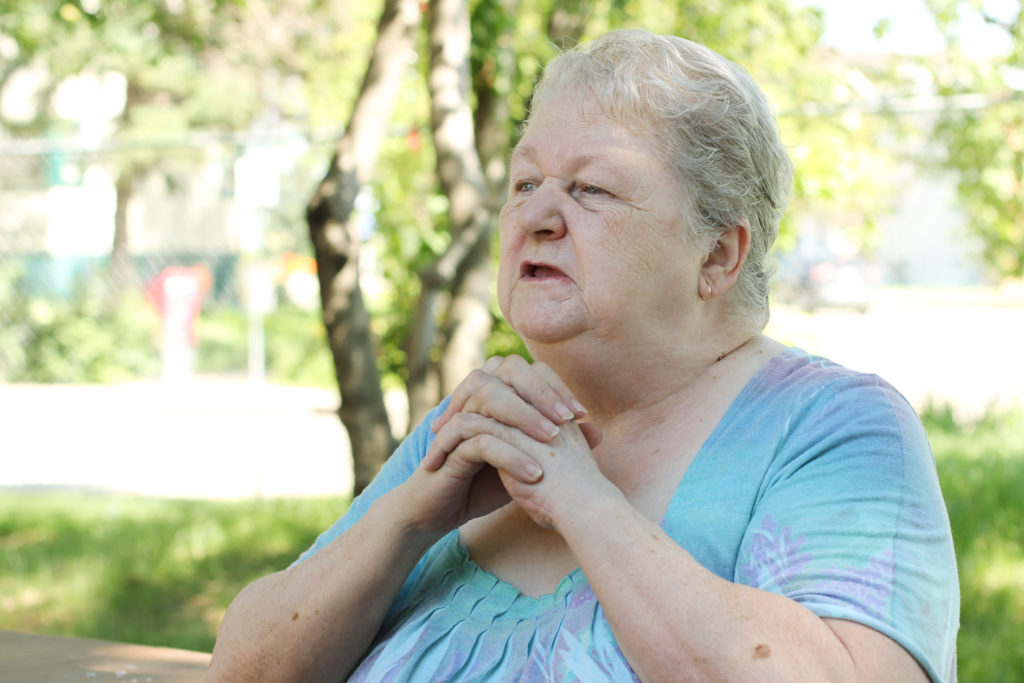
LS: You were able to train and tap into your intuition. What was something you learned that year going from place to place?
L: The biggest lesson I learned was: don’t ever be overly sure of yourself. Don’t get cocky. No matter what job you apply for, have them show you what they want you to do so in that way, you’ve got the basics. And you can apply that to life. It doesn’t matter what job you’re doing, every employer wants it done differently. The quicker you figure that out the faster you’re going to be able to do the job.
LS: Great advice. And then from being a mother of seven, what were lessons you gained in that realm?
L: Knowing that now they are all out of school and that my two oldest boys are computer engineers with big companies up North, my son Raymond lives in Reykjavik and Steven lives in Whitehorse. Ramona, my daughter who lives here in the city, is an office manager for Carlson construction, one of the biggest companies in Canada. My daughter Leonna is a prison guard in Drumheller and she doesn’t work in the women’s prison, she works in the men’s. My daughter Belinda went back to school at Red Deer College after she had her kids and became a chef and in two months she will have her Red Seal.
LS: Wow!!
L: Knowing that all my kids are that smart and I quit school in grade 9. (laughs heartily). So I guess I did something right! After I found out that my kids were doing so well, about four years ago, I got my high school diploma through distance learning at Stratford Career Institute in Quebec. I just found it in a newspaper. So I got my high school diploma at the age of 63. I realized how much fun at home schooling was so I decided to take a sewing and dress-making course as well as a fabrics and merchandising course. After that I did paralegal assistant.
LS: This is all in the past four years??
L: Yup! And I’m working on cooking and catering right now. Because it is fun to sit there and involve yourself in something and see just how good you can do it.
LS: Yes, wow! Amazing. I commend you, that’s great!
L: I mean I’m supposed to be retired and I have all this time so I may as well do something about it.
LS: I agree. Last question. Reflecting on your life, what is some advice you can give to people reading your story that you gained from your life?
L: Don’t ever underestimate older people. They might be older than you, they may act a little strange considering how you act, but their knowledge and their life experiences are so important. If the younger generation doesn’t listen to their elders, they will lose so much. I know with myself: I miss my grandmother every single day and she has been gone since I was 25. There are things that I want to ask her everyday but I don’t get a chance to. Although I can do a lot of things and I know how to do a lot of things, if I can’t pass that knowledge on… then there was no sense in me learning it all. I think for the most part, younger people are actually pretty smart. They know that the older people have all this experience and kids aren’t one bit shy about asking questions. I have a six-year old great granddaughter that looked at me a couple of weeks ago and asked, “Grandma, do you remember when dinosaurs were around?” and I looked at her and replied, “Mmmm no… I was a couple weeks behind that.” (laugh together). Because I am great grandma, I must have known- right?
Get all the information you can from older people because it is worth gold.
LS: Thank you. I had so much fun talking with you!!
L: Oh yes!!
To read more stories, visit: Hello Lumen Series

Al
This interview conducted by Yesmine Elloumi and Jersey Manabat of The Lumen Series in partnership with Operation Friendship Senior’s Society.
L: What motivated you to want to talk to us, Al?
A: I like to help out. I live here at Pioneer Place. I cook the turkey for Christmas and Thanksgiving dinners. I make 30 pounds of stuffing and potatoes. I do it because I worked for a restaurant after my hip surgery when I was 53 and they would cook a turkey every Sunday and I would cook the roasts, the turkey, the marinara sauce. So I said yeah, sure. Gives me something to do.
L: I see. And earlier you told me that you were ready to tell me your life story so: go ahead!
A: I went to Europe right out of high school, spent 6 months there. I grew up in Ontario, right. When I came back from Europe I went to the island in BC and tried logging for a while but they only work in the spring and fall so that didn’t really work well. We were kind of young and free and we were the hippie generation.
L: So in the 60s?
A: Well, the 70s. We got the hippie generation a bit later up here in Canada. And then I started working at a nuclear station in Douglas point to get my apprenticeship and I bought a sailboat- but I had never sailed in my life- because it was so close to a lake. For 3 years I stayed there and I had a lot of fun with that boat because I had never sailed in my life. And then they finished the station and I moved out to Alberta and I worked in the oil patch until about ‘82 when the price of oil fell. It was like $17 a barrel then. Yeah and you couldn’t get a job after that. We used to go down to the Caribbean and spend the winters there. I never got married. Came close a few times…
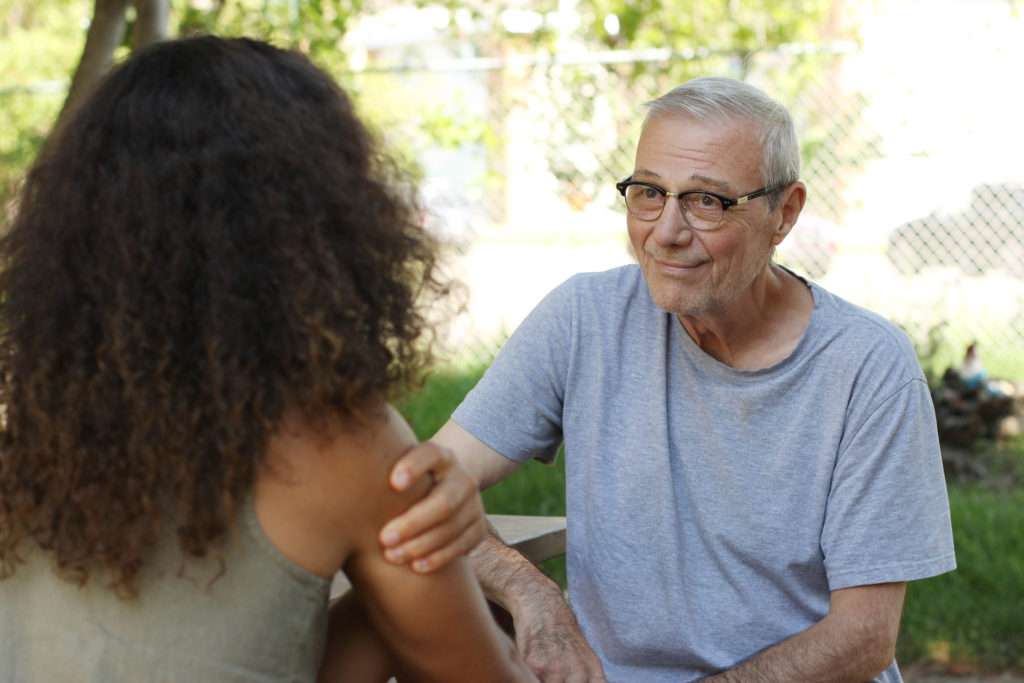
L: What stopped you those few times?
A: Well… I was never really ready. I just never was ready. Maybe by late 30s, early 40s I was kind of ready but it was too late anyways so why bother? Anyway, I got into vinyl siding and I really liked that because it was clean, came out of a box, nice and light. Vinyl siding is the exterior of a lot of houses. Just sheets of 16ft plastic. I became an exterior finisher if you want to put it that way. I really enjoyed it and I was my own boss. I subcontract, I don’t have to work for anyone else. They just come by and drop off the material and then they come back and drop off a cheque when you’re done! That’s it. I did that right up until I had my hip replacement.
L: I know you said hip replacement but my brain heard “hippy place”
A: Oh, I had a few of those way back… (laughs). But, no. I couldn’t climb ladders so I went to work in that restaurant. This was all in Fort Mac, right? I was in Vancouver and by the late 90s work had really slowed down there so I decided I’d move back to Alberta! I came to Calgary first and they were paying so much per square foot you put on. And then I saw that Edmonton was paying $10-15 more so I went up to Edmonton, and then I looked in the paper and Fort Mac was paying $100 more!! So, off I went! I stayed up there 13 years. I did siding until I got my hip replaced so then I started working at Brewskies, the restaurant. That was the best job I ever had! It was all a bunch of good, young people so I could tell all my stories. It was 9-5 pm, so fun! And then so the reason I moved back to Edmonton was that I got sick. I had hepatitis C and I had to start on a program to get rid of that. And then I also needed a knee replacement so bad. I had that done when I moved down here and then 6 months later I was diagnosed with prostate cancer. I was 63 then. Went through radiation and all that and now it’s in remission.
L: Wow, that is a lot to have dealt with.
A: Oh I have so many more stories. I can’t tell you some of them on record…
L: That’s totally fine, I want you to feel comfortable when you’re speaking. You don’t need to share anything you’re not comfortable with.
A: I bought a 30 foot trailer up in Fort Mac and lived in that for 13 years. I smuggled some dope from Morocco to the Canary Islands. We bought a chunk of hash and some weed and we stuffed it into cigarette packets and then sent it to ourselves in the Canary Islands. So we went back to Marseille and took a boat to Canary Islands and it came with American Express! (laughs). When I lost my job in the oil patch, I thought to myself “I got a bunch of money!” so I went down to Vancouver, bought a bunch of pot, went over to Grande Prairie and doubled my money in one shot! I did that for about 6, 8 months until they busted me…..
L: Oh no they busted you!! What was that experience like?
A: (laughing)… well it sucked!!! They got a bunch of money. They got over 15 grand. I just got a $1000 fine! I also got busted for importing pot into the states in 1971. We drove out to Vancouver and we’re driving to the border and we look like hippies, you know. Long hair… all that. We get to the border like, “Alright!! Put everything away, put it all away!” And then we forgot that there was a hash pipe in the ashtray…. So they took us in and I had an ounce of pot in my pants and they got it. But nothing happened they just let us go and we had to give them $100 to get our car back but we didn’t have $100 between us so we had to walk back to White Rock, heckle some of the guys’ folks for $100, then we went back to the border and got the car back but then they wouldn’t let us in!!! So we just drove over down the border to another crossing and got right through (laughs)! They had no computers back in those days so we got into the States.
L: What was the experience like selling pot back then?
A: Oh, it was fun. Made a bunch of money, didn’t have to stand on the side of the road selling quarter ounces, half ounces. I sold like 10 pounds, 5 pounds, 8 pounds of hash. Just to dealers a one-stop meet up and then back to Vancouver I went. My suppliers were all good friends.
L: What was a lesson you learned from your work in the business of marijuana?
A: Quit while you’re ahead!! You know now that if you do anything for a certain period of time, they’re getting on to you. If you do the same thing every week or every 10 days for 6, 8 months, you know someone will start to notice. Look- we didn’t care, we were smoking and drinking, just living.

L: Now it’s so different! If you want to do it “right” by setting up your own dispensary, there’re a lot of hoops you need to jump through. For instance, the amount of money you have to have in the bank, sitting in your savings account.
A: I quit smoking when the hydroponics came out. And that was in the mid-80s and the pot they were growing just got so strong. I smoke the off joint here and there still but you know. Too strong.
L: So quit while you’re ahead was a lesson you learned but in your dynamic life living and working all around was it your medical needs that brought you back to Edmonton?
A: Yes, exactly. It was my knee replacement and Hep C treatment. I didn’t move straight into Pioneer Place. But when I heard of it I sent an application and I got in which was about 7 years ago.
L: What has your experience been like living here so far?
A: Oh, it’s been good. I pay $650 a month and that includes everything, even my parking spot. Heat, hydro, cable, an extra $30 for my spot. I get all the pension and other federal funding which is my income for now. It’s never enough money (laughs) but I don’t need that much money anyways.
L: So what do you do now? What are your hobbies now?
A: Well I volunteered at the Folk Festival every year I was down here and this year I couldn’t do it! So, my whole summer was from the middle of July till the 3rd week of August was the Folk Festival. I did five days a week, Monday to Friday and it was so fun. This year I don’t get to do it and I’m kind of lost! Help me! I’m lost! (laughs).
L: Oh, I understand, I love the folk festival. It is so much fun.
A: Oh so you’ve been then? Good! I was on site crew so we were the ones who put everything up and then took it all down.
L: My boyfriend used to work for the Heritage festival that usually happens now and he worked there I think for like three summers? They did the same thing as you: they were the site crew. They would be working for the whole month before.
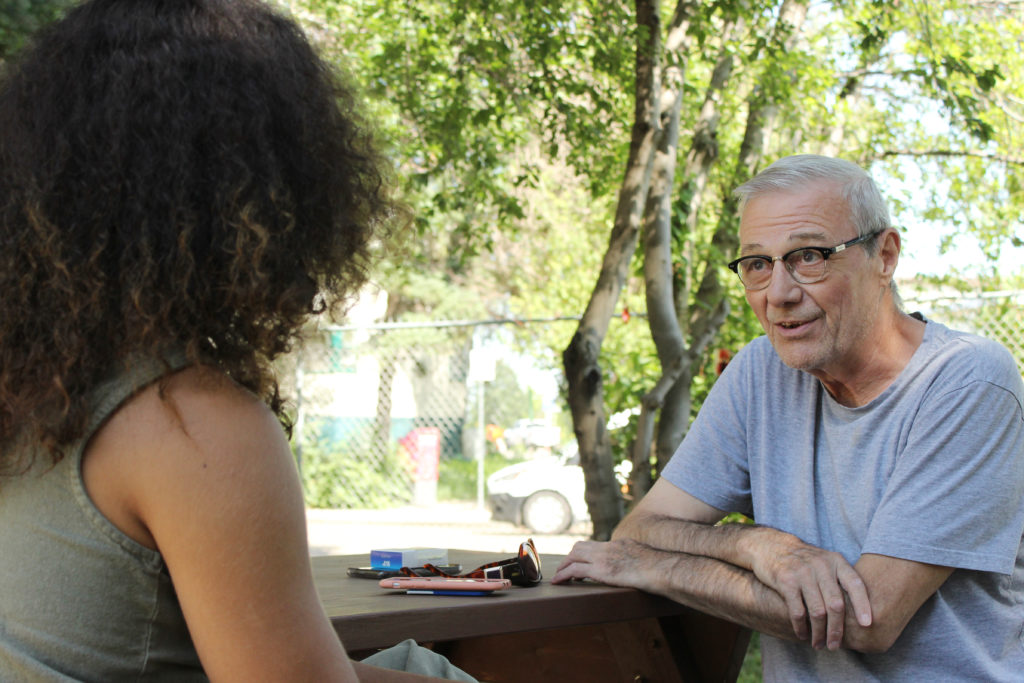
A: Oh yeah, it takes a long time. There were like seven stages you know? Here: do you want a tictac? (offers tictacs to Yesmine and Jersey)
L: Oh yes, thank you. Fresh breath for you my friend (laughs)… so tell me, Al: what was the happiest moment of your life?
A: Happiest moment? It’s hard to say. I’ve had a lot of happy moments. Traveling through Europe was fantastic. Seeing that, experiencing that. This was back in 1971 and I was right out of high school so I saw the Berlin Wall, I remember that. We were in a park one day and we didn’t even know where we were right? We bought a Volkswagen van in Amsterdam, $200!! And drove it all through Europe, we lived in it! We lived in it! So yeah we’re in this park but we didn’t realize what was going on. We were playing frisbee and the frisbee goes over towards this roll of razor wire, right? And I think, “Oh my god, what’s that??” And we look up and there’re rows and rows of razor wire and then this big wall! And all the people in the park were starting to run towards their cars and we’re still so confused thinking, “What is going on??” and then I look up more and see there’s a guy with a machine gun pointing his barrel down at me … needless to say we left the frisbee there!!!! (laughs).
L: Oh my god!!! You had no clue!! Was this in Berlin?
A: Just out of Berlin. That was quite the time. I guess going through BC too is always a lot of fun, going down to Masirah Island in Oman. Getting away from Alberta winters.
L: Who are some of the people in your life that were really important to you and what did you learn from them?
A: All my friends in BC were all great people. They’re all Black and they were the best guys. We used to go fishing in Sheridan lake and I actually own 30 acres of property up there. It was the last lot and it’s just before Wells Gray Provincial Park. It was the last property. Every time we’d go we would find a lot of trouble trying to come back! It was so nice: just fishing, partying together.

L: Amazing. You must have had so many good times at that property. So then Al, what was one of the hardest times of your life?
A: Probably when I found out I had cancer. You never think it’s going to happen to you but then boom, it happened. I was here in the city, my buddy was in the oilfield so I couldn’t see him very often, and so I didn’t really have anyone to talk to. My family is all out East and yeah sure we talk on the phone every once in awhile but it’s just not the same thing. That was probably the hardest thing. But now it’s all gone.
L: Do you have ties with your family back in Ontario?
A: Oh yeah! I just sent my great nephew a birthday card. My niece’s son. When it came to my diagnosis with prostate cancer the most frustrating part is that there is nothing you can do about it. You just got to wait until your time comes for treatments. When I found out it was finally in remission, I felt pretty good. I had just retired 2 weeks before the last radiation treatment which was like 5 days a week. So I got a union buyout from the union out East which I didn’t know anything about because I only worked there for about 4 years. So I got $10 grand and I bought that car over there!
L: That’s awesome! What a nice surprise! I have one more question, Al. What is some advice that you could give to the people who are reading your story that you learned from your dynamic life?
A: I think that it’s just that you have to be able to be comfortable with yourself. You don’t have to- if you need to have someone else there, you’re unlikely to be comfortable with yourself alone. I am quite comfortable with living alone. I know my buddy Rob has been married and it’s his third wife now and he just can’t stand not having someone with him. He just can’t stand that! And I can never understand that! Like, why? I think that maybe it’s because when I was growing up I was the last of four kids. I had a brother that died last Christmas and he was 9 years older, my sister is 10 years older, and then my other sister is only 2 years older so by the time I came along my dad was 46 and he was kind of like, “Just stay out of my way and do whatever you want.” so I become very independent.
L: So your advice is to get comfortable with yourself.
A: I don’t know if I really feel comfortable giving advice for people because they have to decide for themselves. But I mean the teaching I lived throughout my life would be to live life! Don’t live your life in a bubble where you’re always in your comfort zone. Where you’re afraid to quit this job because you don’t know what you’re gunna do… if you’re not happy, quit the job! You’ll get another job. You have to take that step but you have to be able to do it, too. You have to be able to not fret about it. It’s a lot easier for someone who never got married, never had kids, never had the responsibilities so I am aware of that.
To read more stories, visit: Hello Lumen Series
Bonnie
This interview conducted by Yesmine Elloumi and Jersey Manabat of The Lumen Series in partnership with Operation Friendship Senior’s Society.
L: First of all how are you doing right now?
B: I’m good. Too warm to do too much, so I’m laying back.
L: Yeah, as you should. It’s also summer, so I feel like it’s a nice time to kind of chill out and take it slow. We’ll start by asking about your volunteer work here. So what are some of the things you do here to volunteer?
B: I started volunteering at the Operations Friendship at the drop in centre. I started there, I would just wait on tables, do dishes whenever it was required.Then when they’re having meals here I was doing the same thing in the kitchen. In fact I brought some health and safety measures into effect here at Pioneer Place from working at the Operation Friendship such as wearing gloves, closed in toed shoes. Those kind of things are required in the kitchen, like hair nets, and it wasn’t being done here when I first started. I brought that to Brian’s attention. So it was taken care of right away. They had stuff, but they weren’t using it. I really enjoyed it.
L: So did you kind of stop after a while?
B: Well we haven’t. During COVID, the Operation Friendship closed down. We’re not preparing meals here anymore right now. So, there’s not really much to do, but I still go out and weed around out here or at the front flower bed. I like that kind of stuff, so I choose to do it.
L: I love gardening as well, it’s so nice. It’s so relaxing. We also cover people’s life stories. So, if you feel like you want to start talking about your life feel free. If you want me to start asking you questions, we can also go that way.
B: Questions are good.
L: Questions are good, okay. We usually start with big moments. So I usually start by asking what was the happiest moment of your life?
B: My goodness. Probably when my son was born. He was a big baby, but he has since left us, and he’s in another world. I’m dealing with that.
L: I’m so sorry to hear that.
B: I have my daughter now, and my grandchildren. They’re only three blocks away from me, so it’s nice and handy for me to go and visit them whenever. I’m more than welcome to go there. A lot of people don’t have that. So I feel very fortunate.
L: I’m so happy to hear that. You said the birth of your son was the happiest moment of your life?
B: I believe it was, yeah. I don’t know, he was a good kid, and I wanted something other than my husband to love. He did it, he was there for me. He passed three years ago. 21st of December, before Christmas time. We’ve dealt with that.
L: Were you always in Edmonton Bonnie?
B: I was born in Rochester, Alberta. It’s about 60 miles North of here, on Highway 2. Very small town, it’s a farming community more than anything. I was on the farm until I was ten, and then we moved into the small town of Rochester, because my mom started to work in the store. I was then walking-distance to the school. It was a great improvement for me.
L: Right, because you were closer to the school? When you’re a child really, school was your life.
B: Yeah, I didn’t like it, but we had to go. I did okay. My mom had a serious surgery back when I was fourteen, and at that time, they were taking highschool out of our school and moving it to Athabasca. When the surgery was done, it required me to be at home.
L: So you were a caretaker for your mother?
B: Yes and I was able to take my grade 10, 11, and 12 by correspondence. So I can be home and at the same time I can do my school. And mom survived all that. She had an ear surgery, but they had to remove her whole inner ear, all that kind of stuff. Because there was a tumour I guess. It wasn’t cancerous or anything.
L: It was benign?
B: Yes, but they had to take it out anyways. So I had to take care of her. When you lose an ear, you lose the balance. So she couldn’t do much for her. That was another episode. I moved to BC when I was 19. Lived there for 5 years. Worked at the Royal Columbian Hospital out there, at the laundry room. Before going out there I worked for the social services department here in Edmonton, and then the attorney general, and then went to BC. When I came back, shortly after my son was born I was a stay at home mom, but once he got a little older I didn’t really want to stay home, so I started doing house cleaning, and I would take him with me. When my daughter came along, my son was in school, so I worked around his hours in school. He was a mommy’s boy and for his first year or twoI was in school everyday volunteering.
L: What school did your son go to?
B: McCloud School, Steele Heights. I went to school with him everyday, so I would stay there. I didn’t really do anything in the classroom, but when they needed something laminated or if any of the teachers needed anything done, I just did it. Then I would go home for lunch and then come back in the afternoon.
L: And your daughter was how old?
B: She wasn’t around yet. There’s nine years between my son and my daughter. He was a hyperactive boy, so he required a lot of my time, back when he was little. I didn’t have my daughter until after that.
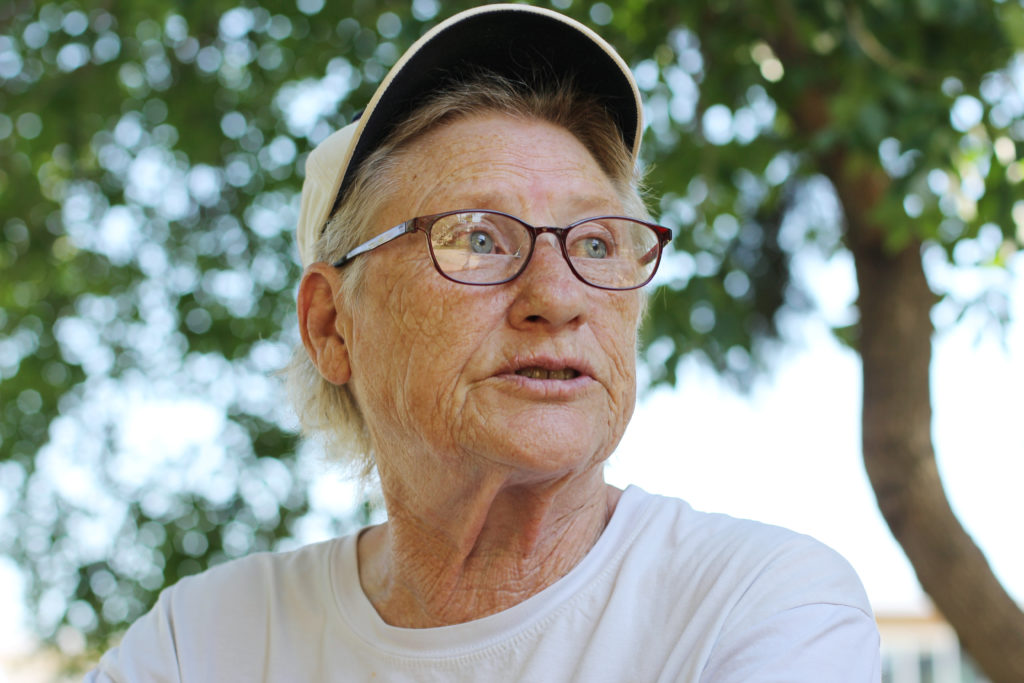
L: And what made you feel like having another kid?
B: I didn’t want to have an only child. I wanted a girl, and I wanted her to be a redhead, because I was the last in the family. And she ended up being a girl and a redhead. I was 34 years old when she was born and volunteering a bit, working bingos and stuff for the school when fundraisers, whatever. Then I was working doing house cleaning and stuff, getting extra money for us. I had a pretty happy life. I’m 70 years old now.
L: You’re 70, okay, so how’s life been since?
B: It’s not too bad, it was rough when my son was passing.
L: Was he sick?
B: He drank himself to death. He was on the street here a lot in Edmonton. He got into meth stuff, I couldn’t have him in the house with me and my daughter. There was no way he could live with us. They become such unpredictable people when they’re on this stuff. I just couldn’t have him with me. So, he spent a lot of time here in the streets. There are still times when I go out, I swear to God he’s calling me. I hear a voice, and I swear he’s calling me, but he’s not around of course. Pretty interesting.
L: But still it’s really hard.
B: Oh yeah, it was heartbreaking. Life must go on.
L: What did you learn from the experience of having a son who was battling an addiction?
B: I knew it was coming for quite a while because of what he was doing. He was drinking a lot. He lost a leg at the age of 18. There were a bunch of kids his age sitting around my dining room table. When I still lived in Steele Heights there was a sawed-off shotgun and I didn’t know he was in there. I was on the third floor visiting my lady friend. I heard a noise, this would be maybe at 12:30 at night. I sat a few minutes, and I said I’m going downstairs to see what’s going on. As I was going down the stairs, I saw him with his leg hanging behind him. The gun had misfired, and took his leg almost completely off, just below the knee. That was a lot of what caused his going downhill, mentally. Dealing with that, then fighting to keep his leg, which didn’t happen. They had to remove it. He got a prosthetic, which he didn’t care for. It irritated his leg. He ended up passing leg-less.
L: That’s really sad.
B: That’s okay, we dealt with that too. My daughter was only seven when that happened. She had a hard time with it, of course. She just consoled me, and she did her thing with her friends. Out and about, like a normal girl, and it didn’t seem to be too bad. I sure it was, but it didn’t seem too bad for her.
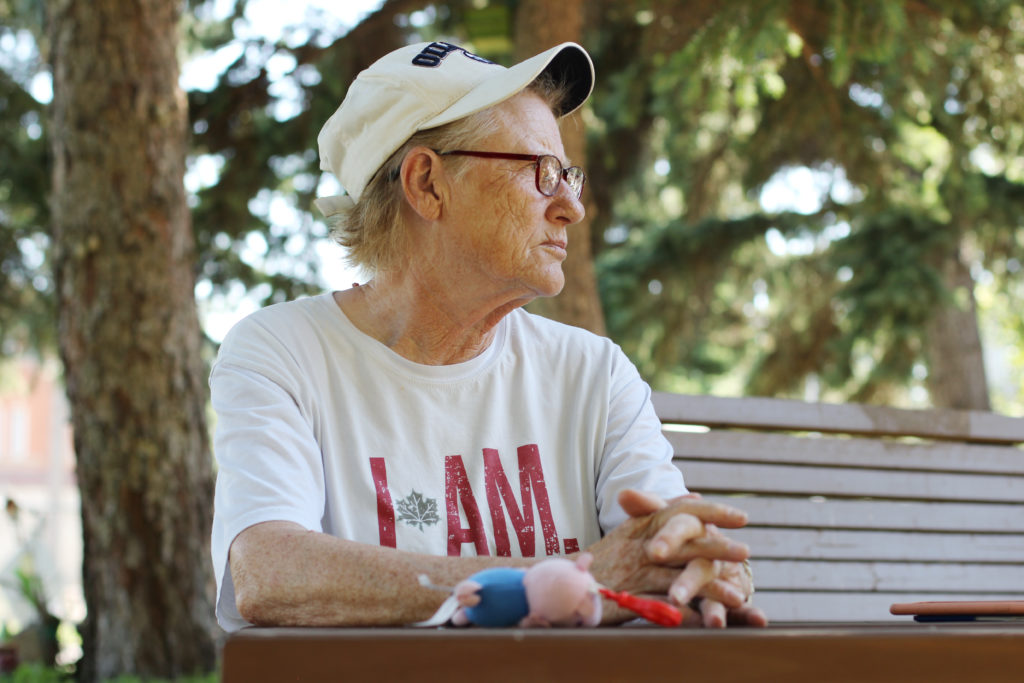
L: What was some of the biggest support for you?
B: My friends mostly. I didn’t go to any psychiatrist. I don’t know. My friends were just there for me. Let me talk, if I needed to talk. Keep me busy doing something with them, gardening or doing whatever. Having a couple of drinks together, whatever. They were there for me, so that’s what’s really good. They have kids, so my daughter was with company as well.
L: That’s good to hear they were there.
B: They’re still around actually.
L: Are they in Edmonton?
B: Yes.
L: Are they close by like your daughter’s?
B: Not too far, but of course they drive. Right now during COVID, they’re not working either, so have the opportunity to come. Visits here are not allowed, but they can take me out. It’s all good.
L: Thanks for sharing that. So, how long have you been at Pioneer Place?
B: Two years in April. Before here I was living with my daughter in Clareview for some time and then we moved closer to downtown. She had lost custody of her kids for a short period of time and when she got them back she had a new place to meet them in. I moved out because I wanted to be by myself finally but also be next to the kids. I stay up stairs when I don’t want to be bothered with some of the people here but it’s a nice place for walks. I’m a hockey fan and I’m looking forward to tonight’s game. I put a pair of Oiler’s boxer shorts, hat, and mitts on our huge teddy bear so he’s all decked out too. Myself I am not short of any Oilers paraphernalia so I am looking forward to getting dressed after this interview!
L: This might seem like a silly question but why do you think you love the Oilers so much?
B: I used to play all these games when I was young and in school. Hockey, football, basketball, everything. Sports move fast and I like that! It’s entertaining. I don’t play any sports anymore but I love playing video games. Candy Crush, Candy Saga Crush, you name it.
L: You’re hip, Bonnie! I love it! I also wanted to ask about your children’s father and his role in your life.
B: He was kind of an alcoholic and he got physical when my daughter was 4.5 months old so, I left him. I took my babies and went off by myself. It was a horrible experience. He wanted to see the kids but the kids didn’t want to see him and I found out he was involved with another lady before I even left him so whatever. If that’s the way you want to be, then be. I filed for my divorce and I got it. I also filed for full custody of my kids and I got that too. So, yeah. He was kind of a cranky thing. I realized I didn’t want to live like this, I didn’t have to. So we left.
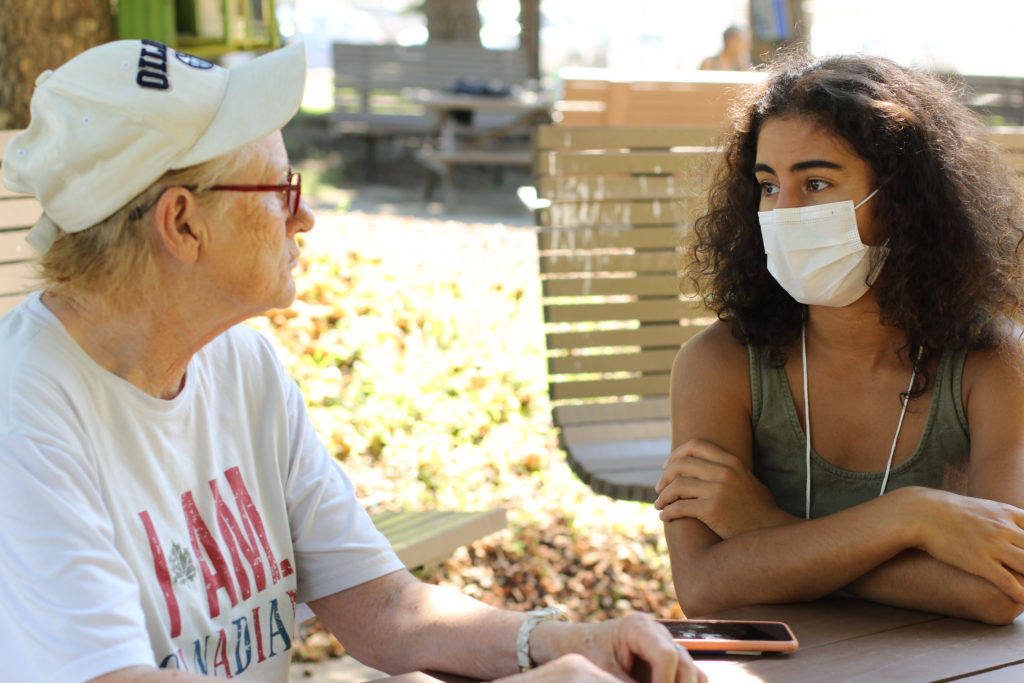
L: It’s a good thing that you were really clear as horrible as that experience was. You’ve shared a lot with me so I want to thank you for that but with every experience you keep saying “I got through it.”
B: You’ve gotta deal with it as it is and that’s how it is. I believe that’s how I deal with whatever it is I have to deal with. It may take a toll on me at that time but you learn to get stronger, learn something from that to make you stronger and then you just carry on.
L: What was something you learned from taking your children and leaving your husband? Filing for divorce and such?
B: At first I wasn’t thinking I was able to do this and then when I did do it I thought well, what’s so hard about this? Like it was such a stress relief off my body that I could actually breath and raise my kids! It was totally different.
L: Did that inspire you in any way? To try something new? I know you did a lot of volunteering so I guess what did you learn from being a volunteer for a lot of your life?
B: How appreciated a person can be just by helping someone in such a small way, to me. But they’re so appreciative. The other day I called an ambulance for a guy who got ill in this building here and people were calling me an angel… calling me “you’re so nice” and all this stuff and I mean- who wouldn’t do that? I think any body would. I mean, some people might panic and I don’t. I kind of go to pieces after it’s all over but when it’s happening I keep my wits with me.
L: What’s some advice that you’ve given to your children?
B: Just keep reinforcing them “You can do it!” and so far Kelly has got through life pretty good. She did lose custody of her kids for a bit cause she was kind of going down the same road as her brother but she was able to be strong enough to get help for herself so she did and now the children are all back and we’re a happy family.
L: That is so good. I’m so happy to hear that. I don’t know how to ask this next question so bare with me. For the past few years I have done a lot of readings and coursework on addictions and especially the opioid crisis and so I know for sure that it is a disease. It’s due to so many factors and trauma that it can happen. Knowing that their father was an alcoholic, what kind of influence do you think that had on your children?
B: I feel it had a lot to do with the way they grew up because I never did drugs in my life, not even marijuana. And then here they are, experimenting with everything and it is like what the heck is going on here! But um, booze is what finally killed my son. And my daughter was doing the same thing but like I said she was able to be strong enough to get help. So she stayed out at Poundmaker’s Lodge and several of the other detox places here. These places do have a benefit but it took us a while. After two years finally she was able to say “no!” and stay away. That was the big thing. Because it’s easy to quit for a while and then something might trigger you and your relapse. For her, her motivation was getting her babies back. And so that’s what she worked for and kept her going
L: So do you think that for individuals who are battling an addiction or who have a coping mechanism for some pain they’re trying to heal from- like for your son when he got shot in the leg, or for your daughter maybe in part it was her relationship with her father- and now you just told me that your daughter her motivation was her kids. It sounds like for your son, he didn’t…
B: He didn’t have “a” motivation. No. No.
L: And that is tough to swallow. So for people who don’t have “a” motivation, what can you do? What do you think?
B: They have to keep reaching out to someone or something that interests them instead of sitting around being whatever they are: drunk or drugged up, doesn’t matter. They have to find something that they can reach out to. Something positive. I know a lot of people who have addictions don’t have that. They don’t have families, so I can understand where they are because they just have lost whatever they might have had. So I can see why they’re there.
L: And it is unfortunate that most supports such as AISH (Assured Income for the Severely Handicapped) are mainly financial because yes money to pay for living expenses is essential but if you’re raised or have been in unstable environments unfortunately those funds may be used to feed addictions, etc.
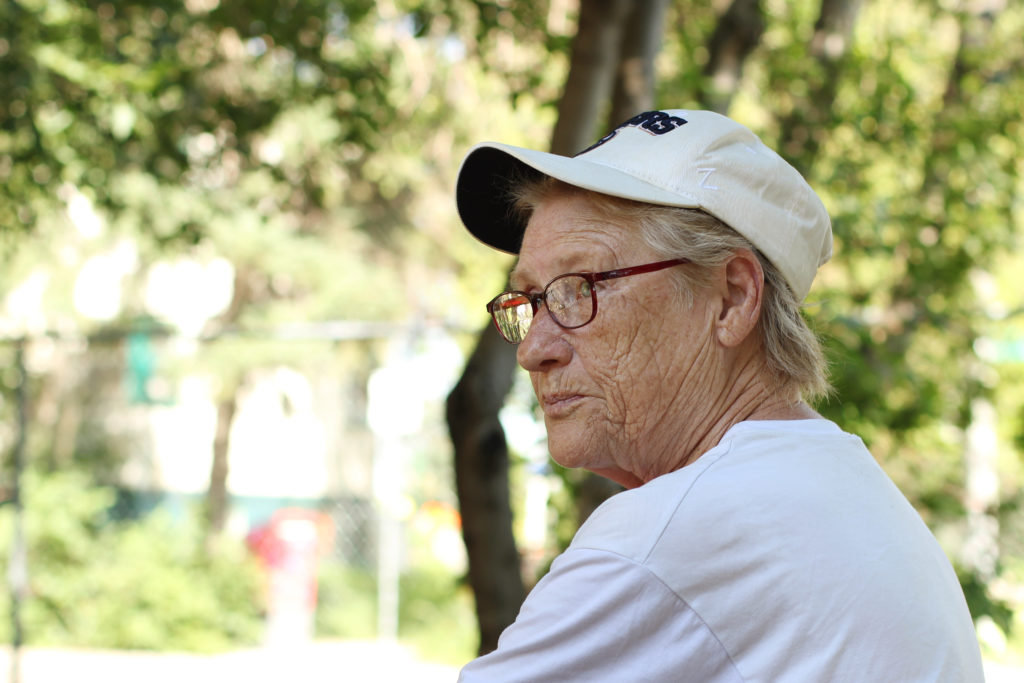
B: Yes, yes. I’ve seen that too at the Operation Friendship centre, yes. I used to go there quite a lot. I had a group of friends there and we used to play Crib and do crafts or whatever would be going on for the occasion. So there was lots to do there but there were also some people that when they got paid they were millionaires for a day or two and then they would be right back to square one again. It was sad.
L: What do you think can be done about that?
B: It’s kind of about the individual themselves. I’ve spent a lot of time talking to different people in these positions. Trying to give them a direct motive and a positive motive but whether they take it or not is totally up to them. I try to be a positive person and my aid is always there if they want it. And as I get older I like to help them even more because I see many people who aren’t as well off physically as I am so I love to share my aid.
L: Do you have a memory from helping someone else that taught you something about yourself?
B: That I can actually do it. Just put yourself out there and whatever is required you do it and if you have suggestions to better it then throw them out there too. I enjoy giving.. Just giving. A good feeling. There is no specific moment. They’ve all kind of been equally fulfilling.
L: Fulfilment through service! That’s amazing because you help so many people.
B: And it helps me! By helping someone, it helps me. And at 70 although I don’t like it, as long as physically I can carry on, it’s only a number. So, we’ll carry on! (Laughs). There isn’t too much else that I want to achieve. The last job I did before retirement was installing windows and I was staying active, hard work, but I enjoyed them. My physical health is really important to me. I don’t want to be all crippled up. I broke my ankle six years ago, broke my knee two years ago. It hurts but you carry on.
L: My mom always tells me she wants to die young. She’s 54 now and she doesn’t want to slow down. You sound kind of like her. Are you afraid of the future?
B: No, no. Because I’ll deal with that when it comes. There’s no sense in getting upset about it! We didn’t bring it on to ourselves so we just have to deal with whatever has been given to us You can’t change the big guy’s mind up there so we just carry on.
L: Looking back at your life, what do you think was your greatest achievement, Bonnie?
B: Raising my kids on my own and being able to support them and give them what they needed all the time they were with me. They never lacked for anything. Kelly is grown up now but she speaks of me to her friends and how I was always there. To fix bicycles, whatever needed to be done. That helped coming from the farm I believe. I was milking cows when I was four and mum had a fit when she found that out but I was with dad doing that. I was with dad on the tractor, I was always with dad and my brother was always in the kitchen with mum.
L: I’m like that too. My dad was my first best friend and I did everything with him. I have one more question. What would you tell parents that may have children that are experiencing addictions?
B: That there is help out there and seek it before it’s too late. I know a lot of parents blame themselves but I never did because I was never involved in drugs. I was broken hearted when I found out that both my kids were doing drugs and I had never tried any. I am thankful for that now. Some friends tell me I should try drugs because it’s good for pain… no. I told them I might have to end up getting two jobs because I would like the drugs too much. It don’t work in my life. There is help out there but you can’t make a person do it. They have to want to do it.
L: So how do you come to terms with someone who doesn’t want to help themselves?
B: They have to just go on their way and make the best of it because I’m going my way and try to make the best of what I can do. If they don’t want my help or my offering then I can’t do anything for them. They have to want it themselves.
L: Do you have any regrets from your life?
B: Uhhhh, getting married! (Laughs) Being that it worked out the way it did… if it was a happy marriage I probably wouldn’t have said that. He ended up being a drunk and he got physical so I’m not sticking around for that. That’s my only regret. I am glad my daughter calls him a “sperm donor” because he was not much of a dad to her. We left when she was 5 months old but he was supposed to take them for holiday one summer and he had taken them for a week then realized he didn’t want them anymore, so he brought them back. At least I know that they were happy and cared for with me.
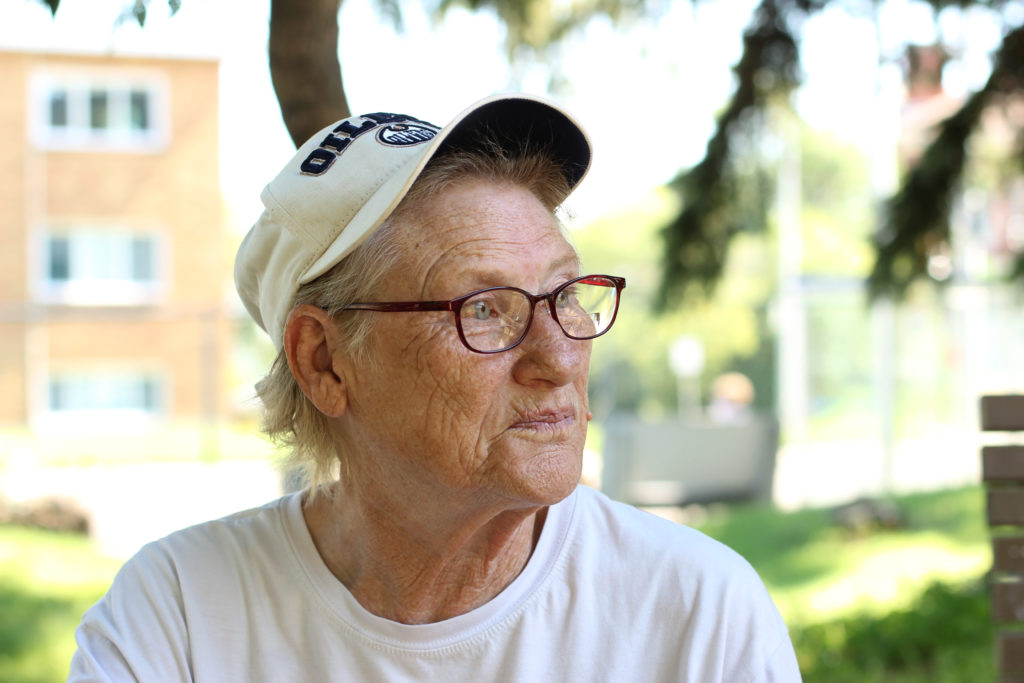
L: You have been and are an excellent mother for them.
B: Well thank you. My daughter said the same thing and I know my son would too. And it is so nice to hear that from them, those words from them. “Mom you are a good mom” or something like that. Some positive reinforcement.
L: Now I feel like I want to go home and hug my mom and kiss her.
B: Absolutely, that’s important. And hugs from those grandchildren mean so much too. My granddaughter has Down Syndrome and she is just the sweetest thing. Everything I say she repeats it! While her mom was going through treatment she was staying with the other grandmother and we know that she was very well neglected and it shows that she should have been put through speech therapy, and she wasn’t. Her speech is quite delayed. When I’m there she is my little angel, nobody else exists when I’m there.
L: I love to hear that you have such a special relationship with your granddaughter and I hope for the best for you always. Thank you so much for sharing your life story with me.
B: Thank you for sharing your time with me and allowing me to just unload a little bit I guess. Everyone needs to do that sometimes. I got some things off my chest and maybe somebody will benefit from my ideas.
To read more stories, visit: Hello Lumen Series
Christie
This interview conducted by Yesmine Elloumi and Jersey Manabat of The Lumen Series in partnership with Operation Friendship Senior’s Society.
July 23, 2020 Pioneer Place
L: What is one of the happiest moments of your life?
C: When I moved to Edmonton because I used to live out in the countryside and there was nothing really there. When I moved here, there were a lot of places to go. I used to go to the senior’s centre, we do crafts and visit places. Operation Friendship I would visit all the time. We used to go berry picking. I moved here in 1992 and I’m 83 now. My kids are all living here and I have 9 kids. Seven boys and two girls. I have four grandkids. I have four great grandchildren. Like I said we used to live in the countryside, McLennan close to Peace River and that’s where I was born.
L: That’s amazing. So many generations came after you. What are your experiences like in the Native Seniors Centre?
C: We do a lot of things here we do crafts and beading which I never got to do before. We used to go out of town to Jasper, to Drumheller, to Banff. We used to pick berries. I didn’t have many ties with my culture in McLennan and once my parents were both gone there was nothing much to stay there for.
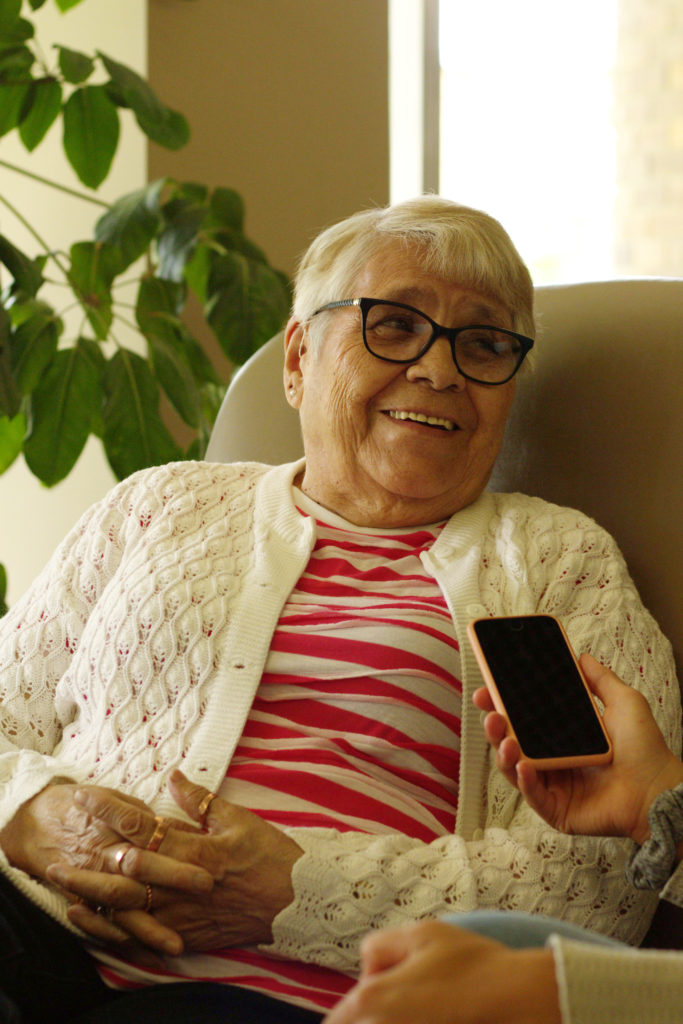
L: Do you want to tell me about your children?
C: Sure. One of my sons is a fiddler. He just won a Grand American Fiddling Contest last week, actually. I liked being a mother because I like to cook and I actually cook here at Pioneer Place every Thursday. I live here but I also volunteer here. That’s also what I used to do back in McLennan. I used to work as a cook on a train. I used to live in one of the train cars.
L: I see. What were some of the toughest times in your life?
C: When we used to live out in the countryside with the kids. No running water, you have to wash everything by hand. It was tough. The kids were going to school but sometimes I didn’t have any money to pay for their books. Their father couldn’t hold any job and he used to drink a lot. He was mean to us, mean to the kids. He’s gone now though.
L: That’s really hard to hear, I’m so sorry. He had a sickness of his own that he was battling but you and your children unfortunately faced the consequences of that as well. What are some of the lessons you learned from your life?
C: I like going out dancing when my son plays his fiddle. I always tell my kids- well they all worked, right?- I told them, “You need to earn your living. Go to work, go to school, and keep your job.”
To read more stories, visit: Hello Lumen Series
Bernice
This interview conducted by Yesmine Elloumi and Jersey Manabat of The Lumen Series in partnership with Operation Friendship Senior’s Society.
August , 2020 Pioneer Place
B: A lot of the work that gets done around here (Pioneer Place Senior Citizen’s Apartment) is done by the Seniors’ Society and I serve as the Treasurer and Secretary of that society. We are planning a trip for the seniors here and it will take a few years before we can collect the funding for it but we do fundraisers like craft and bake sales, bottle drives, 50/50, and running a raffle every once in a while. We want to go to Jasper for the mountains, Stettler for the train, and Drumheller for the Passion Play. We’re going to need at least 20 grand. I help in the garden with the flowers too. Anything that anybody really needs, it’s always, “Where’s Bernice? Bernice will do it?”
L: So, you’re really helpful around here! How long have you been in Pioneer Place?
B: Five years. My experience has been what I expected because I used to visit my dad when he was here. I know that there can be jealousy between the seniors and although it bothers me I just walk away from it. People can get jealous when they see I made a bead bracelet but that I won’t make one for them. I will definitely show them where the beads and string are, but I believe they need to do the work. It’s hard because I really love people and for my life to be good, I need people in my life.
L: That’s fair! From the start, I took you as someone very extroverted. You probably prefer friendship over conflict.
B: Ohhh yes. I’ve had enough conflict in my life. I want to resolve anything between me and who’s involved- I don’t feel we need to go to the office when us seniors have a misunderstanding.
L: That’s true because I find most times conflict is just due to some misunderstanding or miscommunication that happens. What made you want to become Treasurer of this senior’s society?
B: When I was in Ferintosh which is South of Camrose, I was the only one in the bank so I ran that. I became mayor,
L: You became Mayor of Ferintosh?? How many people live there?
B: 200 people! We all know each other. I became Mayor in 2008 and served until 2012. I was the director of Emergency and Disaster Services so I was the one that called for the whether we would stay in our homes or if we had to travel to another community depending on the disaster. When I worked the bank, I would do deposits, withdrawals, cashing cheques, selling GIC’s, helping the seniors when they needed to apply for government services, everything. And I did their income tax too. So many of the people in Ferintosh are elderly and I wanted to do what I could to help them.
L: A jack of all trades and a master of all trades too hey!! Tell me what you learned from being Mayor of Ferintosh?
B: The wells in Ferintosh were declared contaminated so I had to focus on making sure Ferintosh got a good source of clean water. We were in the process of connecting the water supply from the lake in Red Deer. It got really political and I basically realized how much I hate politics. I realized that if I wanted to achieve something, I could come to a resolution that served the entire community. At that time, Bernice came last. Since I’ve moved here I’ve learned that I need to take care of myself- no one else is going to do it! I used to never have time for my family so they’re happy that I transitioned to serving myself. I came to Edmonton right after I finished my role as Mayor because I ended going through a bankruptcy, a divorce, and I lost my job. So, I had absolutely nothing so my four brothers and my younger sister helped me move all I had left in Ferintosh into my brother Norman’s home. He lives with his wife and my soul sister Debra. They finally moved me to Edmonton because they wanted to get me away from places with people who could still get in touch with me. Then in January of 2015 I found myself in the hospital because I had a nervous breakdown. I couldn’t handle it anymore so I had to come up with new skills. There was this program that I just can’t remember the name of right now but it helped me figure out my trigger words and I had no idea what those even were. I discovered a lot of things from my life that I had just pushed down. I was trying to heal… (crying). I’m okay… it’s just going back isn’t always so good.
My daughter down in the States we call on video and then I can talk to the kids. They’re always jumping and Kerry says, “Okay we’re going to be nice so we can talk to Nana.” Kerry will sit in the middle then Morgan and Charlie on one side while Sasha and Joanna on the other. So they’re all jumping and hollering and I never hear anything but it’s a good way to stay in touch with the people that matter in my life. I have 10 grandkids: four with my daughter, four with my other daughter, and three with my son. They really populate the world when they want to!
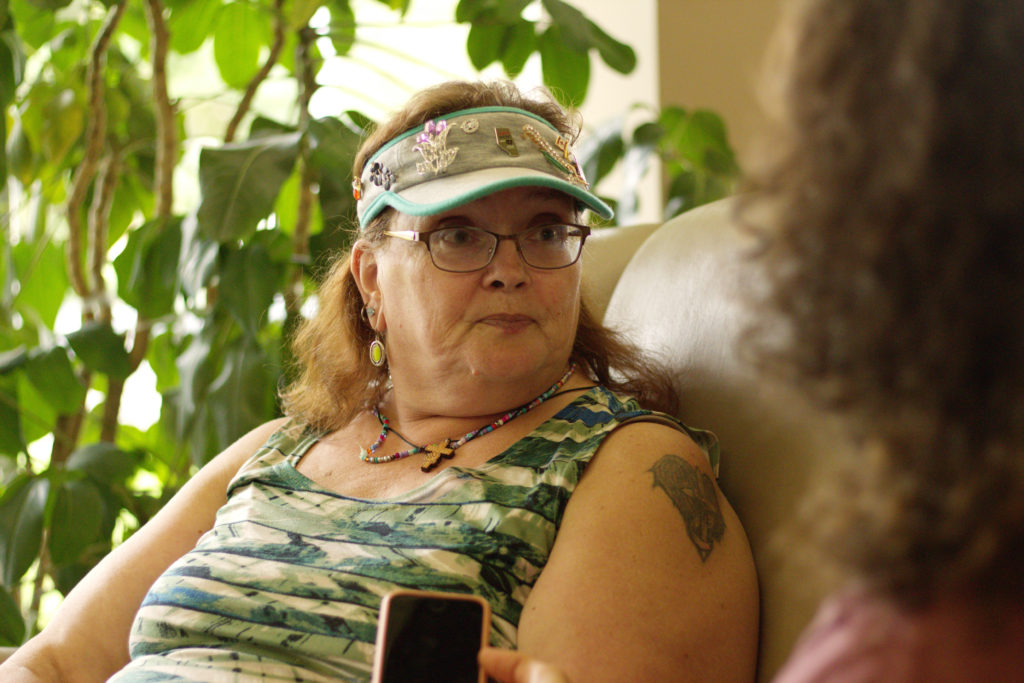
L: That’s amazing, thank you for sharing about your beautiful family. It’s so nice to hear how they are such a close part of your life. I want to go back to you though, if that’s ok. What was it like after you completed the healing program?
B: I didn’t think that that course would be useful for me… but it was six weeks and it was strict- as it should be! It started at 9 AM and if you weren’t there on time the doors would close and you would miss that session. Miss two sessions and you were out of the program. It needs to be strict because I was coming back to a place where I could accept myself. That course taught me that there are ways that we can change… (cries). My daughters have always thought that I should do meetings where I can tell my story because I still get very emotional talking about my life. I’m a jokester like my dad was. I like humor, I like to see people happy. Most people here know that about me too so I’m starting to open up. I am coming out of a bubble and everything looks so much clearer where before it felt like there was a film and I was always behind that. Now, it’s better. It’s better! Bernice is learning after almost 65 years. I work on the flowers at the back and they all know I used to live on a farm so they always tell me, “Oh, Bernice is farming again!” I like to keep busy.
L: That’s probably why you had so many roles in your hometown, right?
B: Yes! I love people. That’s all I can say: I love people! I stay away from conflict and only want to work towards possible solutions.
L: We’re almost done but I want to ask you one last question: Do you have any lessons or advice you have gained from your life?
B: When I had knee surgery, I had two surgeries done on my left knee and one on my right. I had osteoarthritis and a whole bunch of other crap. I had such an aversion to opioids so I was left with heat and ice. That’s all I used. I turned it around and wrote an editorial for the Camrose Booster. I wrote about how you don’t need to have all the pills if you’re willing to work through it: you can do it naturally! My arthritis and fibromyalgia were the biggest pains to me because those two things slow me down and I want to be going full speed. I have a lot of accidents, many falls. I get up too quickly even when my body is telling me to take a second. So I am teaching myself that it’s okay to stop for five minutes or what and then go.
L: It’s okay to take it slow, yes. It sounds like you’ve become dedicated to serving yourself to heal, to take it day by day. To help you serve others.
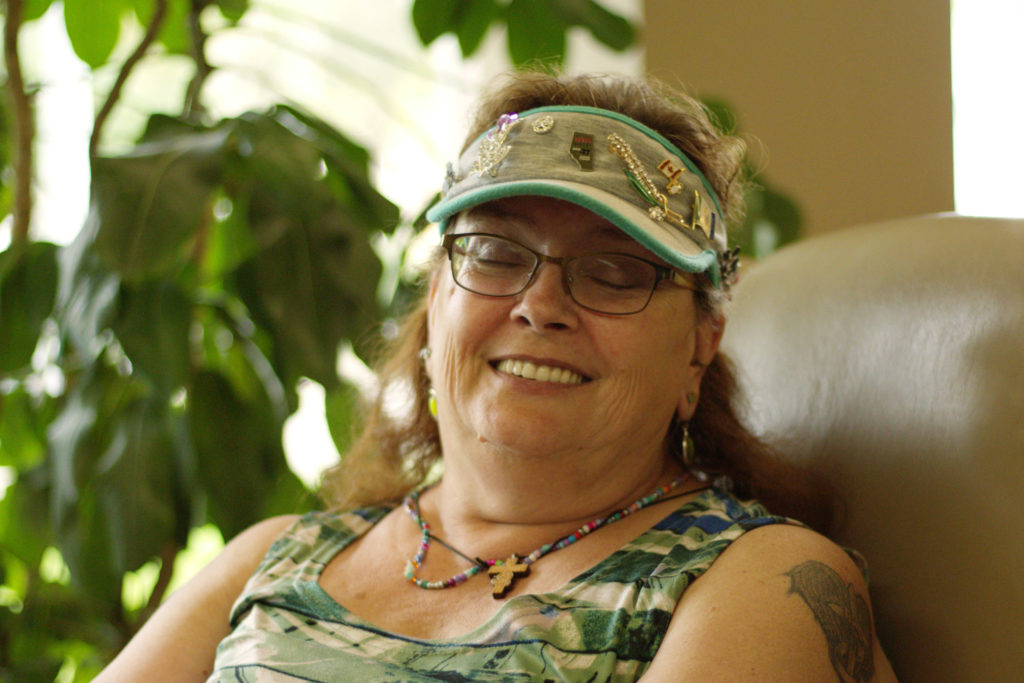
B: So I take a Bernice day once in a while where I have no calls, nothing, and I just go for walks or sit or whatever. It’s Bernice time! My dad told me when I moved up here he said to me, “You know Bernice there is no shame in having a nervous breakdown.” He told me he got better from going to groups and listening. Listening! You don’t say, you listen. And I’ve started to do that myself too because I get to learn how I am not alone with my problems.
L: Thank you so much for sharing that with me, Bernice.
B: Yes, it’s good to talk about it because it gets easier each time. I am glad you guys came! And I’m glad Gladis said that there were people coming and they wanted to hear my story. With a lot of help from my family and from this senior society and all the resources they have givem me, I am so much better now.
To read more stories, visit: Hello Lumen Series
David
This interview conducted by Yesmine Elloumi and Jersey Manabat of The Lumen Series in partnership with Operation Friendship Senior’s Society.
March, 2020
L: You were telling me about how you have some relations with The Mustard Seed. Do you want to talk about that? I wanted to hear more about your experience.
D: It’s about an 11 years’ relationship. It started as me going for coffee there because it was a safe place to go and so I became a regular. I got to know staff quite well and one day the person runs the e-closet was sick so they asked for a volunteer. I was bored so I agreed to doing it. That’s where it started from that moment. I took over the E-closet and they liked how I worked so I did it as a volunteer position for two years. I didn’t know anyone on the streets when I started but after two years, I knew everyone.
L: Were you from Edmonton before?
D: Oh, I was born here but I came from Kelowna. I went through a divorce and came here to start over because in Kelowna there’s no work, right? When I moved down here eight years ago that’s when it was booming. Roger’s Place, etc. So, I came down here and got a job at The Pearl, a high-rise at the end of Jasper Ave. It’s luxury living. I worked as a concrete former for the full summer until the end of the position but, I didn’t make enough for Employment Insurance (EI). I had $640 and they wanted $700. 60 hours… one week short of EI. So that was my downfall. There was no other work coming out too. I had to give up my apartment that I was living in because I couldn’t afford rent and just ended up staying at the YMCA in downtown but that closed now too.
L: The YMCA offers overnight housing?
D: Yeah. $35 a day and I was able to find daily work at The Bissel. They paid me $60-70 a day so half of that covered my stay at the Y. So I did that until the jobs ran out at The Bissel and the basically I found out about other places to stay soon after like the Herb Jamieson, The Hope Mission.
L: What was your experience with those places?
D: It was devastating. I remember when I was young and I used to drive by The Hope and see the people out there and think, “Oh jeez. I’m glad that’s not me.” I felt sorry for them, right? I just couldn’t understand why there were so many homeless people in such a big city. Like where’s the money? What’s the problem?
Housing here is really hard to get into. You either have to have addictions and if you don’t, you don’t qualify for housing here. 90% of the housing is affordable for people who are on AISH or barriers and I wasn’t on nothing, right. I managed to get manic depression when I first found myself on the streets and I tried to commit suicide. That was just a downfall in my life. I had nowhere to go. That’s when I found the Mustard Seed and started going to bible study. The more I believed in him and stuff like that, doors started opening. The Mustard Seed came to me and asked me, “Hey Dave you’ve been doing a great job around here. Do you know we have housing?” and I was like, “No way!!” because I was turned down by every housing project in Edmonton because I didn’t have addictions. Even Alberta Works wouldn’t help me out when I couldn’t find work because I had no issues.
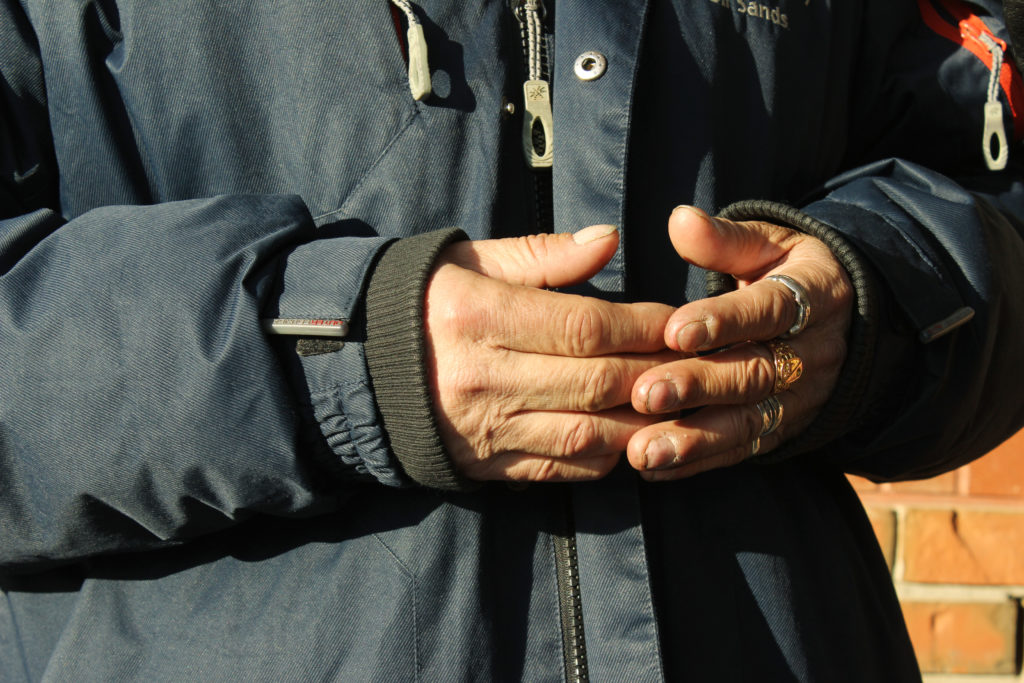
L: So, they assume if you don’t have “issues” like an addiction or a medical condition, you can fend for yourself.
D: Pretty much. After my divorce, I was 45 years old and I figured I could do it all again. I had given her everything and I came here to start all over and I couldn’t do it. I just couldn’t afford to do it on my own.
L: So why did you stay?
D: I stayed on the streets most of the time. I stayed on the backstreets of The Mustard Seed right next to the yellow garbage bin. I volunteered for the Seed and part of my job was to take the trash out so I had the key to the gate around it. I borrowed the key- I told them I lost it- but I borrowed it so I could get into the gate at night and it was like security. I would go in there at like 1 AM, lock the gate behind me. All cardboard on the floor so I would set them up like walls and light up candles. I would get my blankets and pillows from e-closet because I ran that too. I found a way with what I had. No one ever found out. When the Seed offered me housing I was firstly, in shock. But then I realized I had to lie because I don’t have an addiction and the place was a harm reduction program where you need to have an addiction to live there. So, I just told them yeah I have addictions. I smoke pot, I smoke cigarettes, I’m addicted to caffeine. We all have addictions.
I remember when I went to apply for Homeward Trust the lady I spoke to told me, “It’s guys like you who fall through the cracks. Where you need housing but you don’t have physical or mental health issues. But, you just can’t do it. You can’t keep a full-time job and stay homeless. How do you do that?” And it’s true how could I ever do that? Where would I shower forget the fact I need to be dressed well. I would get off work at 5pm- that’s when people are having dinner at The Hope or The Seed… by the time I got downtown, I’d have nowhere to eat. So, all the money I did make went on food, cigarettes, candles and stuff like that to survive.
Most places stop serving dinner by 6 or 6:30 PM. Some weeks there are only like 250 people a night to feed but then some other weeks it’s just like bam! 500 people a night looking for a meal because people come out of the bush, the cold or the rain. You guys don’t see half the homeless. Most of us live in the river valley, high level bridge, Millcreek ravine, and a bunch of other places. People find thick bush to camp in but you always gotta be on the move or else the police find you and you get evicted.
L: Did you ever have to live in the bush or did you always stay outside the Seed?
D: No. I chose not to live that way because there were just too many bugs, lots of bed bugs that people would bring into places like The Hope. Being from Kelowna I would never see that until I found myself here. Whenever I stay at the Hope Mission it is bad. People are scratching everywhere and before you know it you start scratching too. It’s a pain in the ass. And all the low-income housing you see around this neighborhood? Totally infested. Cockroaches, bed bugs, you name it. The Hope has a new program called “deterrent”… so what they do is they make it uncomfortable for you to stay there to force you to look for housing. They use biochemical substances like grey insulation fibre used for housing. They pump it into air conditioning and these fibres just cover me. You can see them on me and they are so itchy. Especially for people who come in and are on crystal meth because they have really sensitive skin and so they take off when the deterrent system comes on. Especially when the Red Alert seems to be looking for someone who ripped them off, the Hope turns on the deterrents to push out anyone high off crystal meth that could be who the Red Alert are looking for. They want to push away trouble.
L: Who’s the Red Alert?
D: … you’ve never heard of the Red Alert? Really? It’s the only street gang here. They’re well known. No colors really.
L: How do you know if someone is part of the Red Alert?
D: You can tell. Usually they have a tattoo on their neck that says RA… (gets quiet).
L: Back to the deterrent system, why do you think it happens?
D: Well to push people to get their own housing, right? And there’s only so much money, right? And now with only how many services available like Rapid Exit, there’s Pathways, Homeward Trust. They usually only help people who are on AISH and to be on AISH you have to have physical or mental problems so you cannot work. You have major addictions or something so they give them $1600 a month and they get put in these houses and they get services like from the Mustard Seed, you get harm reduction services too and security. They get you meds, they do your income tax. Whatever you need.
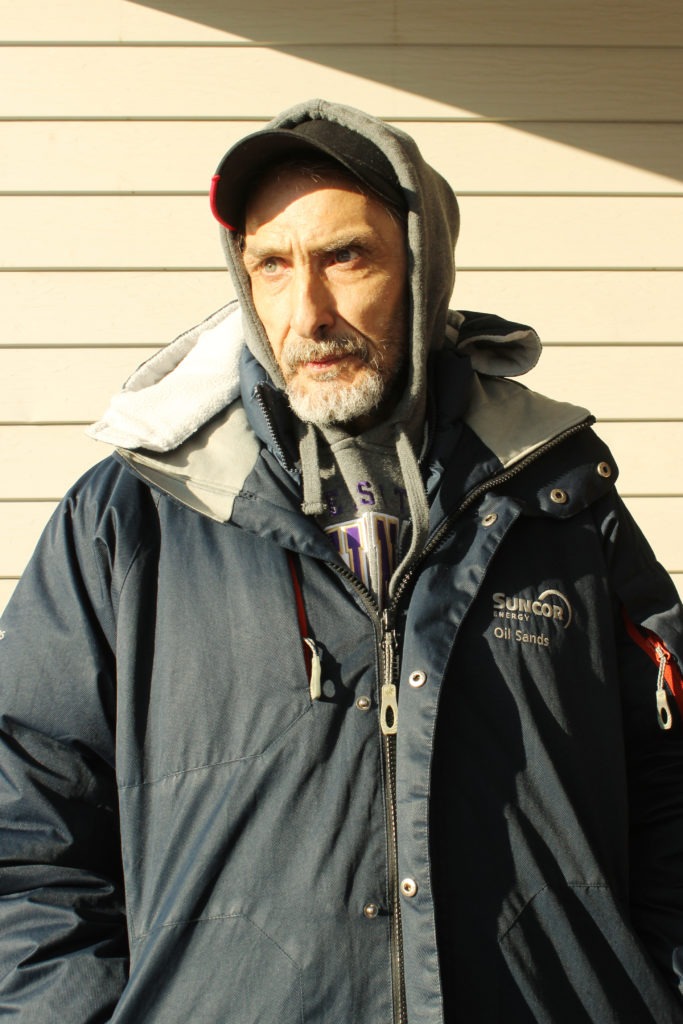
L: So you got to stay at the Seed for a while in their harm reduction housing program but you didn’t have any addictions at that time. Can you talk about that experience with me?
D: Biggest memory was probably the conduct. There were no rules, no curfews. Just couldn’t have a guest over after 11 PM. All type of things would go on you could hear people screaming, fighting, I mean I got evicted because a guy came into my apartment and stole $40 off my counter and I caught him. I confronted him and long story short he lied about stealing and I punched him in the head. They called the cops and charged me for assault and I had 24 hours to move out. That’s the one other rule they have in these harm reduction programs I guess- no violence whatsoever.
L: So that cost you your place?
D: Yup, it did. And he’s still living there.
L: So where did you go after that?
D: I’m right here. I’m homeless again. I have mental health issues, specifically I got diagnosed with bipolar disorder and schizophrenia. Three different psychologists said the same thing to me just this last fall. The manic depression I had before was because of my divorce- from having a wife, kids, job, and home to suddenly having nothing. And trying to start over again and finding that you can’t. It was just too hard I couldn’t do it. I tried and tried to get a place and afford a damage deposit on my own. Rent, a vehicle, all that.
L: Where do you go to get your medications?
D: Eastglen Clinic is where I have my family doctor, Dr. Ketano, but it was at the Royal Alex hospital where I was taken in by emergency because I was a harm to myself. There are reasons why that happened because it was around that time that I found out about the deterrent program and they did it to my apartment before I got evicted. I miss that apartment. Everyone said I had the best apartment because I took care of it. And I’m Christian so I had pictures of The Last Supper, I had crosses, I had pictures of the Lord’s prayer, Psalms 23, footprints, and people who would sit there and read it and they would feel comfortable. Patrick Garett (priest) would come to my apartment and we would sit for half an hour and talk about the religion. He got me more comfortable with myself and told me there is hope because well, I gave up. I really gave up.
L: Do these new diagnoses that you’ve received in the past year help you qualify for any assistance or housing?
D: Yes, it does. It qualifies me to be on AISH! But I screwed up. I applied for it, but missed my meeting for my intake. Anyways they soon sent me a letter saying I didn’t qualify. Why? Good question. So I had to write to appeal it because my family doctor Dr. Ketano insisted. He said I should be on it given my mental health issues. So after the appeal I had a second intake meeting and they were going to “OK” me but it was August 5th it was my birthday. I went upstairs and shared a beer with some pals and I had the meeting at 3pm. One beer led to another then another, I lost track of time, next thing I know I got home and I was taking a shower and it was 2 PM and I got out and I thought my appointment was at 4 PM. I got a call asking where I was and although I was on my way the lady was short with me, told me she was going to reschedule it. I asked her when? “I’ll get back to you” she says. And that was that. And then I phoned in on the following Monday asking for an update and she tells me, “We’re abandoning your case because you didn’t show up twice.”
L: Irony! This program is for individuals who are facing adversity due to different barriers in their life be it housing, physical or mental health…. so…
D: Yeah. I can’t get my meds either now because the pharmacy needs an address for billing and I don’t have one.
L: When is your next appointment with your doctor?
D: When I make one and I haven’t yet because… I don’t know. I don’t want to rely on pills to make myself feel better. I’ve lost so much weight too since being on the streets. I know I’m at risk for infections, I know I have to be careful. I come here (OFSS) for food because it’s not bad here.
L: Do you have any memories of your time here at OFSS?
D: Not really, I only started coming here and I’ve only been on the streets for about nine weeks. I knew about this facility when I was housed but I didn’t visit it back then because I was with the Seed. I would volunteer at the Seed would go to the PAC (personal assistant centre) every day at 11 AM and although I volunteered they did help me out at times. I would deal with the men who would come in looking for steel-toed work boots. A lot of people are scared of homeless people because they’re pretty hard core. You gotta be like that to live on the streets you know, kind of rude, rough looking. But to me, I knew them. I know that deep down they’re like a little soft toy, they’re nice guys. That’s what I enjoyed the most. Taking those guys, giving them work boots, not seeing them for a couple months and then when I saw them again I would ask, “What happened man?” and they would tell me “Oh fuck, man! I got a job, got an apartment. Thanks to you, honestly. I only had a day to get the gear I needed cause Diversified wanted me to start right away and go up to Fort McMurray and start cleaning up for the whole summer.”
Eight of them came like that, all from Diversified, and I got them all working with the gear they needed. It felt good.
L: What are some of the lessons you’ve gained to help survive living on the streets?
D: For one, the streets help out the streets. There are good people and we help each other. Give each other some laundry soap, things like that. Second: don’t lose my temper. Cause if you do, you get kicked out of these places. When people violate you? Suck it up buddy! Two wrongs don’t make a right.
L: How do you protect yourself or avoid conflict or harm from happening to you?
D: You stop them by giving them a shot in the head and tell them if you ever do that again…
L: So don’t lose your temper in the moment but find another time to state your boundary?
D: Pretty much. Like don’t lose it in the moment, don’t lose it over $40. Ah, it was tough. Because I don’t have much money, you know? These guys are on AISH and they’re out of their $1600 three days after payday! Whereas I would live so frugal, I would buy some weed for the month and I ration it out. Helps me sleep. I had a nice crib I would just study the bible.
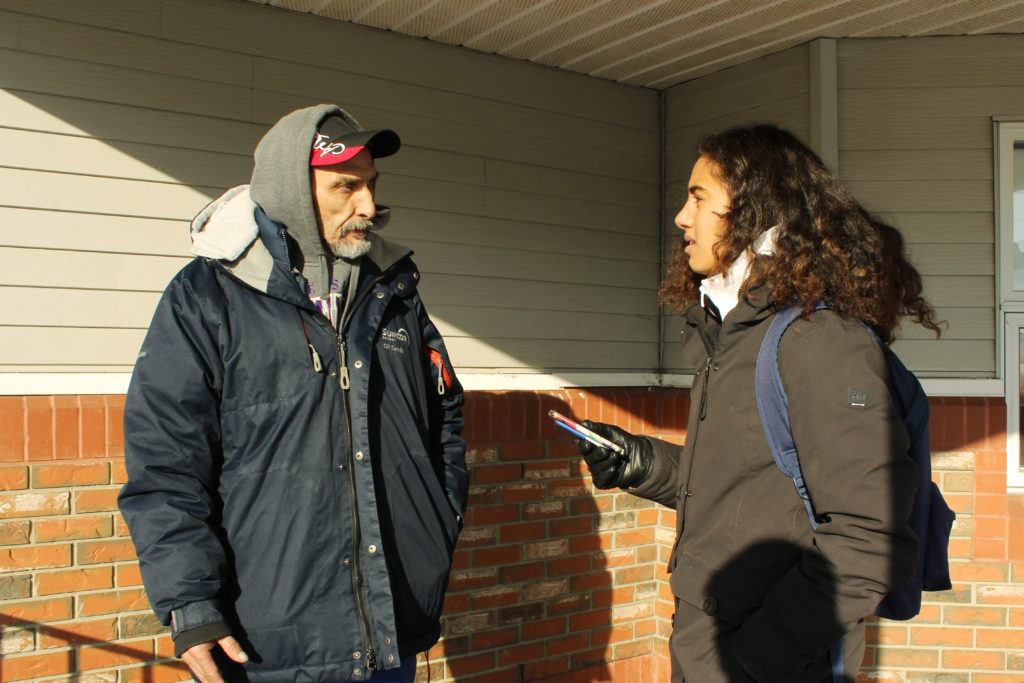
L: Have you asked OFSS for housing?
D: Yes, but uh, no. I can’t live there. Have you ever seen upstairs? I couldn’t. I can’t live with other people. The last three days I’ve been staying at the Hope or at the hospital. You just walk around and find places. Downtown in the city you can find vents in the back-alleys kind of around apartments. You sit there, keep warm. Just pick a good alley. But there are more stabbings and killings in Edmonton than in all of Canada. I just got robbed two weeks ago in city centre. Sutton Hotel there. It was 6:30 in the morning I had just gotten out of the Hope- they kick you out at 6:30 AM, right- and headed over to Timmies. That’s where everyone goes cause it’s the only place open on Jasper Ave at that time. So, I went through the Sutton Hotel cause it’s warmed and soon enough two guys came out and one of them just suckered me, gave me a huge black eye, and they stole my bag. My two phones. They knew I had phones, they saw me at the library using them. They see me leaving my phone at the charging stations and they go over and they check out my phone, see what I got, and keep tabs. I had an iPhone X, a Samsung Mini 3, and a tablet, all in my pack. So the Sutton reported the robbery but I didn’t. I just took the beating and carried on with my day.
L: Do you think you would have done that if this happened to you ten years ago?
D: No because I was married and I was a professional man and I worked, sleep, hung out with people who didn’t do drugs, my wife and I we didn’t drink. You know. Had a normal family. Two kids.
L: Do you mind if I ask you questions about your family?
D: Uhhh, sure.
L: Do you see your kids?
D: No. Because of where I am right now. I wouldn’t want to put my kids through that. Would you? One minute you’re their provider for 13 years of their life then all of a sudden to see their father on the street, depressed, I don’t look the same. I’m much skinnier. I’m not as outgoing. Stuff like that. They would feel it and it would hurt them. Right now they know I’m here but I tell them I’m working up North and that’s what I used to do. I caught my wife sleeping with another guy… and I assaulted him, almost killed him. I got sentenced, charged, did some time. That was the end of my life, when I opened the door and seen Stroker with my wife. I did my bit, got out. It took me seven years on the streets to get housing through the Mustard Seed who I was with for the last five years and then it just took one guy… I’m still rattled. I look up at God and I ask, “Why me?”… it’s a learning process.
L: Do you have any goals for yourself?
D: Yes! To get off the streets. To get into those condos down at the very end there. They’re new ones they’re $850 a month with no harm reduction, my kind of life.
L: What do you think would help you get there?
D: A miracle. Okay well first of all, getting on AISH because that’s one of the building’s requirements they want people on AISH or barriers, that have steady income. They don’t want people with drug addictions. They want a criminal record check and they want the last three places that you live. I’ll give them a reference from the Seed. But I don’t know what else to give because in Kelowna I had a mortgage like, what do I do? Give myself a reference?
L: I hate that like seriously how does that make any sense why would you ask for information that makes no sense? Asking someone who was living on the street for three past residences? I don’t know, the street??? It’s good you have the Seed to write you a letter.
D: Yeah. But I will say that with the Seed I was also able to build a lot of street cred. I would volunteer with the e-closet so I would give out a lot of clothes to homeless although I was homeless myself. It felt good. And when staff was busy? I would sit with anyone who just wanted to talk, wanted to know how I was doing fairly stable. I would just tell them that they just have to keep banging on the door. These guys would all be denied AISH too.
L: Yes, yes. And I hope that you keep banging on AISH’s door to get the support you deserve.
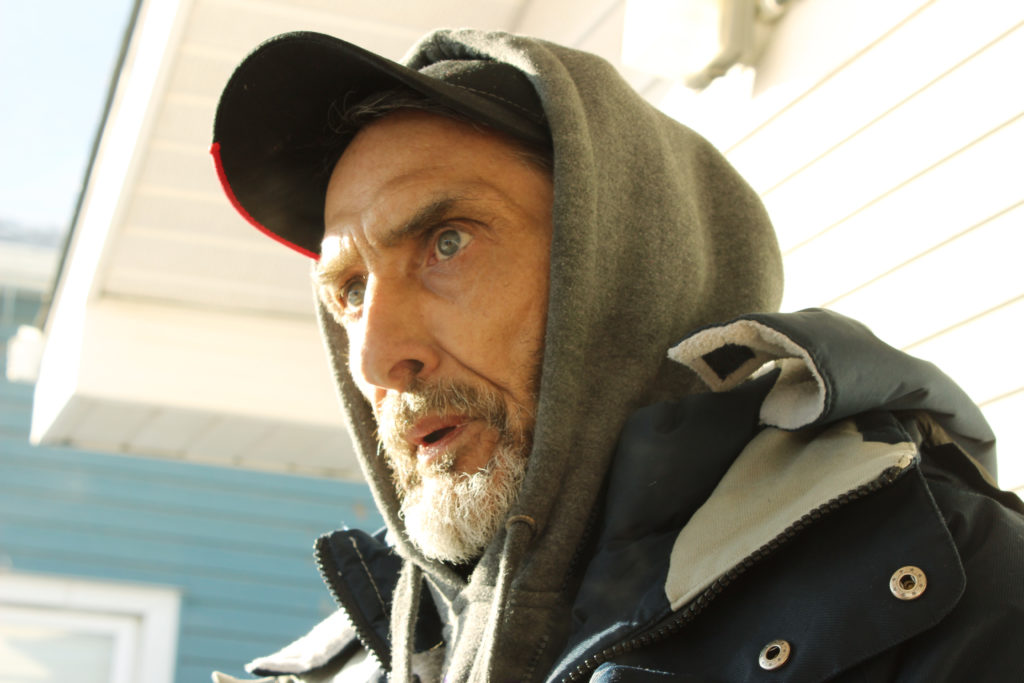
D: Yeah … (chuckles). I don’t know where to start. Here I am again. When I got robbed they got my wallet and all my ID, right? So they got everything. That phone was everything it was my connection back home to my kids, to everything. No one knows how to get a hold of me, nobody knows. I don’t go and tell my family that I’m homeless because shit would hit the fan because I was always the good one, I had a job. Just so different from who I was in Kelowna. It gets to that stage where I question if I still want to stay here because it is so bad… I don’t have no friends except for the people on the street but they all have addictions or stuff like that. And since losing my place at the Seed… I had 24 hours to leave to no where and that really hurts. You get hard, you build up walls, you stop caring about personal items like furniture or stuff like that. You don’t build up a nice crib because you know that it can get taken away from you any day just like what happened to me. Right?
L: That is so difficult… it’s hard to build a life when you’ve been through so many hard experiences that have only taught you that it’s going to be taken away.
D: I have a hard time trusting anyone. Even a nice place like the one I want to stay in. All it takes is for me to slip up once and you’re out. Just like what happened to me at the Seed
L: It’s like a trap. I’m so sorry.
D: Yeah, I think they also kind of just wanted me out because they knew I didn’t have any drug addictions and so they wanted to replace me with someone who did. And I did laugh at some of their programs… Life Skills programs. I’m 58 years old and it’s really hard to have a 25-year-old tell me how to manage my money. I had a mortgage when I was 19 I paid off a house when I was 25 and then put two kids through high school. What about you, lady?
L: Interesting. So, one of the challenges that people should think about is if you’re going to have programs for people who are facing adversity like poverty and homelessness, the person that’s leading it should have things in common with those being taught.
D: These services are good, they put up with a lot of shit here. All I gotta say is that the government we got right now should put more money into housing. Just go look at the pinters down town. I wouldn’t take my kids shopping down town. Nothing happens! Cops just drive right by them and a guy is sitting there pants half down, urinating on the street. Why do you think he’s pissing on the street? Cause no one will take him in to use a bathroom because he’s homeless and he’s high. But he’s still a human being! Right!
To read more stories, visit: Hello Lumen Series

Marjorie
This interview conducted by Yesmine Elloumi and Jersey Manabat of The Lumen Series in partnership with Operation Friendship Senior’s Society.
January, 2020
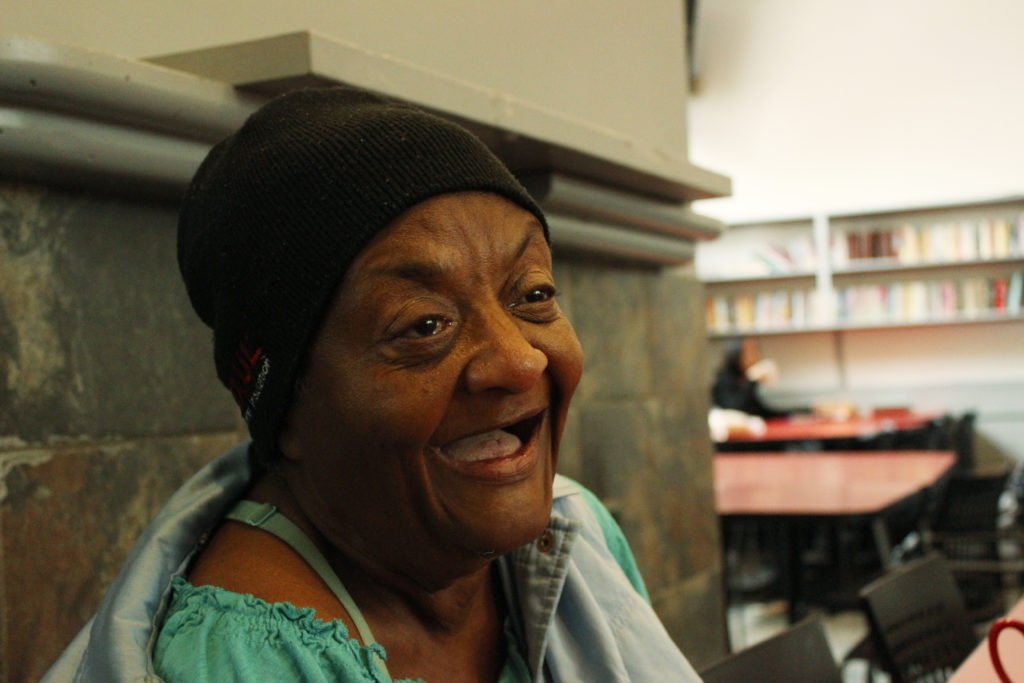
L: Finally we get to talk to you! I think this is the second time I’ve asked you but I think you just had to get to know me, right?
M: (laughs) Yes!
L: Tell me what you were like when you were young?
M: I did a lot of things. I did the circuit with Royal American Shows. My girlfriend and I she was a truck driver and we would travel across Canada and the United States. We had a lot of good times, we met a lot of people. The circuit is like the Klondike Days that they have here in Edmonton but it’s a travelling carnival. We would set up rides, help people ride the rides, then unload them and carry on to whatever was our next destination!
L: What were some of the best memories from that time?
M: Well, ahahah. We met a lot of different people, I did a lot of different things…. I got to meet my dad! Uh, I didn’t know it was my dad. I worked for him and during our travels, he knew some things that I knew, so I sort of put it together but, he never really said he was my dad…. So one day I thought I should just go up to him and ask him, “Hey, are you my dad?” and he told me, “Yeah!” (laughs)
L: What! And that was it?
M: And that was it! We talked and we became really close. Then he went back to Miami and he stayed there to open up a club.
L: Did you hold any type of resentment against him because you had to muster up the courage to ask him?
M: Oh, no! No no no. It was just like talking to any body. I was curious, I just had to know! His name was Rosco. He was friends with a lot of artists so I would accompany him to his friends’ shows.
L: Oh wow, that is special then. So were you born in Edmonton?
M: Yes I was and I’m an only child. My mom was a little lady with a very soft voice. My dad- he had a voice like a lion, you knew when you were in trouble. I’m more like my mother, though. I have a soft voice like her but then on the other hand she wasn’t around much when I was young. She was in the army for a while and so she gave me to her best friend when I was little. In the meantime, I took the place of their son who had also joined the army. So when I became 40 years old, I went to Vancouver to meet my mother for the first time. It was fantastic! She was living in a retirement home and my friend had driven to Van with me to accompany me. I walked into her room and said “Hi mama!” and right away she knew who I was! And you know what? She hadn’t seen me before but she knew what I looked like. Then after that encounter she moved from Vancouver to Westlock so she could be closer to me so every weekend I go there on the GreyHound to visit!
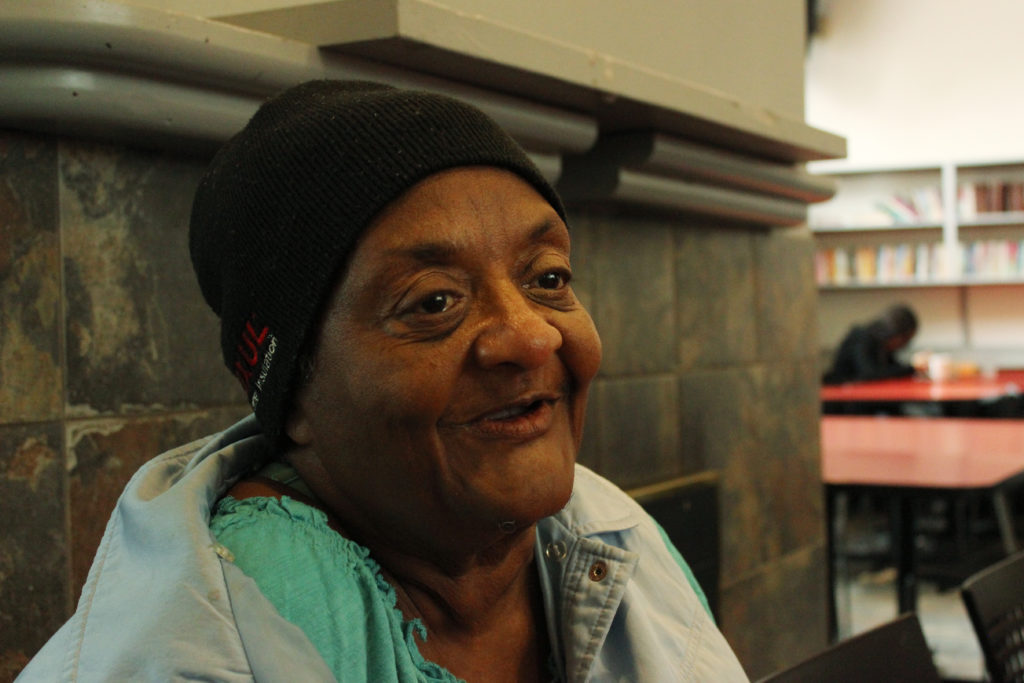
L: What was your favourite thing to do with your mom?
M: Just sitting and talking. She wanted to know about my family, my kids. She’s met all my children when she’s come to visit us here in Edmonton. It’s always happy times, good times.
L: So then tell me about your kids.
M: I have four kids. One passed away in 2002. I have a son and two girls. They all live in Edmonton and they all have kids of their own. The one girl’s son lives with me and so my daughter comes to visit us when she can. I live in an apartment and my grandson he’s always treating me as if I’m a little girl or something! He asks me, “Where are you grandma? Why are you late?” If I’m ever late, he sends all his friends out looking for me! If they ever bump into me, they ask me when I’m planning to go home!
L: Lucky you; you’ve got a posse always on the lookout to make sure you’re okay! I wanted to go back to the time when you were travelling with the circuit. What did you do after that?
M: Well after that I worked as a bodyguard for a lady stripper. She worked nights in a hotel and I would set up the table and I would watch her. When she was done, I would drive her to her house and then go home. And you might be thinking, how did I get this gig?! Well, we were previously friends; I had met her during travelling for the circuit, you see. And you don’t have to be so big and strong like what a typical bodyguard looks like. The point is that if the gentlemen would put money in her G-string then I would keep it for her while she kept performing. I would keep notes of where we were going and keep her on track. She was really good at what she did so I didn’t have to be a rough bodyguard.
L: It sounds like you two were able to become quite close when you worked together. What memorable moments seem to find their way back to you?
M: Ohhh well one of the worst times was when we were supposed to go to a hotel and be there at 2 AM but we couldn’t find it! So here we were in Edmonton, looking, and I lived in Edmonton my whole life but… by 6 AM in the morning we were still looking. So I finally had to call the hotel manager and tell him what happened and all he could do was laugh at me because he knew I was from here!
L: Honestly, sometimes people just don’t know!
M: Yeah and at night, the city looks different! It’s a different place.
L: I can’t tell what street I’m on most the times when it’s dark! I get it! You’re funny Marj! Were there are bad experiences with customers when you worked as your friend’s body guard?
M: Oh no! No! Everyone was very nice so we had it easy. We were lucky. Some of the ladies would have a real bad time and so they would hire man for body guards so they had the strength to pull bad customers back!
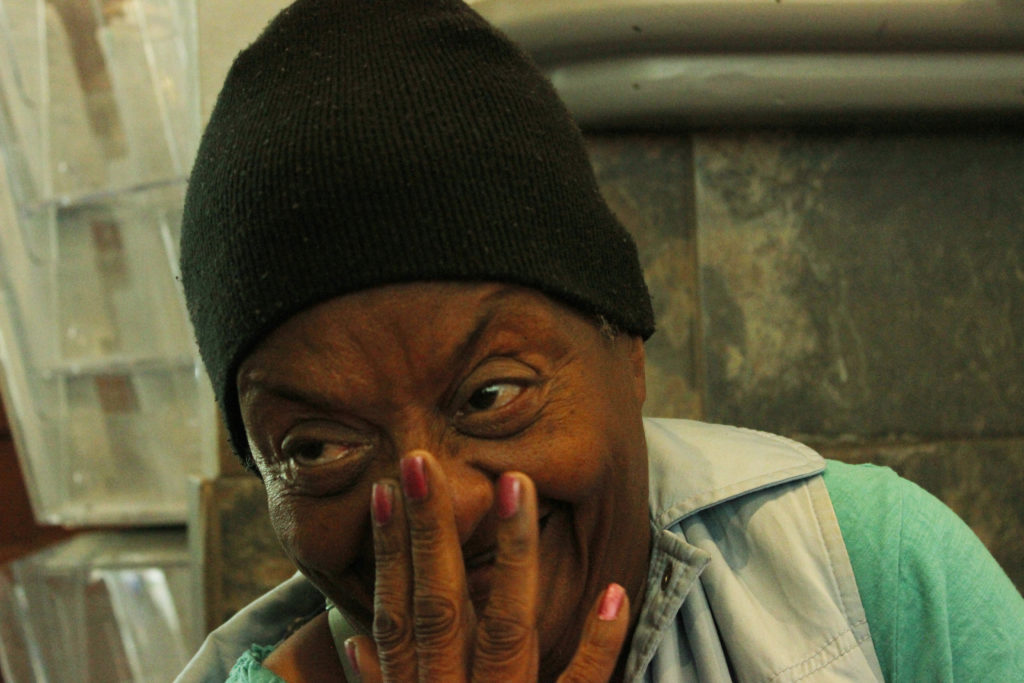
L: So you said you worked at hotels?
M: Yeah, yeah. And I could go home but for me it was easier to stay in the hotel and do my book work and keep her schedule going to know where we were going, right.
L: So was this before you had kids?
M: Yeah! When I first had kids I was 20. The man I had kids with was an oil rigger so he did shift-work. We were together for about 25 years, I guess. It just got to a point where I felt I didn’t want to live with him anymore. Most times, he would be living on his work-site but when he would come to Edmonton it didn’t feel like he was very present. After we had separated, he left me with two children and remarried another lady. And the funny thing is this new lady also had two kids of her own and they were the SAME age as my two kids and they were also a boy and a girl! It was sort of unusual… and it gets funnier, I know. So then they divorced and he got married again to an RCMP lady and by then I thought to myself, “Oh my god! You’ve got to be a good husband by now!” (laughs), and she’s a younger lady.
L: What do you think he has that gets the ladies?
M: I don’t know! (laughs) I think that he can be really charming when he wants to be and so ladies get attracted to the charm and that’s why… His current lady is more sophisticated and strong. Being an RCMP, you know she is different than the rest of us… she’ll probably be the last one. But these days I’m just happy spending time with my grandkids, I see them almost every day.
L: What do you love to do with the kids?
M: I really don’t do that much because they’re pretty old. My one granddaughter the other day she asked me for some money for her graduation so I was rushing to get her that. I try to be there when I can be there! And my other grandson when I attended his graduation at Boyle Street School he was telling everyone that he did it for me, for his grandma! And now he’s a probation officer and another is a paramedic. My best memories with them is when we’re all sitting together and they’re all talking to me about things in their life and I’m trying to catch everything they’re saying. And it’s hard to argue with them because they use a lot of computers and they study on their laptops and I have no idea how those things work.
L: What does it feel like being a grandma?
M: Oh it’s great! It’s great! You know, you get broke a lot (laughs) cause there’s birthdays and Christmas and you try to send a card with a lil’ cash on the side, you know! But it’s okay. I am writing a book actually of my life history. I got maybe, three chapters so far. I sit down and write a few chapters and then I put it away and then couple of months later I take it out and write another couple chapters.
L: What have you written about in the first three chapters?
M: Mostly about why I didn’t want to go to school and why I got married- because I hated school. Then I went back to school when I was older to finish my high school diploma.
L: Do you know which chapter will be the most important one in the book, even if you may have not written it yet?
M: I haven’t written it yet but I will tell you about it, it’s kind of unusual though. I had another gentleman that was married, right? And he (laughs) had told me how to keep a man. So we became really close as friends, whatever. And his wife was unbelievable and I would pick her up and take her shopping, drop her off, whatever. But when she realized that I knew so much about her husband and we got into quite a predicament and I said to her, “You know what, your husband and I are just friends. Don’t get all excited and crazy here.” And she, (laughs) could never really trust me because she was always worried about why I had the car but I would just tell her she’s got to ask her husband to explain that one, I don’t know why I got the car hunny! After a while she was getting on my nerves so my girlfriend and I met her behind a hotel and my dad had an old water trough and we dunked her in there and she was ice-cold! And then we drove her home and dropped her off.
L: Why would you do that?! What did the husband say?
M: I thought she deserved it! I just told him you got to talk to your wife because she’s getting crazy here!
L: So you never had feelings for him?
M: Yeah we got really, really close…
L: So what are you saying here?
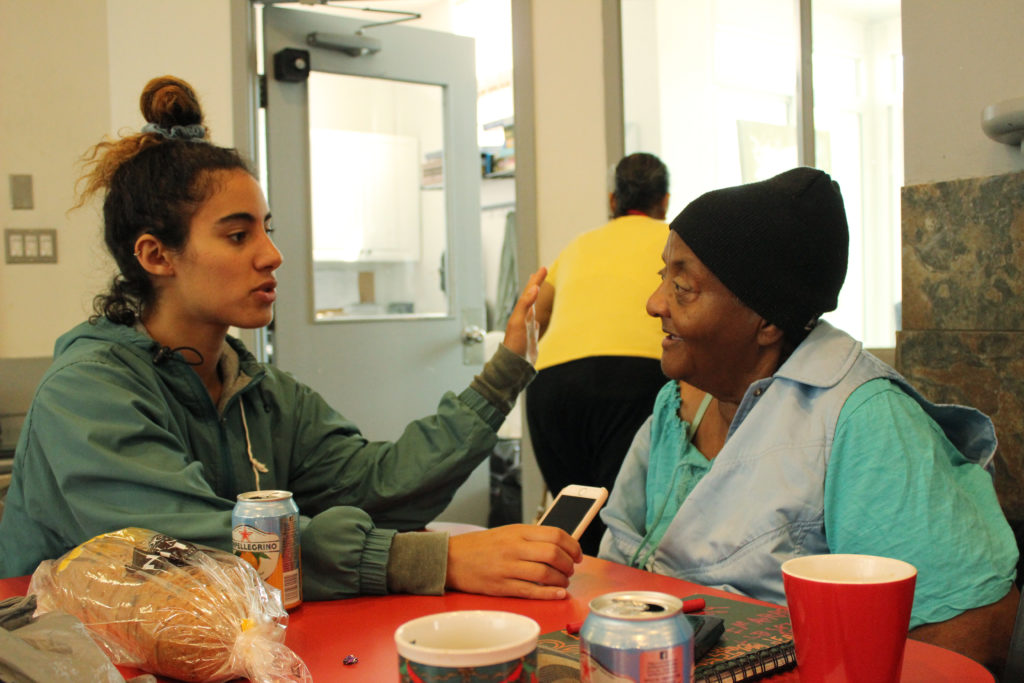
M: Well we were living together, we went to dances together- which we should have been taking his wife but he said he was uncomfortable in his marriage was the impression I got from him.
L: How did it feel like being the “other woman”?
M: Well, you don’t let yourself get all excited you just keep it on the down low. You make it clear that you’re friends. Don’t get me into your arguments and all of that stuff.
L: Did you feel like he loved you?
M: Oh I’m sure he did but the thing is it would make his wife uncomfortable (laughs). If you wanna know what happened between us in the end, well I didn’t have any choice. He went to do business in Mexico and he got killed there. That was a real difficult time because his wife was counting on me to support her. So I extended my support, told her she could call me when she needed and she just sort of got too much. She called every day so I had to put a boundary because really there was nothing I could tell her that would change anything. We both have to live with his death now. Whatever he had given me in the form of presents or whatever I gave them all to her.
L: Do you still talk to her?
M: Oh yeah. I call her once a month. See how she’s doing and she always asks me if I can come and visit. She sort of depends on me because she thinks I know what her husband thought about her in general. I personally think she wants me to tell her what he thought about her and I can’t do that. If he couldn’t tell her then I’m sure not going to tell her. But if she keeps asking I’ll probably tell her everything.
L: Wow, that is an interesting dynamic I haven’t heard of yet. Do you have any life advice?
M: Don’t get into a situation that you can’t explain, you know? If the woman wants to ask you a question, give her an answer. She might not like what you tell her but she asked you for the truth. So that’s the advice I’d give to anyone if you’re going to have an affair then you need to tell the other woman where you stand and not lead her on some story.
L: Hmmm. What about life advice in general?
M: Be careful, walk easy. Enjoy yourself, do things that you want to do but be careful at it. Don’t get into these hard things where people get all shot up and all this crap.
L: Is there anything else you want to talk about?
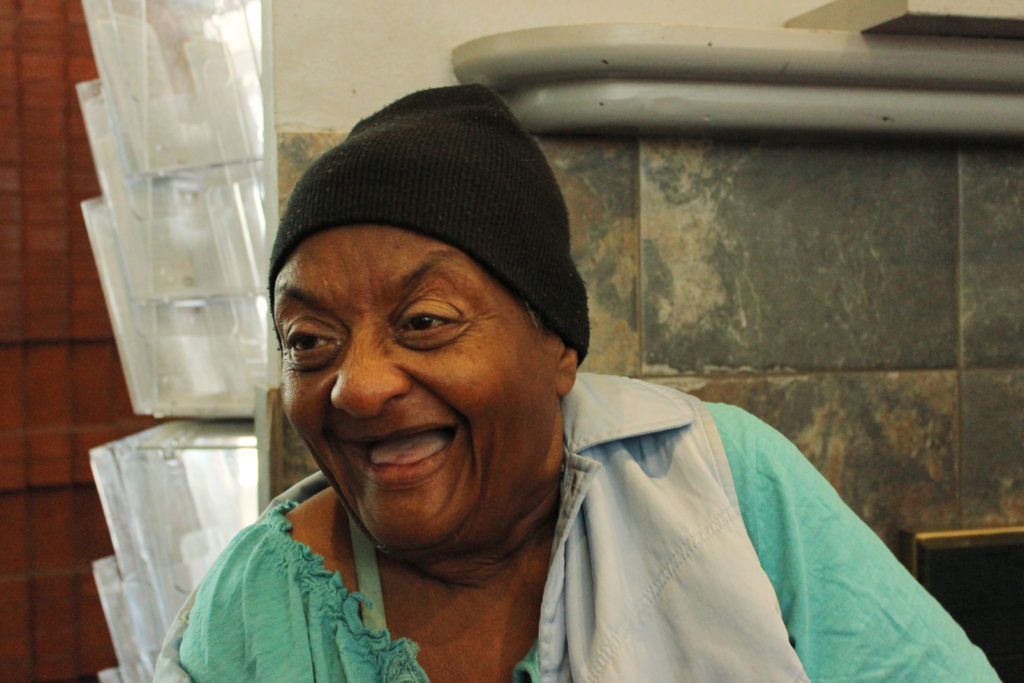
M: No, not really. I’m going on, shall I say, an “adventure” (giggles). I met this man on a bus and he asked me my name and so I told him. All he told me after was “This is my address this is my phone number, when are you going to be home?” I told him, “one hour.” In one hour sure enough he’s on the phone! He invited me over but of course I denied… but he got a job at Klondike days and this is the really funny part he knows that my kids are there so he pinned me on that! He knew I was gunna be at Klondike days and so he told me about where he’s working. And he works one section away from where my granddaughter works! I’m going to have to sneak in somehow to avoid him!! He keeps telling me about his daughter and how she has a crush on my grandson! It’s a messy situation but I learned from my past that I don’t want to partake in any of this… (laughs)!
To read more stories, visit: Hello Lumen Series

Miguel
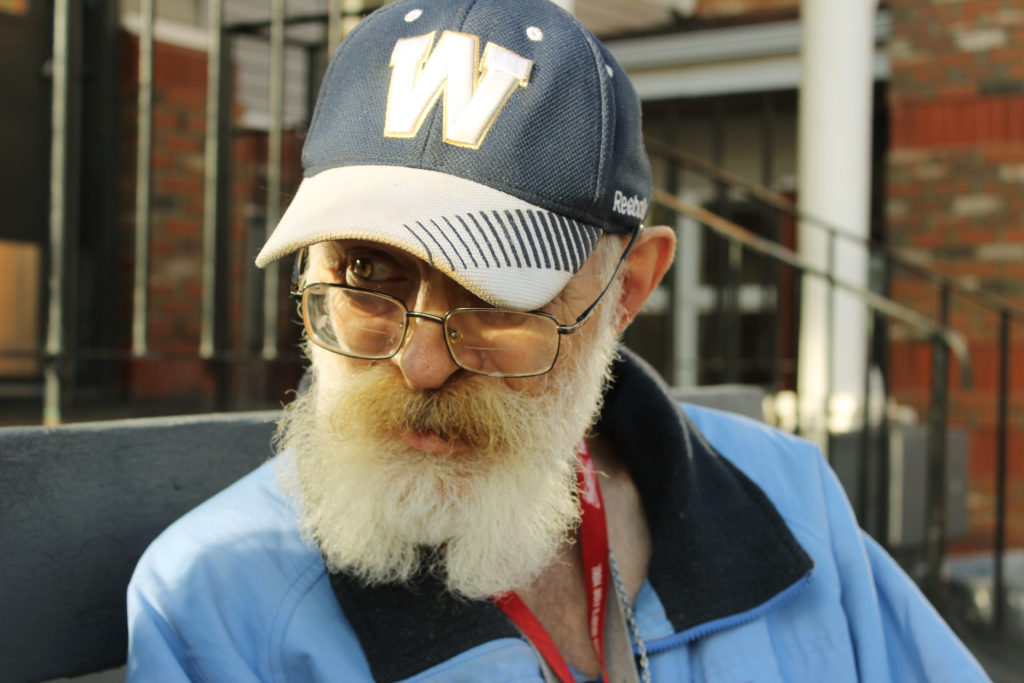
This interview conducted by Yesmine Elloumi and Jersey Manabat of The Lumen Series in partnership with Operation Friendship Senior’s Society.
December, 2019
L: Think about the happiest moment of your life.
M: When my father died. Because he was a child abuser and when he died, the beatings stopped. So that was the happiest moment of my life.
L: I am so sorry to hear that-
M: Oh, no, no! He made me a tough bastard! He made me tough, oh yeah.
L: Do you want to talk more about that?
M: I researched the roads in Canada. I was in Montreal, St. Lawrence, St. Catherine. I was in Toronto, I was in Manitoba, Logan and Maine, I was in Calgary, Vancouver.
L: This was after your father past away?
M: No, just personal research. I wanted to see what life is like on the road. I did it alone and I just turned 66 this month. You know, I didn’t even know what day it was on my birthday. I just stayed home all day. I walked out and some guy told me the date was November 6th and I thought to myself, “Really? Because my birthday was on the fourth!”
L: Did you end up doing anything to celebrate your birthday once you found out?
M: No, I just wrote. I sit at home and just write my thoughts. I wish I could have brought you one of my books. They are cool; each leaf is a new story. I called pages “leaves”. Each leaf is a letter to someone. Each leaf is its own story. So, you can read it front to back or back to front or even start in the middle if you want.
L: What kind of stories do you write about?

M: People’s thoughts. When I get angry, I write instead of swear. When it comes to my writing you know there is a lot of profanity. It’s the best way to deal with stress and anger. Judith Grant taught me. She was a therapist in BC and I was a patient of hers. She tried to get me to practice neuro linguistics because when I came to her I was mostly non-verbal. I would study body language instead of speak. I would read faces, emotions. I could tell when a person is trying to understand something, when a person is sad, when a person is happy, when a person is angry, disgusted. She wanted me to learn how to read body language along with practicing neuro linguistics. But I was too stupid then, I was around 20. She also showed me that I suffer from multiple personality disorder. I take beef energy and I subject myself to it so the personalities can keep going and can keep staying alive.
L: Could you repeat that? You take meat?
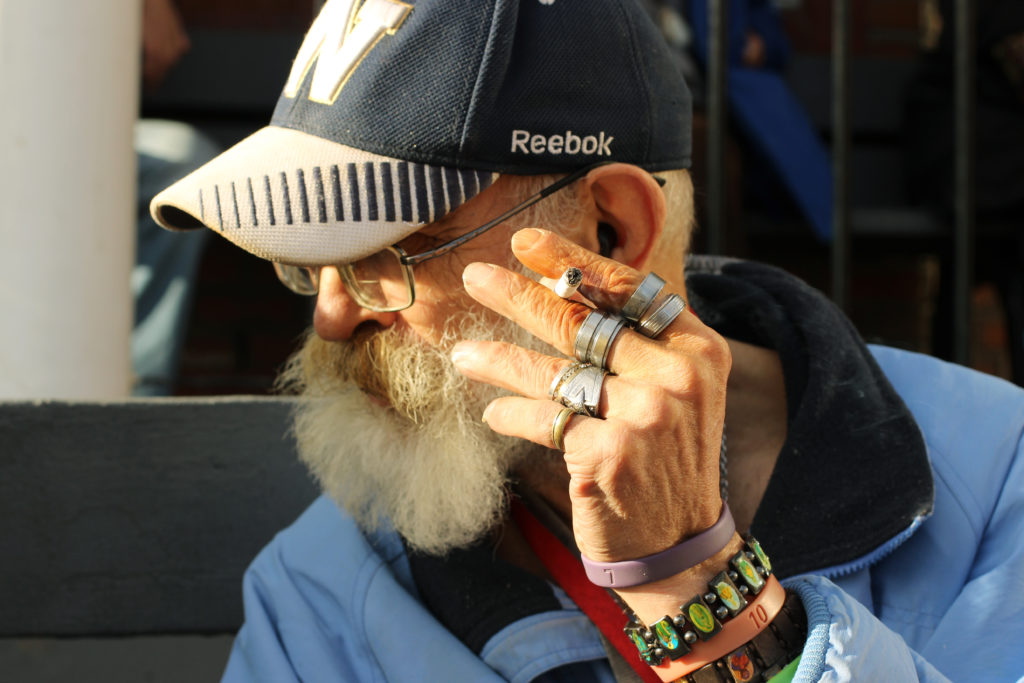
M: I take on beef energy. That’s not meat. That’s energy. I worked at slaughterhouses for a large part of my life and at these slaughterhouses when they wasted them all, I would take the energy. It’s all animal emotion. I also take pork energy. These energies feed into the multiple personalities that can live in me. It takes a certain strategy and perspective to be able to take on their energies and not let them make you go crazy. It’s actually part of knowing body language. It took me so long to learn how to understand and properly use body language. I would read an emotion on the face and I would think, “Yeah! I know what they’re saying!” but then in a minute’s time, the face might show you five, ten gestures. So you can’t read one, you have to read them all.
L: Do you feel that maybe through having an abusive father, it impeded you from learning how to understand others’ emotions?
M: I was young. I was 16 when my father abused me. I was in grade ten. I snuck out of high school and went to college to take up meat cutting. It was a six month long course but it gave me thirty years of work as a meat cutter.
L: What attracted you to the meat slaughtering business?
M: Because of my father’s beatings and the comic books I read, I got into it. I was reading creepy comic books, right? The creepy stuff seemed to fascinate me. The bones, beheadings, and the blood. And one day I was trying to figure out what I was going to do for the rest of my life so I picked up the newspaper and I looked for what advertisement came in daily. It ended up being butchering. So I thought to myself, “Sneak into college and go become a butcher!” So I snuck into George Brown College in Kensington Market in Toronto and I took up butchering.
L: Did you stay in Toronto for your entire butchering career?
M: For some of it, but I also travelled. I went to Ontario, Manitoba, British Columbia, Calgary, …
L: Where was the best place to be a butcher?
M: Calgary. Because they taught me. See, no one wanted to teach me anything when I finally ended up out of college and in the slaughterhouses. See, I was taught by German standards which means you need to know how to cut the meat, how to process the meat in the slaughterhouse, how to open up a store, sausages, – I know all of that except the sausages. Every where other than Calgary they would tell me, “Well if we teach you, you’ll open a store down the street and put me out of business! So, we’re not teaching you.”

I worked for the French Foreign Legion after I finished working as a butcher. Vous-parlez le français? Bon, oui! I shipped murderers and the guys that break the law to France. They would have to pay their own way there but once they were there, they join the French Foreign Legion and once they served five years, their records get cancelled and they get a French citizenship! That’s a good deal! But, they’re very tough there, Yesmine. I heard one day this guy came up to me when I was working slaughterhouse and he said to me, “You know, one of my guys just got out of the French Foreign Legion and he stole a car, and they used two by fours on that guy!”
L: Wait so you said you were part of the French Foreign Legion? Does that mean you went to France and you served five years?
M: No, no, no. I was here and I was sending them to France.
L: How did you get into that? From butchering?
M: The two worked together! I travelled throughout Canada and I got to know about criminal activity in Canada and I took that information to the French Foreign Legion from Canada. They have a bunch of real criminals in their army. They have thieves, murderers, rapists, and they’ll take anybody. Anybody. And they are tough on them.
L: Damn. Ok, Miguel. I’m going to ask another question now. You told me your happiest moment, now tell me about the saddest or toughest moment of your life.

M: When my father beat me. It felt bad. I was hiding behind sofas, under beds. He took me down stairs into the basement got an extension cord. That was the worst beating I got. And boy did he whip me! Oh, he did whip me. I had wounds from where he whipped me and so when I went to gym class, my gym teacher saw it and he asked, “Where did you get these?” I was too scared to tell him. So the vice principal kept an eye on me and we went to the back of the school, we lit a cigarette in public school right, and my father caught me, and he started beating me, but then Mr. Clarke the Vice Principal came up and beat the crap out of my old man! (bursts in laughter). That was a good moment! Mr. Clarke stood there looking at him and yelled, “You’re never going to beat your son again!!”
L: What happened to your dad after that beating?
M: Ohhhh, my father hung himself shortly after.
L: Oh my. I am so sorry to hear that.
M: That’s life you gotta take it in stride. You make with what you got. When you go through hard times you need to reflect on what you learned during those hard times so you don’t go through it again. Or maybe you’re better for it next time. You know what I mean, Yesmine?
L: I do. How do you think that experience shaped who you are today?
M: It made me hard. It made me hard. Like I could watch things that other people can’t watch and I could stomach it. You know? That’s from all the butchering I did. You know actually it was butchering that made me interested in anatomy and it isn’t until recently that I started to get serious about studying it. I got Kaplan and Barron’s anatomy flash cards. And I study these anatomy cards. I want to put them on the wall at home so I can keep learning about all the different parts of humans that are basically like those of animals.
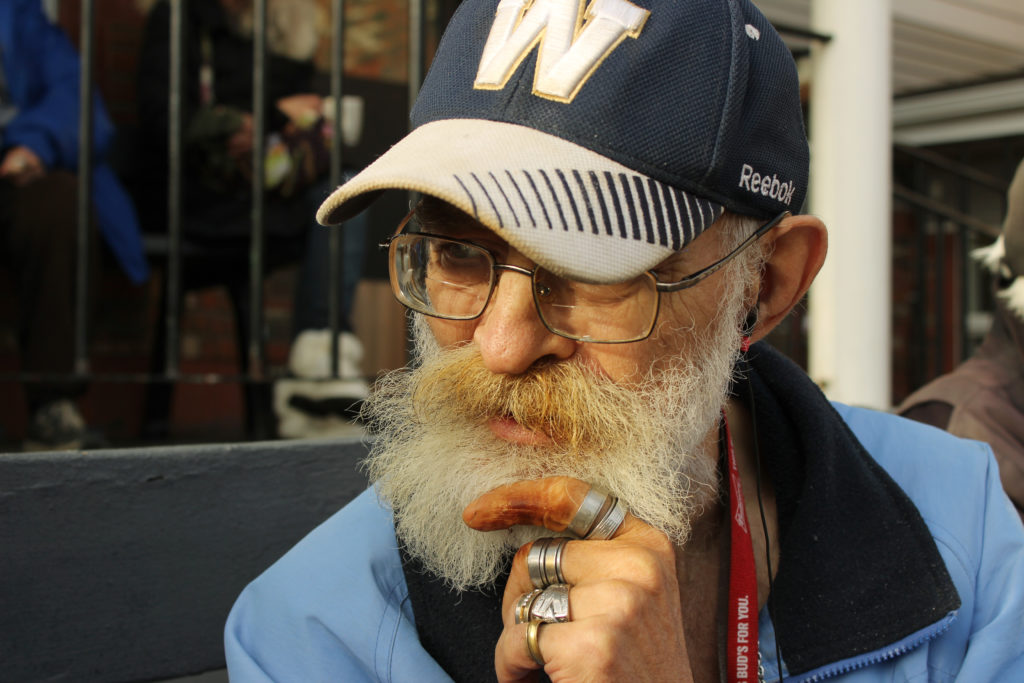
Y: That is amazing, I actually know of those flashcards! I use them in school as well. Jersey and I are students at the University of Alberta. Tell us more about what you’re doing in your day to day!
M: Well, I also practice Feng Shui. The placement of articles like chairs and others to create a positive energy. So, you see in my apartment, nothing is in the middle of it so you can have passage of energy.
L: What else are you going to do today?
M: I’m going to write. I am going to think about the beef and I will try to resurrect them. There’s so many of them though so it’s hard to keep track of it. So much beef energy has just been wasted so I’m picking it up and using it.
L: Do you eat meat, Miguel?
M: Yes, I do! Yes, I’m a carnivore. I eat meat raw but you know in small portions… you don’t want to make a pig out of yourself. But I do enjoy a chunk of raw meat. You know? I’ll eat my meat rare and chew on it like bubblegum until it cooks in my mouth. I know it sounds disgusting! But I love it.
L: What else do you love?
M: I love talking to women. I love talking to women because they’re protective. I had a friend she was so kind to me but she was also real with me and she told me that I had to treat my cat better! She made me realize I wasn’t taking the best care of my cat. She made me realize I had to learn how to take care of others after what my dad did to me. I needed a woman to protect me at those times when I was young.
To read more stories, visit: Hello Lumen Series

CYRIL
This interview conducted by Yesmine Elloumi and Jersey Manabat of The Lumen Series in partnership with Operation Friendship Senior’s Society.
November, 2019
L: So, you tell me you have arthritis in your knee?
C: Both knees. Some days I can’t even walk. It depends on the weather. When it’s warmer it’s better. I am going to have surgery on them in a few months. I don’t know what they’re going to do in the surgery…
L: Tell me about the happiest moment of your life?
C: Probably getting married to my wife. We met when I was 19, she was a year younger. We were together for two years then we decided to get married. We ended up staying together for 35 years so together for 37 years. We had four children. Lots of grandchildren. Actually, I’m from Prince Albert, Saskatchewan. My older brother and older sister moved to Red Deer and I was too young to move, so I stayed with my grandparents, but they’ve all passed on now. All my grandchildren are back in Saskatchewan too so I don’t get to see them much.
L: Why did you come out here to Edmonton?
C: For work! I had different jobs. I drove trucks and different motor vehicles… but I lost my driver’s license too. I was drinking, I was impaired. I got a DUI. It’s not good, I know that now. It was a good job. I was hoping to retire from that job. I worked there for a few years but I was let go because of the DUI.
L: That’s really tough. Why were you drinking on the job?
C: Stupidness. Well, we all did. We worked in a pulp camp up North so it gets repetitive. You start to do things to fill up the time. The boss caught us once. Then the cops did. So, I ended up in jail over that actually. Two years and a day I got but I only ended up serving eight months because I was good in jail. I was compliant and I knew I had made a mistake. I was a good prisoner.
L: What was it like being in prison?
C: It was like a hotel! The food was good. And when I left, they said to me, “We’ll see ya back here.”
L: Really? That’s what they were telling you?
C: Yup. And I said, “Oh, I won’t be back.” I haven’t been in trouble since. You know, when I went to the penitentiary, I knew about 20 people there. I was wondering where my friends were, where my cousins were. And oh, they were there!
L: Interesting. So, was that helpful to you? To have people you knew in there?
C: Oh yeah. Oh yeah. If there weren’t there it would have been much harder for me. It was my first time in jail, right?
L: Were they the same? Or different from what you expected?
C: Well, I had no trouble but I didn’t know what they did or what they were in for. No one spoke about that. You don’t ask a prisoner why they’re there. I never asked anybody either…
L: I see. That makes sense. What did it feel like when you left prison?
C: Oh, the best feeling. Even better than marrying my wife. I was a free man!
L: Were you inspired to change your life in any way?
C: No, I went to the same job. They took me back but I didn’t get my driver’s license back, obviously so I was doing something else. When I got caught before prison, I had gotten caught twice in one day! So that’s why. But anyways, I worked for that company for 11 years. It was a job in the bush and I liked it.
L: So now you’re in the city. What brought you here?
C: Uh, well. I got that arthritis in my knees. I can’t walk no more. My shoulders too. It was hard to keep up that job. I’m 69 years old now and I stopped working four years ago.
L: What have you been up to the past four years?
C: Well I was homeless for two years, I had slept in the back alleys here. I couldn’t get a place and no one could help me. I applied to welfare and employment but nothing. I ended up hobbling here to OFSS and someone who worked here saw me and asked, “Where did you come from?” I said, “the back alley!” he said, “What are you doing there?” and I said. “I’m sleeping there. Nobody will help me.” … “Come with me,” she said. So I went to her office, filled out some forms. She told me I had a place now but I was worried. I was worried because I can’t pay for anything, I can’t work. But she knew that. She was already working on getting me medical welfare. Her name was Terry and she works here at OFSS.
L: That is amazing, I’m so glad you got the support you needed. So, your experience with OFSS has been good?
C: Oh, yeah. Well I do volunteer work here now and then. I shovel snow in the winter. I live here in a unit and I help keep it clean. I am grateful to live here but I don’t enjoy it. It’s better than the street but it’s like a jail here. I got a place lined up when I … well, I’m just waiting for this place. Someone who works here asked me where I was staying and of course, I told him I lived here. Then, he offered for me to live with him! Here you need to share bathrooms, need to share a kitchen. The two guys I live with they’re pigs. They piss on the floor, they shit on the floor. I can’t use the bathrooms. I want to get out of here.
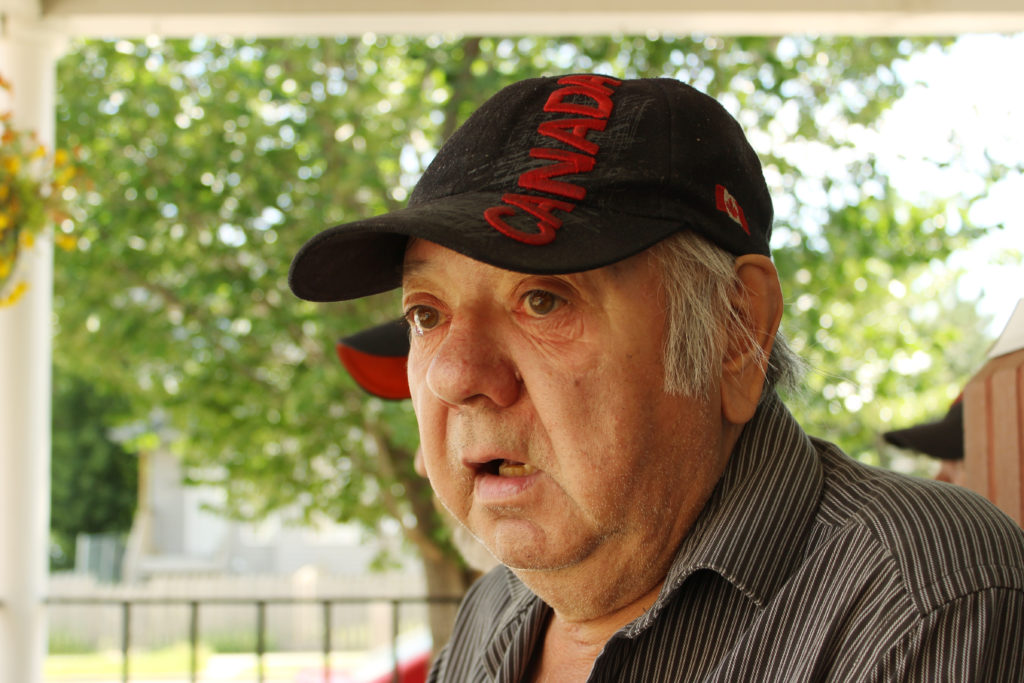
L: That’s really difficult, I’m sorry to hear that. You do have access to your pension now, right?
C: Oh yeah, I get $1844 a month, I can live off that. I pay the $500 rent every month and I got a couple of grandchildren I take out now and then. I want to start buying new clothes because I’ve been wearing the same clothes for the past three, four years. Just always waiting on the next cheque.
L: You know what our generation calls that? Self-care. Things like buying yourself new clothes or just doing things to improve your own quality of life. Because you know yourself best or maybe part of self-care is getting to know yourself better. We are big proponents of self-care! It’s so important to take care of yourself and your health.
C: Oh, I do! I like that a lot.
L: I just noticed you have a tattoo here, do you want to talk about it?
C: Oh this? Oh, it’s just covering up other tattoos. I don’t know even know what the tattoo underneath is… I forget! This eagle on top, I got it just to cover up the last one!
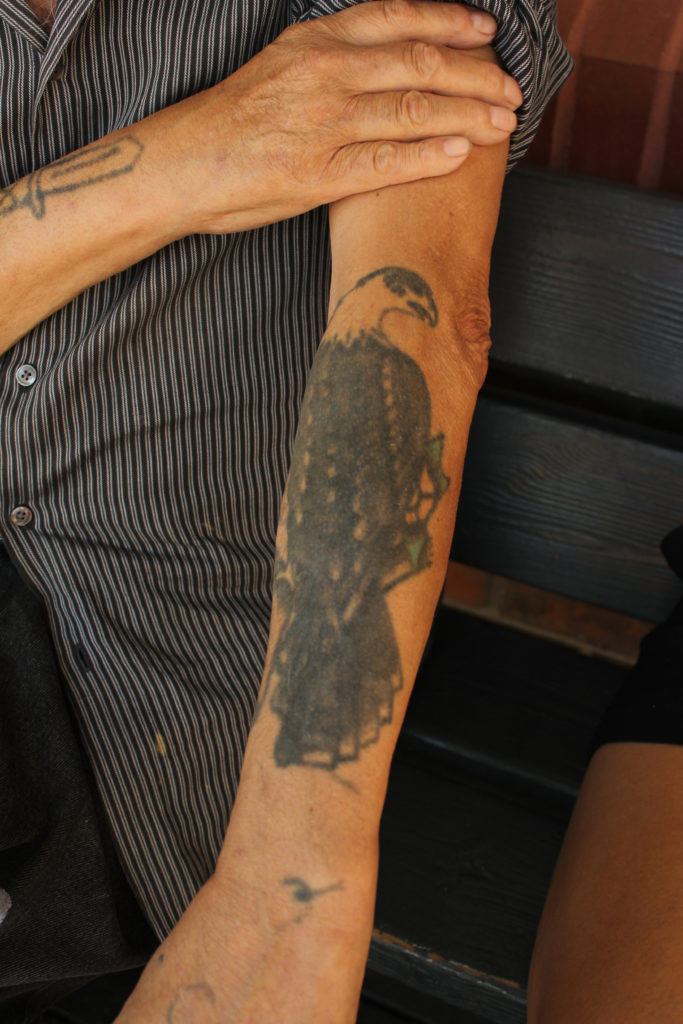
L: Why did you want to cover up the tattoos underneath?
C: Because they were garbage like this eagle one right here! (laughs). I was a teenager back when I got these. I didn’t even pay for it, we were just drinking and we started tattooing each other. I’m too old now to do anything about it.
L: We talked about the happiest moment of your life and this may seem like a darker turn, but what are some of the saddest moments of your life so far?
C: Well, when my mom and dad died. I was really young. My older siblings they took care of me but they’re all gone now, I’m the only one left in the family. We lived on a farm we have 15 acres of land and it’s all mine now. I can’t wait to go back, but I’m just waiting for my surgery.
L: I can’t wait for you to be able to go back too! Cyril, I also wanted to ask about your eyes because I noticed they keep tearing up.
C: I always got tears coming from my eyes. I’m going blind here, so things are getting blurry. I can see you pretty well. I used to read a lot but I can’t even read anymore because my eyes are bad. That was one of my hobbies. I loved to read, I am an artist, and I love to do carvings.
L: Those sound like hobbies that would flourish in a farm! Except, I really hope that you hold onto the eyesight you have now so that you can continue to read as much as possible.
C: My carving knife used to cost $150 when I bought it ten years ago but now a new one would cost $200. But, I do carve. My eyes water all the time but I am not crying.
L: Tell me about your favorite carving you’ve ever done. One that brings your pride or intimate memories.
C: I was leafing through a National Geographic book and I saw a mother goose and she had three babies. The smallest one was about two feet behind, hustling to keep up with its mama. So, I drew that picture first, then I carved it. When I got out of the penitentiary, my social worker saw it and asked where I had gotten it from. She thought I had bought it but I told her, “I didn’t buy this. I made it. That’s my hobby!” She wanted to have it, she wanted to buy it. I told her it wasn’t for sale. But, when I realized I was going to move and that by the end of long drive my beautiful carving would probably be damaged, I called her up and gave it to her. Her name is Naomi.
L: I really hope you keep carving.
C: Well, I got to buy knives. I don’t got any. It will be an investment. When I go back home to Saskatchewan all my family will be there. I have a granddaughter that’s there but I haven’t ever met her. Her mom doesn’t like me. She’s my youngest son’s daughter and she’s 13 or 14 now. I am going home soon.
L: I am happy for you.
C: I am happy too. They’ve been calling me for the past couple of weeks asking me when I’ll get there. They can’t come visit me because it’s 750 miles away, but it’s okay. I’m doing just fine. I have a lot of furniture that I’ll have to leave here when I go back but all that matters is I have family there.
L: That’s very fortunate and I hope you have the safest travels back home after your surgery, Cyril. Do you have any advice to give about anything at all?
C: Just stay on top of your life and don’t let anybody get you down. Something like that. That’s what I do.
L: What inspired you the most to think that?
C: Well, you never see me mad and I tell people that getting angry won’t make things better. Worrying makes things worse. I’m an optimist. People come to me for a little bit of advice now and then and that’s how I’ve made my friends. You never see me angry but it does depend. I got into a fight with two guys at a bar and one was on the ground. I never kicked a man when he was down but I wanted to kick him. I didn’t. I just walked away.
L: How do you find the strength to be yourself and stay true when you’re being challenged by others who may be disrespecting you or bring you down.

C: I don’t let anything bother me anymore. People can call me whatever they want, they can say what they want. I’m not a violent person except for that once that I told you about. And I was drunk at that time. I still drink but only know and then, with friends. I’m proud of myself for getting it under control but it also just got to the point that I had more important things to do than to drink.
A few years ago, when I had to go back home to put my oldest brother in the ground, I had a moment. I smartened up a bit because he was the one that took care of our family after our mom and dad died. He made sure we went to school, Herman was his name. We worked together too. One day he came up to me and he said, “Let’s go to work!” We didn’t even have a job at the time but he was persistent that we would find a job. We ended up doing construction for a building.
L: How did your brother pass?
C: I’m not sure. I think cancer. That’s what we all die of in our family. I haven’t gotten it yet but I did have a heart attack that nearly killed me. I was in the hospital for seven weeks, I was 170 pounds and then I got out on New Year’s Eve. I had lost 35 pounds. All I had was an IV in me to get the nutrients I needed. But I’m back now to my 170 pounds! I’m doing fine except for my arthritis but I have a plan for that.
L: It sounds like you’re doing exactly what you preach. Stay on top of your things and just keep going. And I’m honored that you told me about your brother. It’s so nice to hear about a special person that had a positive impact on someone’s life. It sounds like he really helped you keep growing and he’s probably always with you even today. When you go back home, you’ll probably feel his presence even more as well as the presence of the rest of your family.
C: Like I said, I’m the only one left in the family. When I was back at the house on the farm, I was all alone. The farmer next door he also kind of took care of me, he gave me a job. He needed some land cleared and so I helped him do that. He would come check on me and bring me a meal from 12-1pm. I wouldn’t have any food at home, maybe an apple and a piece of bread and he would take me to town whenever he would need to get some supplies. And we would get a nice meal. I’ve had a good life, yeah.
Thank you. It’s taken a bit of a weight off my mind, sharing my story with somebody.
To read more stories, visit: Hello Lumen Series

CATHERINE
This interview conducted by Yesmine Elloumi and Jersey Manabat of The Lumen Series in partnership with Operation Friendship Senior’s Society.
October, 2019
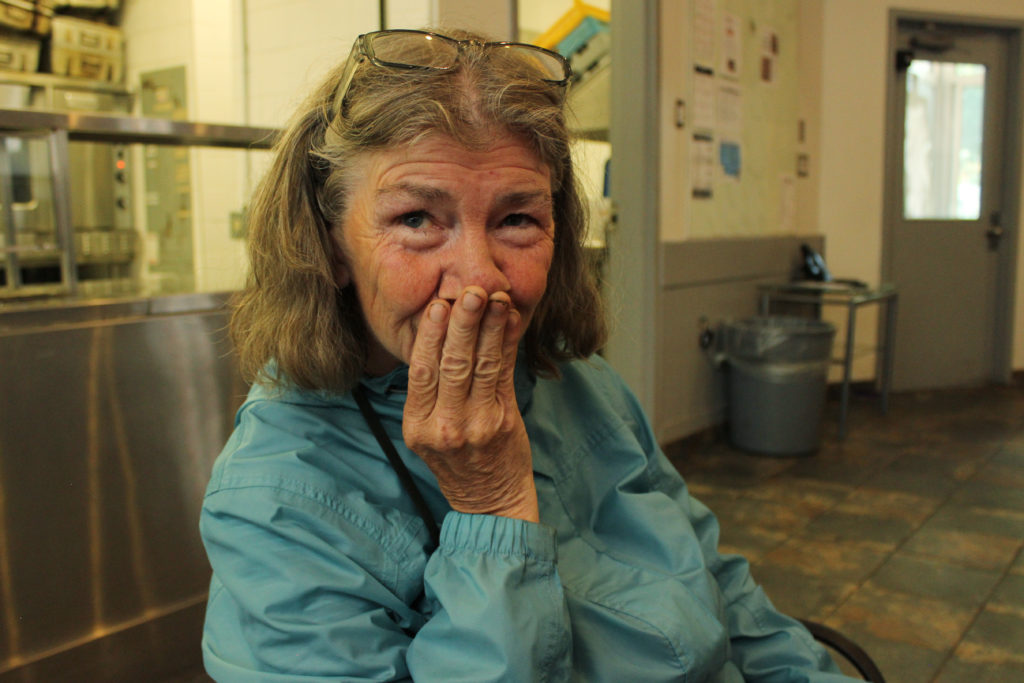
Tell us about the happiest moment of your life.
When I had my kids. Even if they do things they shouldn’t have done. “You put that back! Do you understand?” “Yes, mama” My daughter is Kristen. She is taller than me. I miss them, they live in Nanaimo. I had three children, and they were good. Oh yeah. We had two dogs. Bootsy was one of the dogs and I loved him so much. He got run over and that took my heart but that was a long time ago. He’s still in my heart. So are my parents, even though they’re deceased, they’re still in my heart.
What were your parents’ names?
Sally and Donald. They were good, they were really good people. My dad would say, “OK! It’s time to go fishing!” and I would think, “What? Now? Do you know what time it is dad?” but he wouldn’t care. He loved to fish. My mom liked staying at home and she took really good care of us. Even though they’re gone now I will always remember them and I always miss them.
What’s one of your favorite memories with one or both of your parents?
I don’t talk too much about that, I just remember them for who they are. They’re in my heart. My brother is in BC. I moved to Alberta a long time ago, when I was 25. I did it just to get out and do something for myself. I thought it was good. I decided to stay here although my brother always asked when I would come back home.
What made you stay in Alberta?
Oh, it’s just great here. Like my friend, Ray- I met up with him and we became best friends. But, I can’t seem to find him now. I met him over at the Mustard Seed and then one day he said, “I have to go!” and he didn’t tell me where he was going. He didn’t ask me where I was going. He just made it seem like we would catch up with each other on another day. I’ll probably see him probably tomorrow, I have a feeling. I’ll sit at his window and knock on it until he talks to me.
What’s your favorite with Ray?
We’re best friends. We’re best friends and that’s the way we like it. He likes to go his way and I like to go my way. (laughs). When we see each other we just talk about our day and that’s the way we like it. I went down to his place yesterday and he took off.
Well he likes to do his thing and you like to do your thing! So tomorrow when you go knocking on his window make sure you tell him, “Hey! We got to talk about each of our things to each other!”
And he’ll say, “What kind of things are you talking about?” and I’ll say… “You’ll find out when you get up! Get up now!” But no, he’s pretty good. I think very highly of him. He always asks me about what I plan on doing next. And I always never tell him.
Between coming to Alberta when you were 25 and meeting Ray a few years ago, who are some other significant people in your life?
My brothers. They didn’t move to Alberta, they won’t come this way. But there is also Linda, who is an acquaintance. She lives upstairs in pod 2 so she’s a neighbor of mine.
Do you like it here?
I don’t mind it. I like other people too, I respect other people too. You have to respect others, that’s how I was raised and that’s what I taught my kids. I’ve lived in OFSS for about 9 months. (Someone handing out popcorn gives some to Catherine and she starts to interact with them) “Thank you! Thank you! Oooh, yummy popcorn. I know you have no teeth but you can eat it! You can do it!” See, I’m always just nice to people. That’s the way it should be. Peek-a-boo! Can I see my photos now? (We show her the photos we took of her). I like these photos.
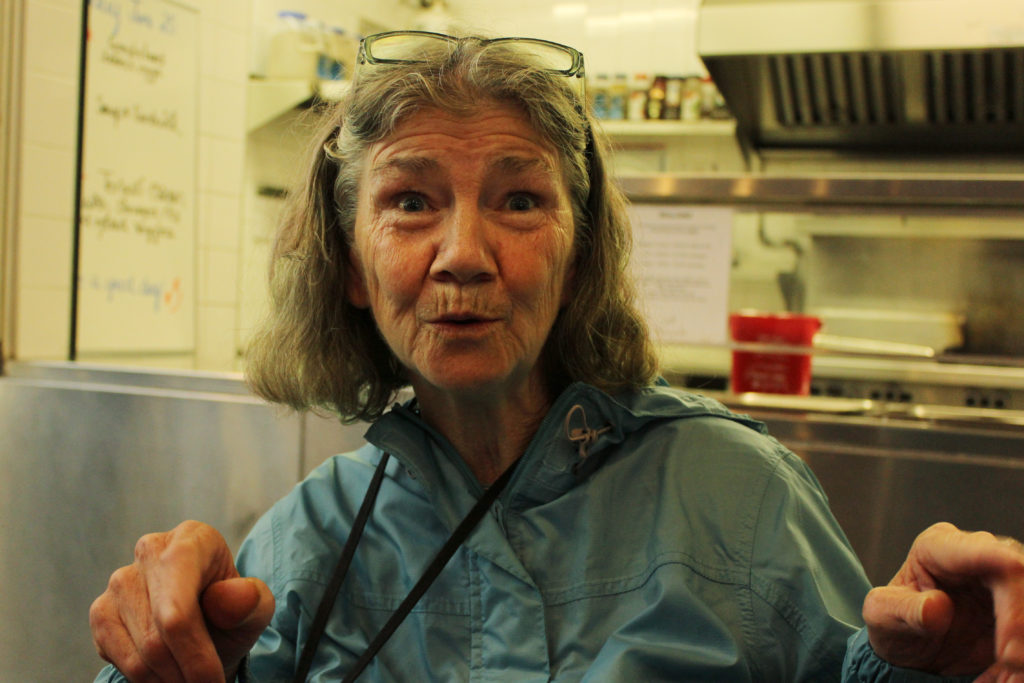
So, we talked about the best things or the nice times in your life but, what are some of the toughest moments you’ve experienced?
Toughest moments… when I was in the hospital. I got over it too. I used crutches but now I use a cane and I pulled through. People were surprised. I’m not sure why I was in the hospital but it was for my legs because sometimes I have a hard time walking. It could have been a knee replacement. It happened over a couple of years ago and I had a hard time. It was the hardest because I wanted to be with my kids. Kristen did visit me but only one of my two sons was able to visit me. They all live in BC but I don’t bother them. I talk to them once in a while. When they visited me it was nice, but when they left it was the hardest. It’s hard for them to visit me during the holidays too.
That is tough. Life is really short, though. If seeing your kids is something you want, then I would encourage you to make it happen if you can! Just go visit them if you can.
Life is too short. If you can’t do it, then try. Keep on trying.
What’s your biggest dream?
My biggest dream? My last wish? To get Ray back home. True story! I would like to see him come back.
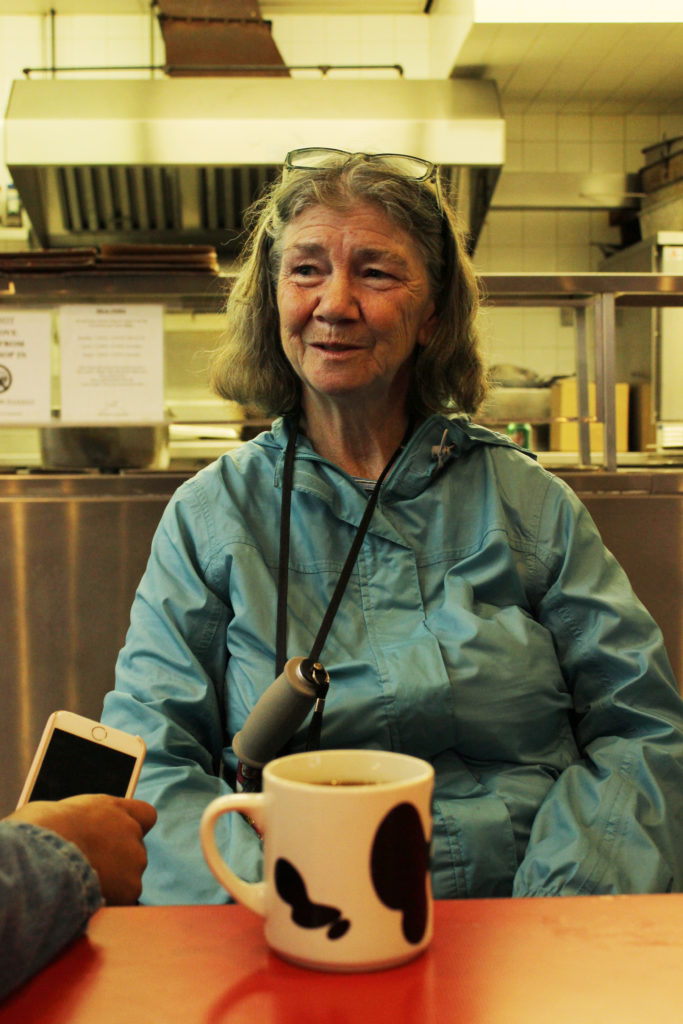
Maybe bring him a gift?
Oh good idea! Maybe. He’s out with his friends, though, he goes out at night. Instead of a cane like me, he has a bike.
So after Ray, who’s the closest person to you in Alberta?
Myself.
Tell me about your relationship with yourself.
I enjoy being alone. I respect it. I like to do things myself. I come down here myself, doing things myself makes me happy. I have nothing else I want to do today. I’m glad I met you two people and I feel honored to have met you.
Last question. What’s your best memory of this place?
It’s not bad, it’s not bad. They feed us. They’re good. I just walk in and if there is something I don’t like then I just walk out. I live upstairs and I can live my life day by day. So I’m grateful. If you can’t do that, then hit the road Jack! No more, no more. I remember that. I feel secure here but there are some neighbours who scream and so I slam my door and tell them to “shut up!!” But there will always be people like that.
You should probably talk to that guy Bob over there. He’s a really chill guy. He is someone we spoke to who is very kind, very well spoken, very respectful, he would honor you. I feel he could be a good friend to you in this place!
Oh, yes. He looks like a good guy.
Are there any last things you would like to say?
Why don’t we go sneak up on him and say, “… guess what??? Picture time!” (laughs).
To read more stories, visit: Hello Lumen Series

ALBERT
This interview conducted by Yesmine Elloumi and Jersey Manabat of The Lumen Series in partnership with Operation Friendship Senior’s Society.
September, 2019
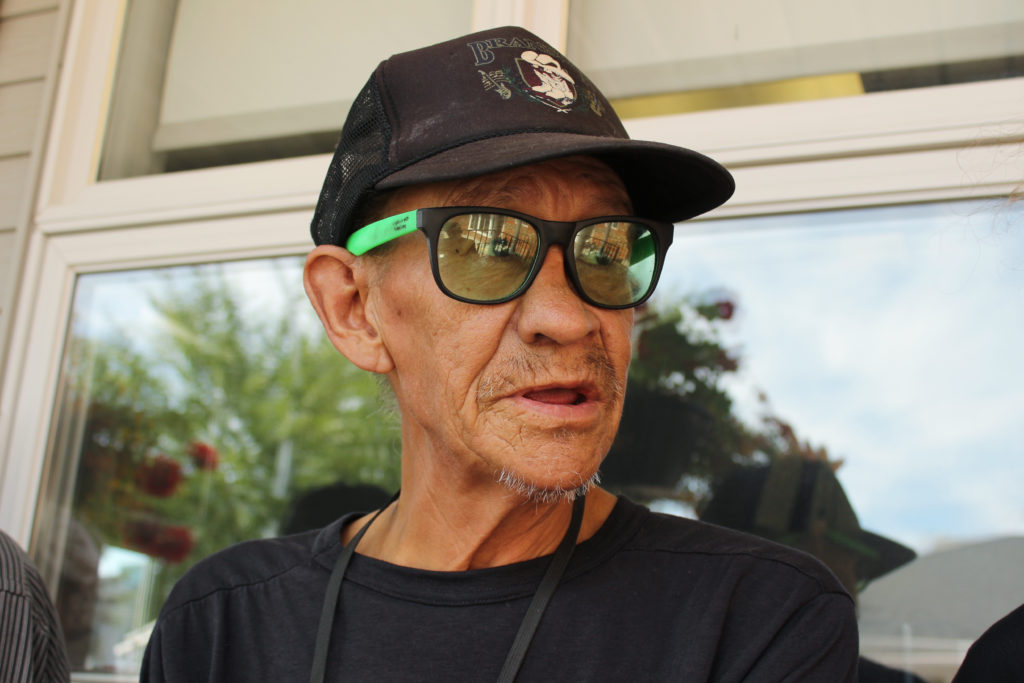
When I was younger I was put in a residential school called Blue Quills. Then I lived in foster homes, with other families. I always lived with White people. I couldn’t speak Cree. When I was 14 I ran away to my grandparents in Saddle Lake. I just hitchhiked. It wasn’t easy to get out at first but when I got to Saddle Lake, there was no work. I had to look for work. By then I was 18 I was assistant to a baker in a cookie factory.
Did you like it?
Well yeah, they were paying me.
Do you have any good memories from residential school?
Not very many good memories but I had a twin sister and she was on the girl’s side. They didn’t allow the girls and the boys to talk to each other. I still figured out a way to see her. When they went out I would find her.
Do you still see your sister?
No, she died when she was 28. She died from lung cancer.
I had to move to the city to find a job and it was really hard to find a place to live. I was growing my hair long but I had to cut my braid when I started working at the factory. When I went to visit my grandmother, she was crying when she noticed my hair was short. They raised me with my hair long, braided. But when I turned 28, I went to Grant MacEwan to study in their communications program. It was at a different location back then. I just went for the Certificate for Journalism. With that certificate, I had to do some internships. I started at Windspeaker. They sent me across Canada where I went into Indigenous communities. I reported mostly on politics: the bands’ struggle against federal government policies. Rights to land especially up North and also rights to their own resources. They eventually got stronger when they got their own lawyers because the lawyers that used to represent them would lie to them, manipulate them.
What was one of the best stories you ever reported?
Best story I reported was talking to young people that were in foster homes and they were indigenous and they went through all the same difficulties I did. I empathize with them. We both had to survive. And my grandparents they taught me how to pray. Prayer and Cree ceremony. Because all those other times I was an altar boy, we didn’t even have ceremony! So that was good. To talk to these young people and to learn how to pray. Not many spoke Cree because in that system, they never allowed us to speak Cree. We would get hit.
Did you find that you tried to reconnect with your Indigenous culture while in the city? Did you find urban indigenous groups while studying at Grant MacEwan?
Especially university- we had a Native Student Centre and it’s still there. It’s even expanded. Louis Cardinal was the boss. I was volunteering at the UofA radio station with four others and we would have a show for half an hour. We would play music, speak Cree. I even interviewed Tantoo Martin Cardinal, I don’t know if you know her she’s an actress. I got to interview her. I asked her one last question, “What would you tell the young people so they can do what you did?” and she said, “Tell them to use their creativity!”
What did you do with that advice? Did you take it to heart?
Yeah well I took it around. I took a lot of young groups. The university hired me to go to high schools, native high schools. St. Joes, in Wabiskaw, and more. I told these young kids, “You know, what I had to do is I had to keep on with school and go on to post-secondary. And you can choose your own post-secondary. Your community is developing so when you get older, what kind of job or business do you want to run?”
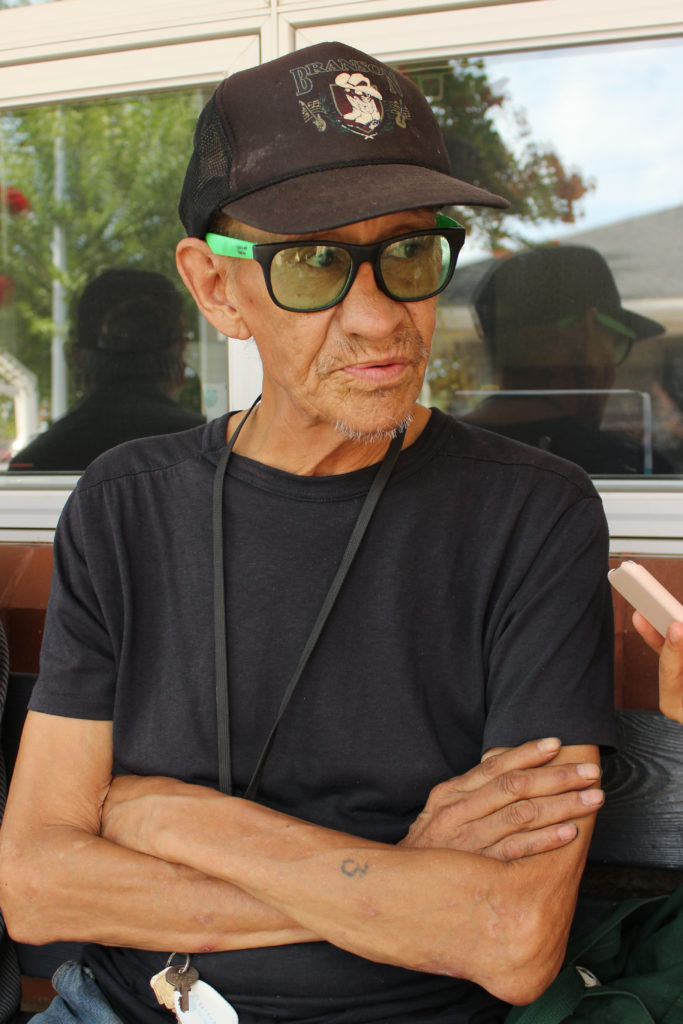
Interesting. So, if we flash forward to today, what’s your day-to-day like?
Here? I don’t like this place. It’s got cockroaches. I applied for my pension. I just turned 65. I was getting a small pension, getting welfare, and they said when I turn 65 I get a full pension, which is good. Waiting for that.
Other than that, what do you still like to do for fun?
I like going to powwows, I like to round dances. They’re all over the place, more often than not. In December I went to a powwow at the Canadian Native Friendship Centre. That’s what you should check out on the 28th, they’re going to have a BBQ. I enjoy powwows, I even join the drumming group.
What does it feel like when you drum with the group?
Bringing the grandfather spirits with your drumming and spirits into that room- feels like I did something good. Cause I see all these young people there. There’s a lot more young people now getting involved in dancing, or drumming, or getting all dressed up in regalia.
That’s amazing. You can tell that the culture that is so essential to your identity is alive within generations younger than you.
Oh yes. I have grandchildren and I take them to chicken dances. My wife is from Thundertown. That’s where I used to go. I keep in contact with her. She came here two months ago. For eight months I was homeless, sleeping outside.
What led you to not having a home?
Well, I left my wife, my job, and my house. I told my wife Sarah that I could do better in Edmonton. Sadly, I was wrong. Tried to get a house at first but it was hard. It was too expensive and I had trouble with Alberta Works Welfare. I had a special address, I had to have approval. It took eight months because you have to wait for somebody to die to get housing sometimes.
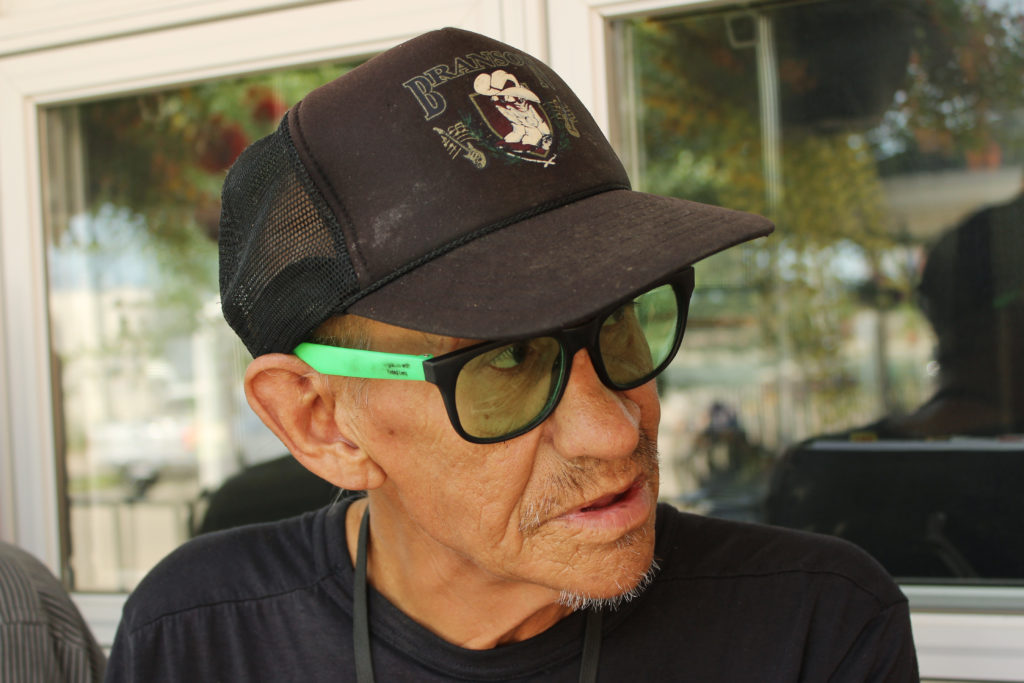
So, did you decide to stay here still for the opportunities Edmonton has?
Yes. It’s been over a year that I’ve been back to Edmonton.
What opportunities do you wish to look for within the city?
Go back to writing. Write for newspapers or write a book about Blue Quills. I got all my notes and got my memories. I write every day. I write about how they treat us. There was a sister there- I’ll never forget her name: Sister Jaber. We were five or six and she was slapping us around. We tried to speak Cree, we got hit. They wanted us to speak English. Then they had to train us in Latin. Their masses were in Latin, they’re Roman Catholic Church. We had to stand up there with the priest and when he said something you had to say something too. Are we just about finished?
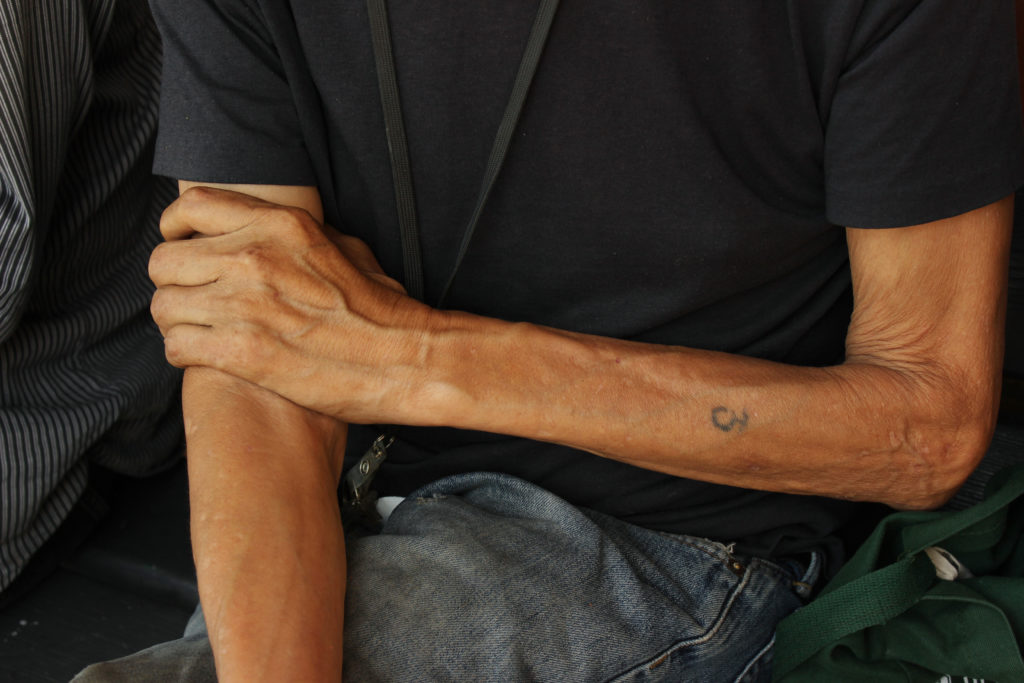
Sure, it’s up to you to decide when to end. But before we go, is it okay if you tell us about your tattoo?
It’s a male symbol. I had a twin sister and she had the female symbol. I did it myself and I did it for her too.
Thank you for sharing that with me. I’m sorry about the loss of your sister again.
I got over it. She has two daughters and I keep in touch with them.
To read more stories, visit: Hello Lumen Series

GORD
This interview conducted by Yesmine Elloumi and Jersey Manabat of The Lumen Series in partnership with Operation Friendship Senior’s Society.
August, 2019
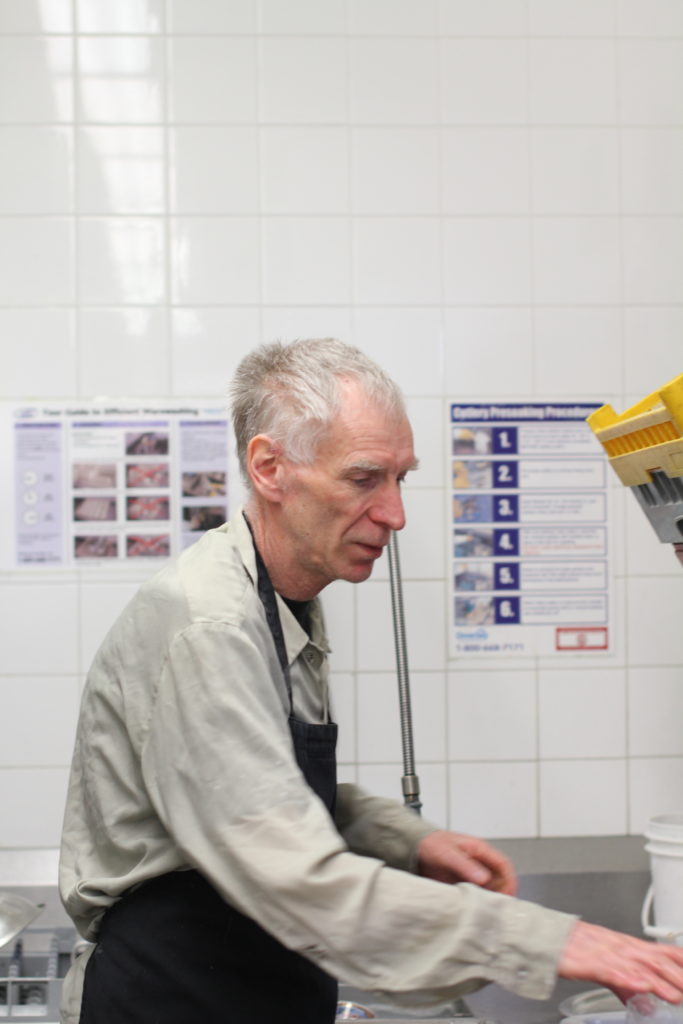
What brought you to volunteer with OFSS?
It was funny. I was volunteering at this church breakfast and there was a guy in there he said, “Hey Gord, I know another place you could volunteer for people 55 and above.” And he showed me this place. Initially I walked in, and I looked at the crowd and thought well they don’t need me to do anything. But um, yeah I just said I’m available, I could do dishes or whatever. Then a few minutes they grabbed me and they took me in. There’s always something to do.
And how long have you been volunteering here?
Let’s see. Between six and seven years. It’s kind of good for me because a lot of volunteer placements you have to book in advance and schedule. For this, you just basically walk in the door. If you want to help out and do something then you just do it. I like it.
For me I find that usually when I volunteer I think, “Oh, look at the wonderful things that I’ve done!” but you’re not making a big difference but it seems that here, you do make an impact.
Well the thing is, since I’ve fallen into this age group and you look at this place and there are people from the inner city, people that are homeless, people staying in shelters, all sorts of you know challenges and things. It sort of gets me out of the zone I’m in because I’ve never been homeless or any of those things and so it puts me in their shoes and gives me a window into their world. I can’t say I’ve been there but I can empathize much better.
I don’t know if you’re familiar with the project we’re doing but that was essentially the thing. We found that many people often see folks are experiencing homelessness and they immediately make judgements or that they know their stories. What we want to do is to show that these are diverse, interesting people who have had such incredible experiences. This is their life.
That’s a good point you brought up to because the homeless people or the marginalized people will probably see that but once you gain their respect, they’ll really open up to you. I found that people when I initially came here weren’t friendly to me at all. They’re really friendly now.
I think sometimes it may be hard for people to see if you actually care for them and if you want to learn about them or your just here to volunteer. Just passing through.
Well there’s different kinds of volunteers too. There are people that come here, some groups. Some groups that come in that are university students and it’s usually part of a course. Which I think is a good thing too. Then there are the people that actually come here just to help out.
In getting to know the community and gaining their trust, have there been lessons gained for you?
Absolutely. Sometimes you walk in here and say you had a conversation with somebody a few days before and everything went well. Two days later you come and they’re just looking at you weird. You got to remember that many of the people are on medications. There’s mental health issues, there’s addiction issues. To me it’s just not a problem- if I guy just doesn’t want to talk, I say have a nice day and let them go. You don’t get into a confrontation or an argument, it’s just not worth it.
It’s not worth it and it seems like they’ve had enough to deal with so to force them to talk isn’t going to help.
Another example is something that happened to me here. I went to get a coffee and I noticed that there was a paper on that floor and so I threw it in the garbage. About five minutes later a guy comes up to me and he says, “Did you throw this in the garbage?” He pulled it out and it was one of those little cardboard pieces put it had a pill in it. And I didn’t realize, I thought it was just a piece of paper so I threw it in the garbage. “I need this!” and he went on and on and on. Whatever what can I say. I just walked away. About two days later, the guy comes out to me and he apologized to me and shared that he overreacted. It felt nice to be acknowledged but I also learned a lesson. Now if I see something, I’ll take a little look before I throw it out. So I told him we both learned something.
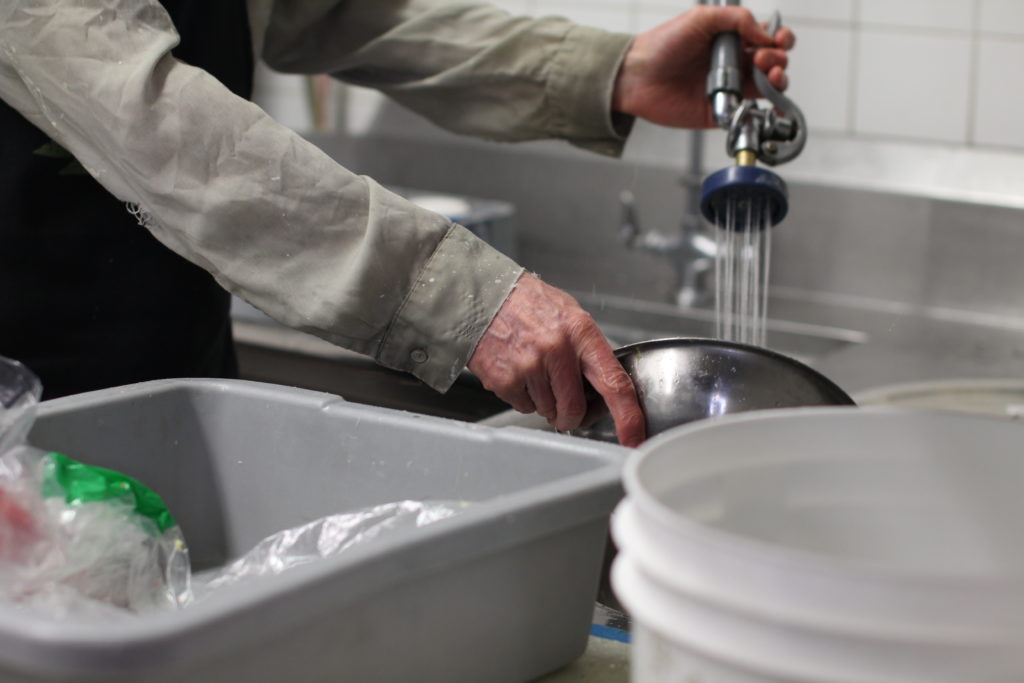
You don’t realize the importance of things to others most times and just being mindful of that is crucial. I also want to know a little bit more about you. What’s Gord? Who’s Gord?
What’s my story? Well let’s see. I was born in Victoria. After school I joined the military for a few years so I got to do a bit of travelling there and after I got out of that, I came to Edmonton. I followed some of my military friends. Worked tons of different jobs. Worked in the rigs for a while. Warehouse. The last full time job I had, about seven years ago, I couldn’t really stand working there anymore. It was one of those jobs where it was really great when I started working there but over the years, management changes and that- it ended up being a horrible place to work. I said to myself, I’m quitting and I’m never working FT again. So I just started part-time so I could volunteer as well. I had enough money saved up that I was able to not have to worry about a full-time job. So I still work there a couple days a week. There’s a few other places I volunteer at too.
Day-to-day what do you find the most enjoyable or the most fulfilling? What brings you joy?
I think probably for the most part it’s volunteering and giving back. That’s what I like to do.
To help the community or why?
To give you an example of how it has impacted me here’s this. I like to travel and stuff but when I worked full-time you only get a week off and you go to an all-inclusive resort. But I know I won’t be able to do that anymore. If I travel it would have to be for a reason or for a real experience. I did that when I quit my last job. I walked into a travel agency and it was called Adventure Travel. The guy asked, “How can I help you?” and I said, “I want to go on an adventure. I don’t want to an all-inclusive.” and I went on. So I ended up going to Peru. I didn’t do the Inca trail but I did another trail that was similar. The tour I went on was around 17-18 days.
Did you train for it?
It was weird because the nearest city was Cusco and it’s right in the mountains and its a fairly high elevation. I could feel my whole body change. Your whole physiology changes. My leg was totally tingling and so you start on that trail and you’re just winded. I couldn’t imagine Mount Everest!
There are people who solo Mount Everest and some even climb it without oxygen and it’s remarkable. What was that experience like?
One of the big experiences was when I went on a tour, I was the only one in the group. There were two porters, the guide, and me. And they didn’t really speak English and I couldn’t speak much Spanish. I didn’t really relate too much to the porters. It was bizarre being the only one. Sometimes we would get to a peak and we would just sit down and all you could hear only nature. Another thing that happens in the mountains is that it could be sunny and within minutes it could start raining. That’s one of the biggest challenges is the weather changes. The next time I actually do any traveling- other than going out to the West Coast or just within Canada- it will probably be in a volunteer type gig. But I’m not exactly sure because I don’t want to take work from someone else.
For the most part do you like the people you work with here at OFSS?
I got to work with lots of people in here. And it’s always been good. But let me tell you about the most impactful day I’ve ever had volunteering. This was about five years ago I was donating blood at the Canadian Blood Services. I made my donation and I walked across the LRT. There were these two girls standing there, maybe 15 or 16 years old, and this one girl walked up to me and asked, “Did you just give blood?” to which I responded. I asked her how she knew and she had apparently saw me walk out of the building. Then she said, “Well, my mother needed blood a couple of years ago and her life was saved because of people like you! Thanks a lot! Can I give you a hug?” When I walked away, her friend also asked for a hug. And that was probably one of the most impactful days I had while volunteering.
It takes those experiences to really see the difference that you can make.
Another time I was volunteering for the Salvation Army they have something called the Kettle Campaign in the malls just before Christmas. I was down in City Centre reading the paper and a guy walked up to be and insisted on buying me a coffee. I never seen him before. I agreed finally and he went to McDonald’s and he bought the coffee. Put it in front of me. He says, “I saw you volunteering at the Salvation Army last weekend at Bonny Doon. Ten years ago the Salvation Army saved my life.” And then he just walked away. Shook my hand and walked away.
You hear all sorts of little stories here. Challenges. Let’s say someone is staying at a shelter. You don’t have the freedom to get up and go to the bathroom during the middle of the night. If you do, you have the risk of losing your sleeping pad. So now you gotta wake up the guys next to you or try to squeeze in between them and it’s just a hassle. Whereas you and I we just get up and go to the bathroom. Those are the little challenges right there. If you’re living in a tent in the River Valley and you need to go to the bathroom it could be raining out or it could be freezing cold.
Right. These factors like the lack of proper sleep, you don’t know where your next meal is coming from. All these things are barriers.
Many people miss their appointments because they can’t use an alarm clock they don’t have one.
That reminds me of an experience I had while volunteering at the Kaye clinic. I saw a man walking outside who looked like he was slipping in and out of consciousness and he told me that he was diabetic and experiencing a sugar low. Not only that but he recently had two of his toes amputated because he had frostbite from the winter and had another appointment at the Royal Alex. So, this was far away. He wasn’t sure what time the appointment was at, he didn’t know how he was going to get there, he didn’t know the doctor. You set these things up for people but we forget about the different challenges that exist that can impede them from helping themselves. It’s great that non-profits like this exist but what about the systems such as the healthcare system? Which aren’t set up for individuals experiencing poverty?
Another thing I think- and I actually learned this from a social worker and thought it was great advice- let’s say you’re talking to somebody one day and said they just quit drinking, I haven’t drank in ten days. Then you see the same guy and he maybe shares that he fell off the wagon. The social worker I know he would always say that this doesn’t take away from those days you were sober and you proved you could do it. So he would always throw a positive spin on it. You did this, you had a setback, you move on. You remember that nobody is perfect. You try again. He always told everyone that whenever they experienced setbacks. He’s one of the managers at Boyle Street Community Service.
Do you think that the services that exist within the community actually serve their purpose. What do you think is missing?
It’s kind of tough for me to say that because I haven’t put myself in that position but I think that the help is really- there’s a lot of help out there. If someone needs a shower they can always get it here. Social workers are right there. If someone asks me about services and I don’t know, I just direct them to social workers. They’re so good at finding the resources that people need. They help people get their income taxes done for free. They give out food vouchers around Christmas. There’s a group of ladies that come in once a month to sew people’s clothes or whatever. A group that comes in to do haircuts.
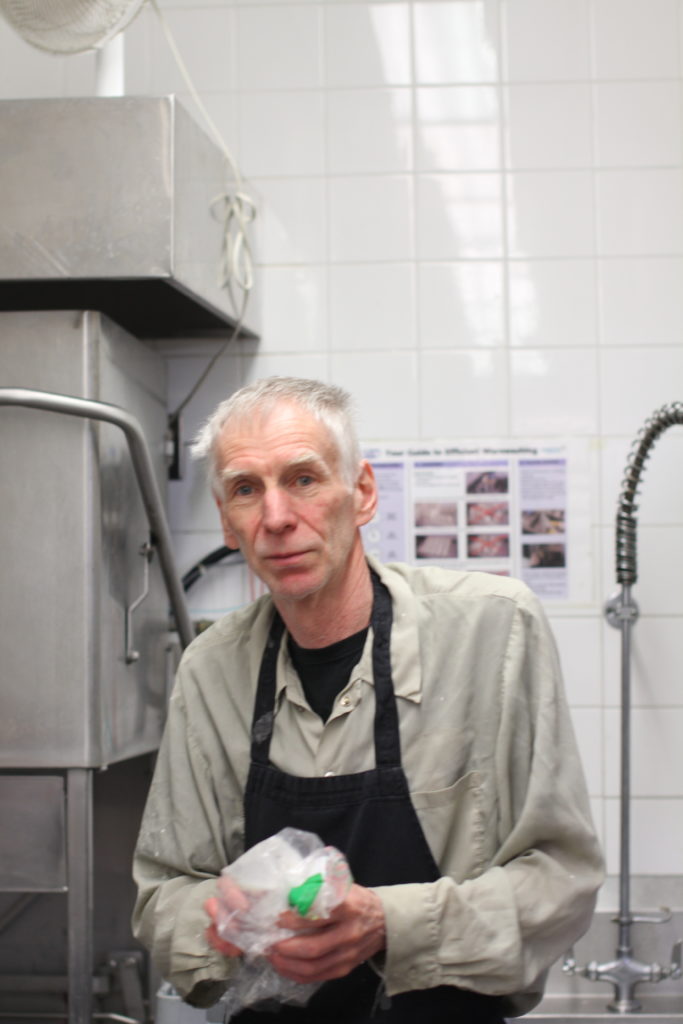
Many people don’t know about OFSS so what would you like to tell people about it so that they may support it over the more popular services like Boyle or Hope Mission. You can’t put one service over the other but what makes OFSS unique?
That’s a really good question. Part of it is the age group. 55 and above so most of these people aren’t working and they’re on fixed incomes. Also with seniors there’s a lot of isolation. I know many seniors think that because they don’t work anymore that they’re not important anymore. So when people donate time or money or whatever it makes them feel like people care about them.
Loneliness is such a challenge for so many seniors, experiencing homelessness or not.
On the topic of why you should donate to OFSS, the first time I volunteered for the Salvation Army, I walked in and the Food Bank was there. First thing I said was that I’m not here to compete with you, we’re all in this together. We all work towards a common goal. Another thing he did- and he was in his 70s he probably volunteered for years- he was in a better spot for donations compared to me but he would always point people towards me so to work together.
There was another thing that happened one time. I was walking around I was picking up empty plates and this is something to always remember too. Before you go pick up an empty plate in front of somebody, always ask them first. They may want to take it up themselves. Because they want to do something! They may not be able to do anything else that day, but they can take that plate up. So when young people or students from schools come to help, I always let them know that. All it takes is looking at the person in the eyes and asking them. Create an interaction. That’s important.
To read more stories, visit: Hello Lumen Series

JOSE
This interview conducted by Yesmine Elloumi and Jersey Manabat of The Lumen Series in partnership with Operation Friendship Senior’s Society.
July, 2019

Your name is Joe but your ID says Jose-
“Josey”, it’s French.
So you’re from Belgium. How long were you in Belgium for?
I was born in Belgium 1949, was there for a year, we moved to Luxembourg, where my mother is from. We lived there until 1956, came to Canada in 1956.
Wow, so it’s been a while that you’ve been here. Did you move directly to Edmonton?
Nope. We moved to Montreal and from there to Kitchener, Ontario. Kitchener to Sudbury, all around the Sudbury area until I joined the military in ‘67.
So before the military, what were you doing? Were you young? How old were you?
I was 17.
Oh, so super young. You were in just in school. Do you have any great memories from school?
Not really. I was in trouble all the time (chuckles). A lot of fights. Just stupidity.
Why do you think you liked to fight when you were young?
I had to. Being from Europe, at that time in those years. A lot of people ended up using a term: “DP”- deported. So you defend yourself. Sometimes you win, sometimes you lose. That’s the way it goes.
Well, I’m sorry about that. But it seems like you’ve come to terms with it. You know it was a different time.
Oh yeah! Things have changed over the years. Still changing.
Did you know you wanted to go into the military right away?
Yup. Actually, I did. When I was a young boy all I ever heard about was the United States Marine Corps because they liberated Luxembourg and Belgium. One of the sergeants in the marines was my mother’s boyfriend back then. It had a lot of meaning to me so my whole life as I grew up, I wanted to join the marines. But, being in Canada, I couldn’t do that. So, I joined the Canadian military. After the Canadian military, I went down Stateside and I did two tours with the marines: in Vietnam and Afghanistan.
Let’s talk about the first part: let’s talk about when you were with the Canadian military.
I did a lot of travelling on the East coast.
Any eye-opening experiences?
Yeah, I’m actually still dealing with it. Trying to get my pension out of it because in 1967 to 1968 in New Brunswick, the United States had a unit up there that was spraying Agent Orange, testing it all over. It’s a chemical defoliant but it is also the one that causes cancer. So, now because of that- I got all the paperwork at home, I could show you if you want.
And the paperwork is for…?
For pension affairs because of this. But the thing is- if you’re not an officer, you don’t exist! Only the officers could get pension for that!
Is that something that still exists?
Oh yes! Oh, yes.
Did you get cancer from that?
No. But you get COPD and everything else. Nerve damage. I got the nerve damage, I can’t even write my name. I got all the paperwork still and I’m still fighting. And I won’t give up (laughs).
How long were you with the Canadian military? From 17 until you were 21… okay not too long of time. But then you went to the marines. Two tours.
Six years. And then I left there to Britain and ended up with another military outfit: Colonel Blackwell. Blackwell’s Mercenaries. An organization out of Britain. So I served time in Ghanda, Afghanistan, Indonesia, Zimbabwe, the Congo, French Ghana, British Ghana. I was in my mid-20s. I wouldn’t mind going back but my health is- ha! Shot.
What brought you the most joy from being in the military?
The freedom. The comradeship, the brotherhood. I’ve got a few friends but we don’t keep in touch all that much. We’ll see each other every 5-6 years, go on a big drunk and that’s about it (laughs)! I don’t have any friends here in Edmonton. I don’t associate with anyone, I stay by myself. That’s the way I like it. There’s an old saying: “Familiarity breeds contempt”. So I stay away from people. I like my freedom. I don’t have to answer to nobody, I come and go as I please, I can pick up my stuff out of my apartment, walk out, go up North, East, whatever. I like being a free agent. Now that I got my pension, I’m even more free. I’ve got no papers to sign, money goes into my bank, I don’t got to worry about it.

That’s good. So, what do you like to do in your free time?
I used to do a lot of wildlife photography. Birds, animals, insects. A lot of fishing, camping, gold panning.
Gold panning! Where did you do that?
I do that in Kamloops, Vancouver Island, yeah. In terms of how successful I was, ehhhhh, let’s say I didn’t get richer! It was for fun, but I did make a profit off of it. The thing is: if you enjoy what you’re doing, that’s the key thing in your life. If you’re happy with what you’re doing, that’s all that matters.
So, what brings you the most joy?
Nothing, really. Just me, walking outside. Seeing the wildlife. The birds. I used to have a car to go out of town but I sold out. Gave in my license. Too much road rage!! Had to give in my license before I killed somebody (laughs). So now, I take the bus, the train. I’ll take a bus, I’ll stop off the side of a mountain somewhere, I’ll get off. I’ll stay there.
I feel like if I just got off a train, I would not be very equipped to survive. So, you tell me: how do you survive?
First of all, you have to know that there is always the possibility of you getting hurt. Whether it’s from a fall, off a cliff, off a mountain side, off a land slide, or a wild animal. You never know. Even chopping firewood, you never know. You could cut yourself and it could be severe, So the first thing you got to know is: first aid. Always keep a fresh supply with you. A minimum of food: dried goods. There’s water everywhere, so you don’t have to worry about that. A few pots. A good knife, good ax. I use a bow and arrow.

I see you have a bow and arrow being held by a very gorgeous lady as a tattoo.
(Laughs) It’s kind of ridiculous. I used to do a lot of drawing as a kid. I drew these. When I joined the military, I had my artwork with me. The boys took me out and got me drunk one night and when I was drunk, they had me tattooed. They’re unique. I like to say there’s a story behind it: Well she started off looking like this (points to the tattoo of a woman on his left arm), but if she would have kept on hunting instead of playing with him (points to the snake above her), she wouldn’t have got that way (points to the tattoo of a pregnant woman on his right arm). (laughs heartily!!)
That is so good, that’s funny! I like that. That’s still making me laugh- the fact that they’re related makes it even better. Jeez- I have a lot of questions about your time with the marines or with the British-
Oh, you don’t want to know.
I mean, I do want to know about at least one thing, but you get to choose. Is there anything from those years?
My trade during that time- I’m a qualified sniper. So, let’s just leave it at that. Let’s just leave it at that.
You want to just keep it as that? We don’t have to get into it. But what about before? Were you by chance trained to become a qualified sniper or what is always a goal of yours?
I’ve always had a knack with rifles. I started shooting a 0.22 when I was six years old. My dad trained me where he would take a piece of wood and pick up shells from off the ground. He would place ten shells equally apart on the wood and let it drift on a pond. So I would have to lay there and would have to hit each shell off, separately, without hitting the wood. Just pick off the shells. That’s how I was trained.
Wow. So how long was it until you became pretty good?
Not very long! Like I said, it was like a natural phenomenon.
That’s very cool! As a person to do something and feel like you have a knack for it. So that knack of yours is probably what drove your purpose in the military?
It did. But uh, over the years I’ve lost my taste of it. That’s why I don’t use a gun no more. It’s no sport. When you know you can take a rifle, or a pistol or anything, and you know that there’s a target- you’re going to hit it. No matter what.
There’s nothing competing against you.
No, there isn’t. Because in hunting, you go out for an animal in the woods, there’s a skill involved. You have to try to get close to that animal, outwit that animal. But the thing is, with a rifle, there’s no skill involved because you could shoot an animal 1500 yards away before that animal even sees you up on a hill. So where is the skill or the enjoyment in that? There’s none.
Is that why you use a bow and arrow?
Yeah, a crossbow. I’ve always had a crossbow, ever since I was a kid.
Do you still hunt?
No. I’ve shot a lot of deer and I’ve shot a few moose. I had a couple animals that I’ve seen in the woods that I have been close to. Very close. I look at them, they look at me and I just stand and watch them. A pack of wolves- I’ve been close to packs so many times. They are not as dangerous as people say. You just talk, gently. You just look at them. They won’t bother you if you don’t bother them unless they get shot at or they are especially hungry since hunting has been poor. Then, there could be a problem. But otherwise- no. It’s like any animal: if confronted by a human, who is taller than most animals, their tendency is to run away or shy away. Avoid contact. But the thing is that most contact is by accident. So that startles the animal which can cause different reactions.
Do you feel like with you time in the wild- because you are talking about a very unique experience of being very close to wild animals- do you feel like they taught you some lessons?
Oh, definitely. Number one: don’t kill unless it’s something you need. You got guys going out there hunting and they shoot everything in sight. For what reason? Target practice? Unnecessary. A wolf, cougar, or a bear will only kill what it needs for food. It doesn’t kill for pleasure. Man does. That’s why I’d rather associate with animals, frankly (laughs).
Are there any other lessons or is that the biggest one? As valuable as it is.
If you go in the woods and you got no food with ya, just watch the animals. Watch the birds. You can eat what they eat. If they don’t eat it, don’t touch it! It’s no good. Seriously. They know. Certain berries you wouldn’t even know if they’re edible or not. You watch the birds: if they can eat it, you can eat it. If the birds don’t touch it, don’t touch it because it’s poison.
When I talked to you about human relations, you didn’t really flourish. But when we started to talk about your relationship with animals-
I am closer to animal life and wild life than I am to humans. I have more respect for them, I learn more from them. An animal will not betray you. They won’t turn on you and they don’t bite the hand that feeds them. Humans? Forget it. Can’t trust them.

After talking about everything we just talked about, what was the happiest moment of your life?
Well I guess, the birth of my two kids. I got a daughter and a son, I got a grandson now. I haven’t seen him in a long time. He’s 15 now. They’re back in Ontario. My daughter is in Canola, my son is in Red Lake.
Are you still in touch with their mother?
No. I met her in Ottawa. I went down to a food bank to get some groceries. I couldn’t carry them back because my back was injured. She helped me carry my bags but she never left. Then just one thing after another, yeah.
Why do you feel it fell apart?
I couldn’t trust her. I come home from work one day, two kids at home, just little babies. My son was only a month and a half old. I come home and he’s on the floor covered in crap, my daughter is on the floor covered in crap, and I couldn’t find her. I go to the bedroom. That’s where I found her, with the neighbor! They both went out the window. Got rid of them.
So, you ended up raising your children?
Yup. This is after the military, this was 35 years ago.
They’re in Ontario but you’re here. Why did you come to Alberta?
I came here because my parents were in Vancouver, my dad had just passed away and my mother was ill so I came back here to see them. Children’s aid looked after my children back then. They told me I wasn’t getting my kids back, they said I was too violent. That’s how they classified me because of my military history. So, uhhh, I fought with them for a number of years until my daughter turned 18 and my son- they kicked him out and put him on the street in Winnipeg.
They classified you as violent why? Were you diagnosed with PTSD?
No. They classified me as a violent- I don’t have a violent history on my police record. No violence on it whatsoever. It’s only because of my military history and now being a single parent, they didn’t like that back in those days.
Did they try reaching out to your family to help with raising the kids?
Oh yeah. They wouldn’t. After a while, they said, “That’s it.” They came in, they took the kids, I got into an argument with them, the cops come, next thing I know- I’m in jail for three months.

Would you say that was the darkest time of your life?
Oh yeah. Oh yeah. I’ve had a lot of misery in my life time. Seen a lot of death and everything else. But nothing in the world can compare to the hurt you feel when you lose your kids. (takes a moment)
Do they visit you while in prison? Your kids?
No. They were 8 or 9 years old. They couldn’t come to the jail because I was transferred 400 miles away to a jail. And even after I got out, it took 18 months before they let me visit. At that time they had moved my kids out of the province to another province- which is illegal. They put them in Winnipeg in foster homes.
Twenty-one months of you incarcerated then away from your kids.
The time I was away from my kids because of them, you might as well say I was incarcerated because jail has got nothing compared to what that feels like.
Of course. I’m so sorry about that.
It’s history.
What was life after those 18 months?
Uhhh, my first visit was with my daughter and I wasn’t allowed to… She was in a room with two workers and a police officer. She would come over, she stood in front of me, she put her hand on my head and tried to give me a kiss- HOLY COW! All hell broke loose. “Don’t touch her! Don’t touch her!” they would yell. “I’m not!!!!”. I’m sitting like this here my daughter comes up and goes to give me a kiss- I almost flipped out. I threatened to kill the son of a bitch right there and I got another six months.
Oh my God. I couldn’t imagine. I know that it’s history but- what you could dwell on in the positive I guess is that your daughter was very happy to see you.
Oh hell yeah! I didn’t even know where she was for a number of years. I was actually in Kelowna at the drop in centre there on a computer and I got a message. “Jennifer Peacock wants to talk to you”. I don’t remember any Jennifer Peacock! Kept on bugging me so I opened the site up and there are pictures of my daughter and my son when they were little. Who in the hell would have those pictures? It was my daughter. She married some biker by the name of Peacock.
Have you reconnected?
Ahhhh, somewhat. We talk maybe once a month. Long distance relationships don’t work, too. Because it just makes it harder. It’s even harder to talk to somebody long distance. It’s not the same sitting here talking face to face. Last time I saw Jennifer was in ‘98.
What are your last few things that you wish to do?
I don’t have any.
I think you want to visit your kids.
Actually I do and I don’t. Because I know if I go down there, there’s gunna be trouble because of her husband.
Well he doesn’t even know you.
I know him. I used to live where he did. There’s history. First thing I know is that he’s abusive, so the first thing I’m going to do when I see him is I’m gunna drop him.
But your goal is to see your daughter. Is he the only person in your way?
I’ve come to the realization that we all make our beds and we all sleep in it. She’s made her choices.
What about your son? We don’t know where he is right now.
My son is up in Red Lake, Ontario. He don’t even talk to me. He talks to me once a year or something like that. Do what you want to do, it’s your life. You have to look at reality and you have to accept what there is. Because the longer you live in resentment, it’s not going to affect them any. They’re going to be happy. Why should you be miserable when they’re happy? Sounding like Chinese philosophy, hey? (laughs). It’s true.
Unrelated to that, how long have you been here in Edmonton?
I came back here four years ago. I moved around homeless shelters: Edmonton, Red Deer, Calgary, Lethbridge, Medicine Hat, over to Prince George, Prince Rupert, Kamloops, Kelowna, Vernon, Penticton, Nanaimo, Vancouver- all I did was make rounds from one shelter to another. I didn’t have a fixed income- I worked parttime because of my back and everything else. Work a little bit here or there.
This was before you could access your pension?
Yes. Six years now I’ve had access. I’m 71 now. The last six years I finally got a right around the corner here. It’s run by rotary club, it’s for veterans. Nice place there, I’ve been there since January.
Congratulations, I’m happy for you. Do you like it there?
Ehhhhhhh…
Let’s pick one good thing, and one bad thing.
It’s clean, it’s quiet, but I’m bored! (laughs)
Are a lot of the veterans older?
They’re not all veterans. It’s housing for anybody 55, 60. It’s Right to Home Housing.
So, it’s not connected to OFSS. What’s your relationship with OFSS?
I like it but there are things. Down here, yeah it serves its purpose, it’s quiet, and it’s enjoyable. Upstairs- I stayed upstairs way before I moved into the rotary- I moved in, I lasted four days, I moved out. I just walked out. I can’t handle the drunks, the garbage, the drug addicts, the guys up at 2, 3 AM drinking, people come up to your door knocking looking for a drink. You go to the washroom and there’s urine on the floor, there’s crap on the floor. Four days, I walked out.
Oh, that’s tough. I’m happy you found a good home though. “Clean” was one thing you made sure to say about it!
It was all Veteran Affairs. They have Veteran’s Canada on 97th, it’s got a newly opened drop-in centre. I visit them, I like that they look after the veterans. Not just recognition but what they do is they have coffee, you can use a computer. Things like that. Here’s their card.
Would you say they are your first point of contact if you need help?
Oh, yeah. Definitely. My experience with them has been good, really good. I screwed up a few months ago. I hadn’t seen my men for a while and I went on a big drunk. I didn’t pay my rent for two months. I figured okay I’m gunna get the boot, no big deal. They contacted me, they talked with me, my rent’s paid. They paid the rent, they paid everything. I didn’t ask for it.
Humans aren’t perfect, we make mistakes. So to have someone have your back that way-
Well the thing is when you don’t drink for 28 years and all of a sudden you run into a couple of old army buddies, and you go on a binge- yup. It’s great to see the guys.
Are you about to show me something special? (Shows a medallion). “To thine self be true”
28 years of sobriety.

So that was your 28-year chip. Were you an addict?
No I just drank because I enjoyed drinking. It’s a big culture in the military. When my daughter was born, I was working in a bar. She was born at 2 in the afternoon, I was at the hospital in the delivery room. I went back to work, back to the bar after. Everybody in the bar knows me, “Oh, congratulations, congratulations” I had two tables full of booze. I gave them all a look, took one shot of scotch, drank it, and said, “The rest is yours. I quit.” I still worked there, but I never drank. It’s a matter of priorities, that’s all it is.
It’s like the motto about balance, it’s all about balance. It’s been a pleasure. I learned a lot. Thank you for confiding in us and we are so happy we met you. I’m looking forward to seeing you again when we come back!
Oh, I don’t come here that often. Like once or twice a day. Maybe have a coffee-
Well, we come here once or twice a month so… you definitely come here enough for us to see you again! (I place my hand on his arm)
(Laughing hard) Oh I’ve been touched by her! (Laughing) How lucky did I get!
To read more stories, visit: Hello Lumen Series

ROBYN
This interview conducted by Yesmine Elloumi and Jersey Manabat of The Lumen Series in partnership with Operation Friendship Senior’s Society.
June, 2019
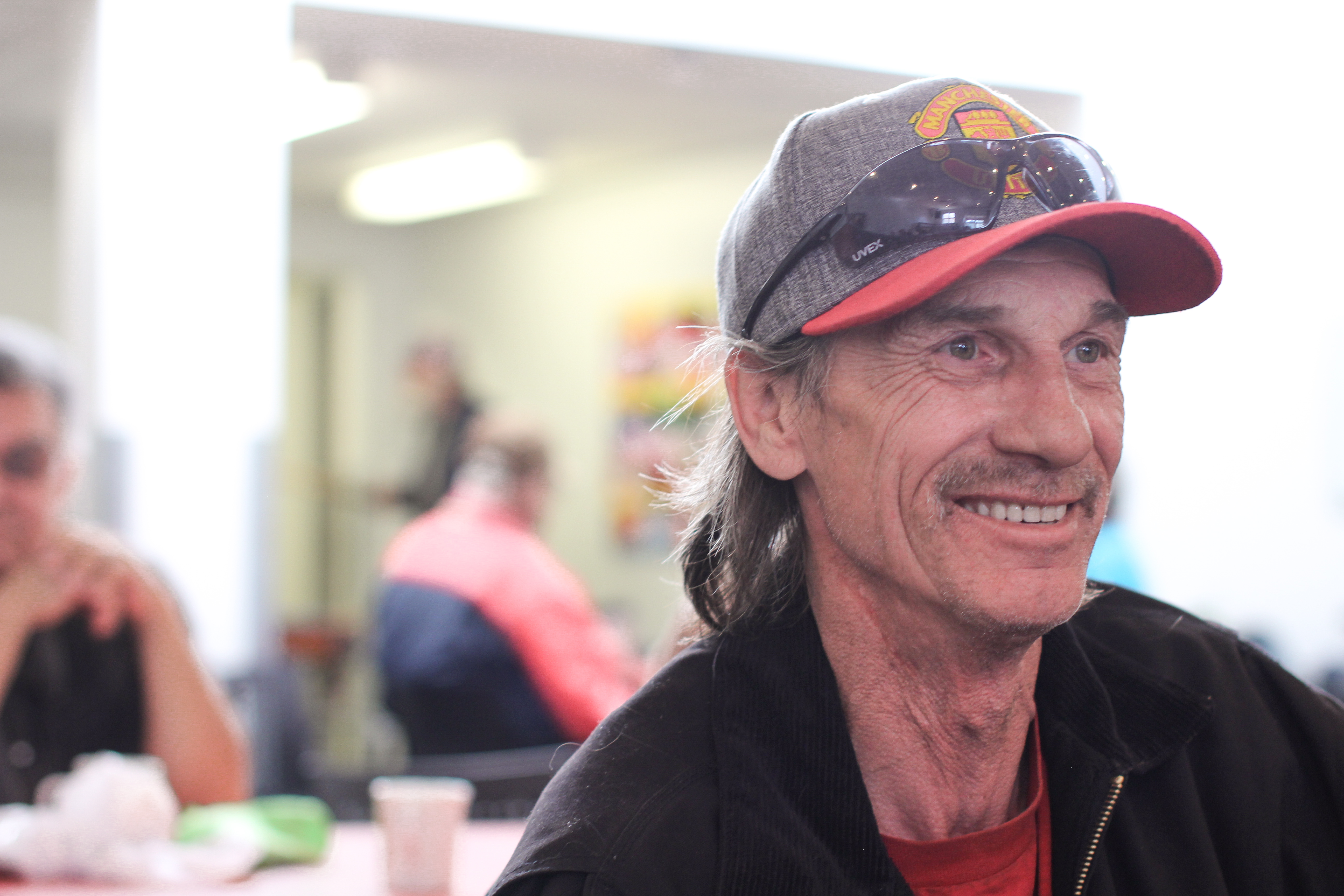
Usually we like to ask people what the happiest moment of their life is.
The birth of my girls. That was the highest point of my life. And the lowest? Federal prison.
Alright so let’s debrief on those two experiences so, talk about your girls.
Oh well one is a receptionist for a Heart and Lung specialist and the other one is studying to become a psychiatrist, my oldest boy owns his own roofing company… yeah, I did okay. Yeah, they’re pretty smart.
So, the psychiatrist, is she in med school?
No, she’s not but she’s about to give birth.
So, you’re about to become a grandfather?
Again! That will be three grandchildren. Sophie will be three. I’m kind of looking forward to it because me and my youngest daughter are kind of, we never really connected when we were younger because I was always working, but now with her becoming a woman we’re finally starting to connect. I’m discovering that oh my God she’s got a lot of my environmental and political views and she is very outspoken on Facebook, and stuff. I go all my God girl!
When is she due?
26th of this month. It’s going to be great but she’s in Fort McMurray so I don’t think I’ll be able to be there. I’ve discovered that in my own wisdom that it’s better to leave my kids to do what they want to do and then if they need me, I’m a phone call away, right?
Honestly, that’s pretty good.
Yeah, well, my buddy said it to me best he said, “When you were 25, did you want to talk to your mom and dad?” Well, no. I was busy being in love with somebody else, right? I didn’t want to talk to my mom and dad. I didn’t realize that I was kind of intruding. All I wanted was to be part of it, but.
It’s a fine line. For me, family is very important. As much as I can appreciate wanting to have my own life I think it’s important to really respect my parents and make sure they feel they’re being respected because I know they just want to connect.
The younger generation was not taught respect like we were. I would have never spoken to my father or mother the way kids have spoken to me. Because back in those days you would have gotten a cuff right away.
It’s cultural too.
You got to respect your parents, right or wrong.
They really are the reason you’re here! So, then you said you got into federal prison because of living in the bush?
Well, no it was because you go down, down and they you get hooked up with the motorcycle boys, then you start dealing cocaine, then it gets deeper and deeper and sooner or later you hit bottom. Well no, that’s not really bottom because you end up in prison and you’re still afloat but, ah, when you get OUT of prison- that’s rock bottom. Because they don’t help you. They turn your back on you.
The rehabilitation and reintegration is not there?
It’s not there, no. You got to do it on your own. That’s why we have failures in our society. Because the support is not there; when you come out of a place like that, you’re changed as an individual. A man, a person, a human being. You’re totally different from what you were when you went in there.
I won’t talk too much about it but in one of my courses I had a guest lecture that completely opened my eyes to the incarceration system. There’s so much crazy shit that goes on in there. And so, I think we should double check before sending somebody to prison because it will honestly make them worse. Not that they’re a bad person but when you’re put in such tough circumstances, what do you expect? Someone to become a better person? Especially in the men’s prisons.
I come out with more connections with the dark side than I had when I got in. Then you get out, you go to your government looking for support, looking to rebuild my life, they turn around and say, “Well you go ahead and do it but we’re not gunna help you.
When you were in prison, how long did you stay in there for?
Three years.
And then so tell me about it. Anything you wanna say.
Well the general public’s view of the Canadian Prison System is so far from the truth. It’s pathetic. There’s more dope, there’s more everything. The guards are crooked, there’s manipulation that goes on, everything. It’s a very nasty place.
For you was there a specific memory you remember?
Oh yeah, a guy got raped from a cell across from me. Uh, guys get beat up just a bit from me. Uh, huh. Guys get stabbed in the food line.
Stabbed?! How do they get that?
They sharpen stuff and then a guy who owes money or whatever in prison they have an underground drug system. The whole prison itself is underground. Like all the illegal stuff. And the prison guards bring it in and they get profit on top of that. Everybody thinks the prison system is to rehabilitate you? No! It’s to get you out of the public eye. That’s all it is. And then they wonder why we got problems in our society, I tell my girls: “Be careful who you talk to because you could be talking to a killer and not even know it.” They let them out every day. Child molesters, killers, our whole society is fucked. That’s why us older guys that’s why we want to bring the death penalty back. Right, because there are certain individuals in our society that are so sick that they just need to be shot.
I remember having a big debate about that. When I was younger, I would be like, “Well, there has got to be a way to do it without killing people and who are we to take away people’s lives…” but, it does get to a point you know as you mature that you start to think, if someone is such a risk to society, and honestly, you’re spending a lot more funds on police funds, healthcare funds, security funds, prison funds, trying to keep them away. It sounds so mortifying that you’re okay with killing somebody but it could be that the means justify the ends. So, when you were in prison, what was one of the biggest lessons you learnt? Other than how fucked up it is?
Let’s see. No matter what I say or do it’s not my position. Right? You’re just there to do your time- mind your own business. The guard tells you to shit on the floor, you shit on the floor. He tells you to clean it up, you clean it up. You don’t even question it. Or else you go into 30 days in darkness and when you’re fighting on a rage that’s more solitary time. You don’t want to go there, because it gets worse! The general population is bad enough as it is you go off into solitary confinement, it gets worse.
What was it like being in prison with people that committed worse crimes?
They’re normal people. As long as you don’t ask what they did. There’re always the morons in the group, the troublemaker. I was fortunate that I- well, I used to wear a vest at one time.
What does that mean? Like a bulletproof vest?
No like a motorcycle vest. I had a position of authority when I went in there so they left me alone they knew I was a big cocaine dealer on the outside.
And they let you keep wearing that when you were in prison?
No, no. But everybody knows. That’s another thing. They knew exactly what I was in for before I was even in my prison cell.
How do they know that? Word of mouth?
Well, you pay the guard and ask, “What’s that guy in for? Is he a child molester what is he in for? You go on that range that’s thirteen cells, everybody knows everybody and what they’re in for. But you don’t ask, it’s not brought up at the table but, you know that the guy sittin’ across from you killed his wife and two kids. So we never bring that up.
In your cell, were you alone?
Yup.
And how was that?
Lonely. (laughs). Lonely!
But was it better than having another person with you?
It gives you a lot of time to think about what you did and why you’re there. What you’re going to do when you get out and what are your dreams and aspirations. And that’s what keeps you going like it was my kids that kept me going. They know that their dad is a fuck up, blah blah blah, but we still love ya. That’s all it took to keep me going, right?
They would visit you?
No. Yeah, they disowned me for three years. Oh, they still disown me kind of but I don’t really care. If you’re not big enough to fucking get over it well- I don’t care.
So then when you got out- that was what year?
Oh, eight years ago now so 2011.
What was it like? What did you feel? What did you feel when you stepped out?
I was mad. Mad. So mad. Eight years have gone by and I will never forgive this country for what they did to me.
Expand on that.
Well, I’m going to start an army and fucking overthrow Alberta. There you go. I’ll be the President. I’ll be the dictator of Alberta just like Hitler. Because the public has had it with all these high prices and rent… in a country like this, you know who’s – it’s the greedy mother-bleepers that run this province. Like oh, you got to go out and vote? Well, we’re voting for what! For what? We’re paying you $250,000 a year to lead us and you can’t even do it?
Since then, it’s been eight years. Anything new? Other than the grandkids?
Oh! I learned a lot about myself, as a man. I have a lot of good qualities as a man. I have been a great provider, I’ve owned houses, motorcycles, cars, boats. I can make money, but I can’t buy love. Love is earned. Respect, loyalty, all earned. And then for me to find a woman like that at my age is like fucking impossible!
To me, you find love through the experiences you set up to have and then I really like them being my friend first.
Well that’s my priority first like for example, you and me let’s say, I’d try to get to know you as a woman first before I slept with ya. Hey? Because, me, well I hate to say this but I’m a real slut. Well, my problem is that the women I end up with are half my age most the time. My buddies are patting me on the back, “Oh good for you Rob! Hey! Hohoho!” But for me it’s like, you don’t understand what I’m thinking. There is a difference and now I’ve discovered that I need to find a woman that’s 35 and older, hey? Because she’s already set in her ways, set in that. Okay fine I can adjust to her but, these younger ladies holy… slow down!
Well the younger you are the more you’re trying to find your path, right? But it is still very taxing for you because you know yourself, you’ve been through some pretty unique experiences. So, to be with someone who is still figuring it out it can be, you need a lot of patience for that. Maybe you don’t have that.
No, I don’t. I know exactly what I want in a woman and I have a hard time finding it.
Keeping your standards high is more important to me than letting myself fall for myself shorter than what I want because I want to actually be happy.
Keep my standards high, never get laid. Lower my standards, get laid all the time. You’d be surprised where you do find love, hey. It’s when you’re not looking. Like this one girl, she’s 38. I thought, “Okay, she smokes meth, fine. That’s her business.” But, I fancy on her and I invite her in my home and I introduce her to my friends but yet she did a couple of things, then I didn’t say nothing to her, but then she asks, “Well why don’t you want to be with me no more?”. It’s cause of who you are! And she couldn’t understand that.
That’s hard. I feel a lot of young people are afraid to say that: “Honestly, I think that you as a person and me as a person we just don’t fit!” Cause it seems like such a personal attack but, you gotta be real if you are going to let yourself be so vulnerable with another person.
That’s my problem, I’m too honest. After what I’ve been through, I don’t sugarcoat nothing. I tell you straight up if you do something I don’t like. I’ll tell you straight up. And if you don’t want to correct that then I’ll just walk away from you I don’t got the time. I’m about to be 60 in a couple months but I still feel like I’m 25.
Bangin’! What is it? Bitchin’. (laughs)
Bitchin’ yeah. I can go down to Whyte Avenue, me and my boys, and nobody messes with us alltimers because they know they’re going to get a man’s licking not a boy’s hit. You fight with us, you’re going to get hurt.
Where do you like to go to on Whyte Ave?
We go to Commercial a lot for Blues Night. It’s beside Hudson’s. We go down to Whyte, all the university boys say, “What you doing messing with our women??” Oh, yeah! They’re jealous! And when we go out the women will group around us because I mean if I was a woman I would hang out with us. We got money, they’re laughing, they’re having fun. We’re not boring!
When was the last time you went out?
Oh, last night I went over to my buddy’s place. We used to ride together; he was position thirteen I was position twelve in our motorcycle club.
Can you tell me about this motorcycle club you were a part of?
Oh, well I shouldn’t. You go up the ladder. As you go up the ladder you go up ahead in the positions in the gang. As you get up to the front, there’s President, Vice President, Treasurer, Road King, they all ride up front. Then us subordinates ride behind them.
Are you still in your motorcycle club?
You’re asking the wrong question!
It’s okay, you don’t need to answer that.
No, I won’t.
So then, what’s it like? Being part of a motorcycle club?
Oh, it’s the greatest feeling on Earth. To have 65 brothers like that? It’s like a pack of wolves right behind you all the time, it’s power. These are the friends I was talking about. We all used to ride together at one time but it faded away. You can only have so much fun in your life before your body catches up to you then you realize, “Oh, I partied my life away!”
Is that the worst thing?
(Laughing) True! Look at that guy (points to another man who I was speaking to before).
Oh yes, that guy wouldn’t stop talking when I was talking to Tad.
He’ll sit on the corner and make $150 bumming change. Yeah well he holds up a sign at an intersection, “I want to go back home to Ontario…” or something. You’re from Alberta, ya fucker! Everybody is so gullible, giving him money. He goes after and buys a beer. Like, jeez.
That’s funny from the perspective of the people who know him, you’re all probably thinking like, “You’re not even from Ontario! What are you saying?” However, it just makes it that much harder for the people who actually need that help. That’s a big reason why we collect and share these stories- to share the diversity of people in this community. Or to share a conversation with someone who went to federal prison. Thank you so much for opening to me about that experience.
No problem, thank you for sitting down and talking with me. It also doesn’t ruin my image to sit and talk to a beautiful woman, now is it? I have alternative motives here, it makes me look good. So, when the other girls come around, the boys don’t bother me so much.
That’s interesting to think about… We’re pretty good talkers too.
Oh yeah, like I’m Scottish. We’ll stick up for injustice, it’s bred into me.
For the motorcycle club, are there a lot of people in there that are also the same background?
Yeah. Yeah, yeah, yeah. And I hate to say it but we’re kind of White Supremacist. Not in a racist way, but more like we, as a group, try to stick to the White theme, right?
So, why is that?
Well, it’s because it’s the only ones we can honor. The rest that – from what we’ve gathered… uh, I mean I’ve got nothing against immigrants. My father was an immigrant. Some of the immigrants coming into our country are just making our country look real bad. It’s hard to accept it. When stuff happens in the community that motorcycle gang related- a guy gets killed because he didn’t pay his debts, he’s a Somalian let’s say- to us, just another foreigner fuckin’ up in our country. Which is very hard and it’s very cruel. But for us that’s the reality of the world, that’s the reality of Alberta. That’s the reality of this block. Racism and bigotry runs rampant down here.
So why do you think it’s so strong?
Once a dog has been kicked or whipped a bunch of times it gets numb to it and then you become hardened to it and then you become part of it.
So, you’re saying it’s social.
It’s a social thing. Mind you though, all these people down here we’re all low-income earners so we know our path is set for us. Like for me I can get out of here. But for many others, this is it. This is the end. This is where you’re gunna end up. And after 45 years of working? And you have a hard time getting a cup of coffee at a senior’s house? What did I work for? What did I put all that effort into? Life, family, kids? To have it all thrown out. And then this year, we already know who is going to win the election. We all know. It’s going to be the UCP cause you know why? The money and the power is going to flex today again. We know this just like since 1982. You watch- it’ll be UCP in power by the end of the day. The younger generation with the money, they want to make more money. Because wants you start making money your greed kicks in. Then you got the bigger house, the bigger truck, the bigger this, the wife, the kids. But in reality, you don’t any of that. That’s what the federal prison taught me. I don’t need any of it. I don’t need your government, I don’t need your public anything. You people aren’t worth my time. Federal prison straightened me out real quick about what is what.
How do you feel those lessons affect your day to day?
I walk around cautious. Don’t trust the cops, I hate the government. Fellow man, I don’t respect.
Do you feel like if you lived somewhere else you might be different?
No, it’s all across Canada now. We, Canada, like the rest of the world, come to Canada. Now we have the rest of the world’s problems in Canada. Sure, I agree, yeah, we need immigrants. Do you know that when you hit retirement age, your Canadian Pension Plan will be non-existent?
You think so? Related to that I recently learned that the Canadian population has more people that are old than people that are young. So, we need to find people who can pay taxes to support this older population.
That’s why we bring immigrants in because we build our population base up so the older generation like us gets taken care of. But, girls like your age and my daughter’s age- I feel sorry for them. Because that isn’t going to be there.
Why?
Politics. Politics. That money has to go somewhere else… but still they’ll spend millions on a hockey fucking arena. Are you kidding me, eh? Right across from the inner-city. And then oh, we need to build a tall skyscraper. What the fuck’s with that, Alberta? You tell me you care about the elderly, the homeless, this, that. The government cares? You’re nothing but a bunch of liars. Blowing sunshine up your ass. But they’re good at it, that’s why they’re politicians. But the problem is us, our generation, we see right through that. This is why half of the older generation won’t vote today- because of that very fact.
If it seems hopeless to do so…
You’re not going to listen to us anyways when we tell you what we think. You’ll come up with an excuse.
I hear you. So then, what’s your day to day like right now? Do you come to OFSS often?
Oh, all the time, all the time. The folks around here are good, you know? We’re all on the same kind of boat, really. We’ve seen a lot in our lives and we know to mind each other’s’ space and manners. That was taught to us when we were kids. The generation behind us has no clue what that’s about. You see people nodding their heads? I’m not the only one. But then, there are people like you that keep our optimism high! Like my daughters, they’re very well-mannered and very polite. Very respectful to elders.
You should respect others. Just like right now: you are sharing with me- I felt you were uncomfortable sharing how you and your biker gang feel you identify as White Supremacist and I feel many others would immediately become offended or triggered. But, I’ve learned that it’s important to explore views rather than define a person by the label they’ve offered.
I worked two years for a Shia stone mason on the Southside. I worked Dave Jahal at Wildrose Masonry for two years. I went down and integrated myself with the Muslim community to understand what all this fighting is about. Why is everybody fighting? And then you realize, “Oh! Jeez! He takes care of grandma, he paints houses, kids go to school… they do nothing different from what we do! What is this battle about!” But, once again, we’re back to politics and money and religion. I never used to look at a Muslim woman as a potential partner but now, in the new generation, I’m opening to the Muslim nation. These women are loyal, good-looking, knows how to treat a man, and that’s taught as young ladies in the Muslim nation.
If you look at people with their labels, you won’t get too far. But if you look at people’s values, there is more that is revealed and more that can open up. You told me that from prison you learned to be cautious, to not trust people around you. But, you will have to trust people eventually. Right now, you’re trusting me in this conversation. The best way to relate to someone is to let someone feel respected when they interact with you. You see the eye-contact happening here? I feel valued. Then, I feel like “boom” I can connect with you.
I know an interesting moment when I meet one. I don’t speak to many people who can’t keep up their end of the conversation. You know, I used to be one of those guys who used to drive by and yell, “Why don’t you go get a job, you bum!” But now I’m one of those guys and I realize that oh, I was totally wrong in if these people are lazy. That’s the problem with our society, we assume too much.
My mom, she’s a funny lady. She loves quotes and the other day she shared a quote with me that said, “It’s too hard for most people to think, so they assume.”
I get lots of that. A lot of people assume I’m still in the motorcycle club but I’ve been retired for 25 years. So, last night I was looking at my vest with my buddy. We were drinking beer, laughing about the old days. We were looking through old photo albums from 79’. We rode together lots and I would be like, “Oh I remember that wife of yours!!” We were laughing. Then you look at a picture of yourself from 25 years ago and you think oh my god, I was really good looking! (laughs).
I have one more question to ask. What’s your experience with OFSS?
Oh, here? I like the place. It’s like any family- you become part of the family and you have your ups and down. But people are very well-mannered here. I’d rather come here than anywhere else- I don’t eat at the Hope. I barely go to the Bissell. I never go to Boyle Street.
Why?
I have to get away from the drugs and alcohol and there is where they all have it. Then the government says we have to go there to eat well- I have nothing against Christians but when three of your Black folks are ganging up on one Native and I come up to tell you to get off him and you don’t so I punch you in the face then you call the cops- go ahead.
So, it seems like a sink for conflict. A lot of people we spoke to here at OFSS say it’s much calmer so it’s nice to catch a break and to let down your guard a bit.
Oh, yeah. Definitely. I went to three NDP bar meetings, you know that? I was advocating for the homeless because I’ve been in both worlds: the rich world and the poor world.
But you’re not homeless right now? From what I gather? You said you could step out of this if you wanted to?
Yeah.
So, why don’t you? What keeps you here?
It’s the government and the walls they put up. I was making $120,000 a year working in Suncor then they took $47,000 out my bank out, made me sell my truck, took my driver’s license away all in about 48 hours.
Why?
Retroactive Child Support Order. Power of Canadian government. They come into your bank account. You go look in my bank account, right now I got $20 in it but I got $1000 in a tobacco can over at my buddy’s place. I don’t trust the bank, I don’t trust the government, and I don’t trust the politicians.
That’s a reason I haven’t heard yet but, that makes sense. Do you come here every day?
Pretty much, yeah. You discover in your old age that unless you have a driver’s license, truck, tickets- you’re not working. And it’s hard to get work right now in Alberta because of the pipeline bullshit. I don’t feel sorry for Alberta because I watched them milk Alberta for all its money for years. I worked in the oil patch, right? And the big players with the money- they just milk milk more and more the rich get richer and the poor get poorer. Do you trust him? Jason Kenny? I don’t! I don’t even know the man and I can tell!
Did you know that there are four RCMP investigations going on about the UCP party candidates?
I believe that. I believe that. Any smart man knows to put the woman in control.
To read more stories, visit: Hello Lumen Series

Tad
This interview conducted by Natalie Czuczman and Yesmine Elloumi of The Lumen Series in partnership with Operation Friendship Senior’s Society.
May, 2019
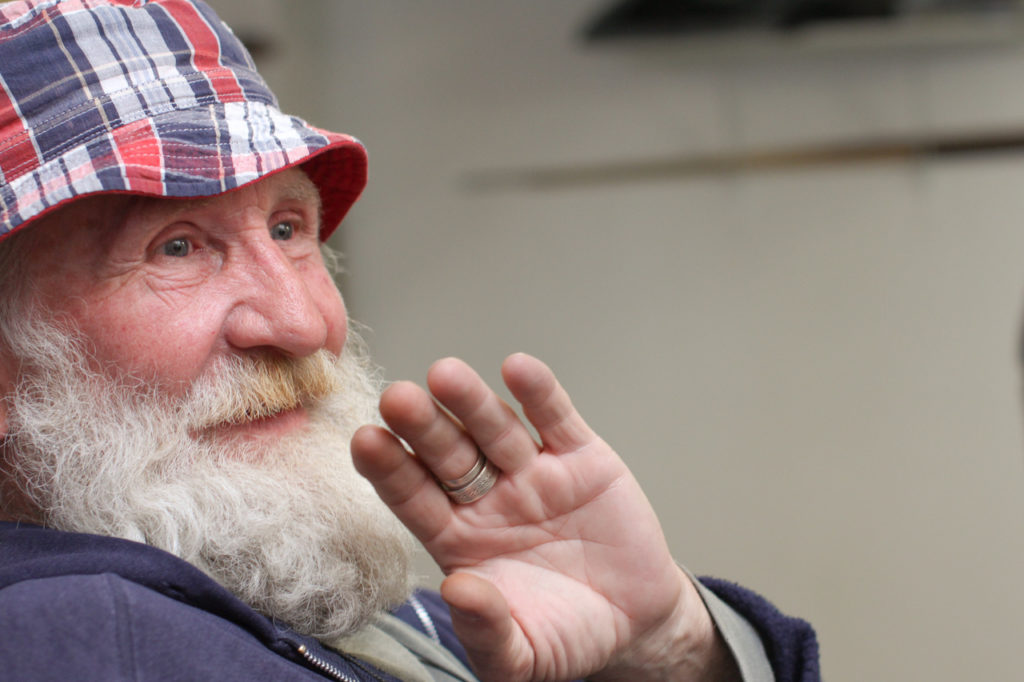
Can we ask you to spell your name for us? We don’t want to get it down wrong!
T – A – D – E – U – S – Z: “Tad” as in “Great”, “Deus” as in “God”. And who are you girls?
We’re a couple of university students.
You are? In what, drama? Literature? Sciences?
Sciences. Both of us we’re doing Immunology and Infection. Yesmine graduated, I’m almost graduated. Learning about disease, and the body, how it works, how it doesn’t work. You seem very well read and very well spoken — did you study literature?
Well I ended up spending some time at U of A but I didn’t finish. It was a short stay due to circumstances… (rubs fingers together). Abrupt changes in family too, I had to quit. But, the thing is I got the concept of a good reading list, how to follow a bibliography to get to expand on subjects.
I went to UofA and I got a job with a big construction company as a civil engineering technologist. But that was something that I worked myself into on my own. Meaning in lieu of taking advantage of some of the possibilities that had been in our education, I had a scholarship to attend Banff School of Fine Arts then and I had art exhibits all over the city.
What kind of art, what was your medium?
Crayon, mostly. There’s a recent artist that’s quite famous that is Canadian that drew similar sorts of things, yeah. His name starts with a “K” he does interesting landscapes. He brings in people doing activities. My activities and my people were children, and they were at play, usually. Children on snow hills, you know. A lot of color.
What drew you to crayon? Was it just that it was there?
Yeah. I have no technique in any type of way and I’m glad I didn’t because, why? One of my good friends he became quite a famous artist actually. He started in Poland, he went to Warsaw Academy of Fine Arts and then he stayed in France in Paris with this guy named Holice. Anyways, he was a good buddy of mine we travelled together a little bit through Africa and Europe. But, he ended up dying a few years ago from brain cancer. You know? And I keep on saying it’s from sniffing too much fumes, paint fumes! It can happen! You expose yourself to a lot of harm!
Oh my goodness, yes I can imagine all the solvent fumes can’t be good for you! I’m so sorry. Are you still drawing?
Very rarely. Here and there I need to do a technical drawing but nothing more.
Technical drawing?
Yeah it’s a sort of schematic. My original entry into the civil engineering field was I did a few courses of drafting in high school and circumstances at that time weren’t allowing me to go on with education, I went working for at that time it was called Department of Highways but today it’s Alberta Transportation, right? And I joined a survey crew and I ended up surveying with this mobile crew just moving around all over the province and doing measurements. And that led me very quickly into a job with municipal affairs in their Planning Department and I get the Alberta Library of Maps surveys. All the surveys being done in the province needed a stamp from our office.
For one thing, Department of Highways was a beautiful place to visit because it was unusual in its set-up. The interior consisted of really long tables about waist high and overlaid with mylar, a paper type on which you draw with India ink. I have I think two or three tattoos, these pinpoints. That’s India ink embedded in skin from cleaning my pen, you know?
I was also going to ask about family actually. You came here to Canada when you were 12. Anybody else come with you?
Oh, yes. A whole gang of people. My parents were carrying the baggage and I was surrounded with children, you know? Hands full of children at the age of 12, I was taking care of them. Half-siblings. The German army took my dad out to work as a labourer on the Eastern Front and they brought him back a year later when they were returning and they just threw him over the fence like a sack of potatoes, you know and this was probably late ‘44 and in ‘49 he died.
Oh my. Did he get sick or was he…?
Uhhh, you know the conditions of his death are a little sketchy to me, you know? I went back to Poland looking for people who have known the location of my birth, the house, it should still be there. But, I didn’t find nobody in the vicinity that was old enough. There was an old lady but someone told me, “You can’t talk to her, she’s senile.”
So, a lot of information went by me and me missing it by one year I think. There was a guy who was coherent and well-spoken but he wasn’t there anymore.
To me, as an immigrant, those years: the 1950’s in Poland were so dear to me, there was such reality that I carried with me on every day type of basis. It was constantly in my memory so going back, walking around the areas, like I spent 60 days just walking 12 km a day. It was a beautiful place to grow up.
Are there any memories that are so strong and clear that affect you? Because I know for me sometimes I go back to these memories in Croatia that are just so peaceful and so beautiful.
Absolutely, absolutely. I have a very strong memory of my very early years. Oh, very early. When I spoke to people walking around two years ago, I was asking whether they have seen any ghosts in their backyard. Because if they have, it was me, visiting them in my dreams, you know!
Is there any family here with you?
Oh, yes. Yes! I have that bunch that I brought from Poland — they’re quite successful people. We still speak, we have a fairly large extended family. And my son is a big rock and roll star.
Oh! Who is he?
Yeah, he plays for a group called Kobra and the Lotus out of Calgary. They play all over the world. They tour with Kiss, they opened for Metallica in Barcelona, Judas Priest in London. That’s the type of group.
And what’s your son’s name?
Jasio. J – A – S – I – O.
We proceed to look up Kobra and the Lotus on Google Is this him?We show a picture of him on our phones
Oh! A picture of him! Hahaha! With the hair and face he looks like a skinny boy! I got to give him a call! I spoke with him half way through. Yeah, he’s always out of town, you know? Here he phoned me the day of the Junos. They were participating in the Junos, they came in second in their group, to a group that was from Quebec that has been doing this heavy metal for thirty years, you know.
Wow! This is crazy! I am so blown away!
Yeah. But I have sisters that one did become a legitimate artist. She studied at U of A but she also studied in Warsaw School of Fine Arts. She came here and did a lot of ceramics. She did ceramic mosaics, walls, murals.
Are they still up anywhere we could see?
I don’t know where her art is, publicly. But she became a housewife and three children with a big yard.
Now I have to ask you, and you can feel free to decline if you’re uncomfortable, but I have a pen and notepad in my backpack if you would like to draw anything. I would love to see your work.
Ohh I haven’t draw since 1972! Speaking of the burning of the Notre Dame Cathedral you see, at that time in 1972 I was in Marseille. Where my buddy the artist, we sat down. We drew some roof tops. And one image that I really remember forever I think, we were pushing off the port of Marseille to Tunisia and we were travelling with a group of Tunisians, actually. Above the port there is a very tall hill with a golden figure and the sun was coming off of that but, there was a clothesline and the clothing from that clothesline I saw this shirt, hanging there. And the sleeve was waving goodbye, hahaha!
Oh, that warms my heart. That seems like a good place to end our interview. That was lovely.
To read more stories, visit: Hello Lumen Series

Helen
This interview conducted by Yesmine Elloumi and Jersey Manabat of The Lumen Series in partnership with Operation Friendship Senior’s Society.
April, 2019
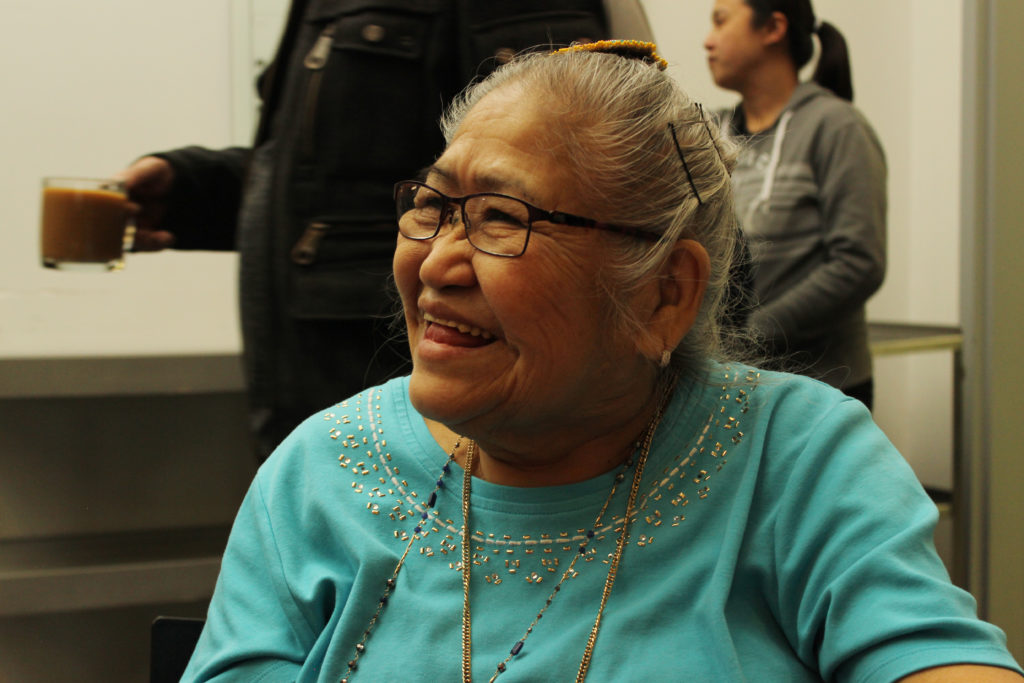
No wonder you wanted to take a picture of me, I’m too good looking!
Yes, your hair piece!
Oh this? I just curled it this morning.
First question we always ask: what is the happiest moment of your life?
Um, my happy life was when I was younger. I used to do a lot of housework, a lot of changing, cleaning, and I used to live in an old-fashioned way. It was lots of fun. My younger days I was living with my grandmother, went to school at Residential School, come back, I have to learn to speak my own Native tongue and I’m from Yellowknife, NWT. So, I moved here with my husband and years later, 1964, after we had kids all over this province. We raised our kids. Now I got 27 grandchildren and 14 great grand kids and they’re scattered all over the country. Some in Saskatchewan, some in BC, some in Alberta and they’re all over the place I don’t get to see them much but, someday I will!
So, when you went to Residential School you got to go back home?
Yeah, I came back home, lived with my grandmother. I went to the school for 8 years and then four years at a day school. Then I moved to BC! I worked all over the place. As a chambermaid, as a cook helper, and I had a good life.
You’re the first person I’ve spoken to in my interviewing who has attended residential schools. Did you enjoy it there?
I enjoyed it but some of them are just sad you know the way they treated us. Like my grandmother is better at looking after any kids because she was a good grandmother. My mom died when I was 2 years old so I was in Child’s Council for TB for three years. They flew me from Yellowknife to Edmonton. I stayed there till I got better then they flew me back and I was living with different people like foster parents and I was moved around then finally the government got after my grandmother, forced her to look after me. If she didn’t look after me I would have been raised in a white community. My grandmother looked after me pretty good, she taught me a lot of things.
Oh okay! Tell me some of the best things she taught you.
She taught me how to make dry meat and cook and clean white fish and clean the caribou meat, clean the ducks, everything! I lived with her in the bush, hunting for muskrats, cleaning the skins and all that, all kinds of things, it was beautiful!
Wow, I love it! Look at the smile on my face! It’s great! What was your mother tongue?
My mother tongue is Dogrib.
How do you say hello in Dogrib?
“Danatay”!
So, how long have you been here?
I moved here in 1992 from Prince George, BC. I lived there for thirteen years so wherever I worked, I had a job, I stayed there for a while. And then move on, keep moving, finally I settled down here in Edmonton.
And do you like it?
I like it. I like that in Edmonton I do a lot of volunteering here. I volunteered since 2004. I still volunteer: I make sandwiches, I cut potatoes, onions, carrots, turnips, whatever they have in the kitchen. I’ve been volunteering for a long time with them [OFSS].
Do you volunteer anywhere else?
No, just here [OFSS] because it is senior specific. Now, I just celebrate my birthday on December 15, 1947 I was born in Fort Resolution, NWT. I just turned 71!
And you’re looking great! You’re full of life.
Because I quit drinking four years ago! And I quit smoking one year ago. When I got sick a year ago, I had a bleeding ulcer and I just about died. My ex-boyfriend was taking care of me and I told him, “Call the ambulance I have to go to the hospital.” I got there in time they had a bed for me and when they got me in bed they had all the IV’s set up. I was just wired all over. They said you know Helen if you didn’t show up, you would be dead. I’m better now but I went back a couple times. Now, I eat better, I gained a little bit of weight because I had lost up 118 pounds! Now I weigh about 125 pounds. I feel good but my stomach when I eat food I get so much gas. I’m allergic to milk, I can’t have milk or cheese and I LOVE CHEESE!
Did you develop the allergy?
I got that quite a while ago. I’m on lactose tolerance pills.
Oh, yes, I have a lot of friends that are lactose intolerant and they drink their pill too so they can still have their cheese.
… I still get a lot of gas. (giggles). But I love eating I love doing things. I was so busy yesterday oh! I was cleaning all my ornaments, washing all my artificial flowers, I just throw them in the tub and wash them all with laundry soap. On Sunday, the caretaker said we’re gonna spray your place for bedbugs. So they’re going to do that Thursday morning. My neighbour got it next door, she got it and passed it down to me.
Oh, that’s horrible! At least they’re treating it!
Yeah, but I got a lot of work this weekend. Put all the ornaments back, ohhh so much!
In one week, you’ll be bed bug free and a clean home! Think about that!
Tell us about your beautiful hairpiece, because we were really attracted to it!
Oh! I bought this in Yellowknife! I bought two! And they were $75 each! It’s worth it. They got a little souvenir stories, that’s where I got it from.
What do you think about this place?
It’s okay. For a while, we weren’t getting any entertainment but now we get bingo, we get crosswords, you know? Watch TV, get the pool table. You know.
What do you like so much about OFSS? The people? The programs? The housing?
The people are good. Some get kind of grumpy, but it’s just the minor details. We all get along really good, just like a big family. And we all talk to each other, sometimes we get mad at each other but that passes.
What’s one of the things you think OFSS should improve on?
They should work on people that should get along, not argue on small detail, should just accept what we have. You know, we get treated well here. We get the best food, we get the best clothes, items, we get entertainment by other people coming in and we get to meet, you know, different people. I don’t like them when they get mad because they fight each other and that’s no good for other people and it gets really irritating. I like everybody get treated equal. Not criticize each other! I like when people get along with each other, just like one big family. Because I talk to everybody, I’m not shy. I got good personality and I show who I am and I let them be who they are and that’s the way we should be treated. Treat the best in each other and treat good with everybody. That’s how we should get along today. Not to be greedy, not to be selfish, you know. I like people get treated equal and get the best. And we love each other and we show we are good friends, that’s what I want!
The people that know you probably know you feel that way and so they act that same way when they are with you. I wanted to ask you one more thing, because I was really impressed with how you quit drinking four years ago and quit smoking a year ago. So I wanted to ask you: did you connect with a service to help? You can choose to not answer this, but: Was it an addiction or no?
No, no I just quit on my own. I didn’t need no help, I quit the smoking, I just didn’t bother!
You didn’t experience withdrawal or anything like that?
I never did smoke much because I only started when I was 27 so I wasn’t much into smoking because I had small kids and I looked after my family well.
Right, so you didn’t really have space for that!
No, I didn’t have time for that! When I started drinking with my husband, I got to the point where I can’t drink with my husband or kids no more. I said, “To hell with it!” and I just quit. But I asked the good Lord, like Jesus, to help me to be strong. I said I want to quit now, and I did. After when I quit, I saw Virgin Mary, was right beside my bed. And I seen the good Spirit with her to help me to be strong and I just quit like that. I never even missed it or nothing, just like I never drank before. When you ask the good Lord for help, he will always be there for you.
A lot of the people I spoke to, they also told me about how they really turned towards religion much more and it really helped them find strength in achieving the goals they had.
My daughter went through it too, eh? She used to drink, she used to smoke marijuana, all that. She just quit everything too. She quit drinking, she quit the drugs, she quit smoking, and now she raised two kids. She’s doing good.
I’m going to ask you something a bit different. With you being the first person to talk a lot more about your grandma and learning about your Indigenous culture, what do you think you do now? Do you talk to many other Indigenous people and talk to them about your culture?
I do talk to a lot of my friends and my daughter. She doesn’t want to listen to me but the other ones they will. I give a lot of people advice and I hope they listen to me and they understand how I feel about them and about their side of the story too. I got lots of good friends.
So, would you say your grandma is your number one role model?
She is. She is number one to ME! She took care of me and she done everything for me.
What is your best memory of you and your grandma?
Oh, I love going with her when her boyfriend came and got her with the canoe. With him, we went to the cabin and this guy he had a little garden. I seen the garden, I went and looked at it, I sat in the garden, I was eating those green peas. I was sitting there and her and her boyfriend they talked together, so I left them alone. That was my best time being with them.
Do you have anything else you want to talk about?
No, that’s it!
To read more stories, visit: Hello Lumen Series

Rick
This interview conducted by Yesmine Elloumi and Jersey Manabat of The Lumen Series in partnership with Operation Friendship Senior’s Society.
March, 2019
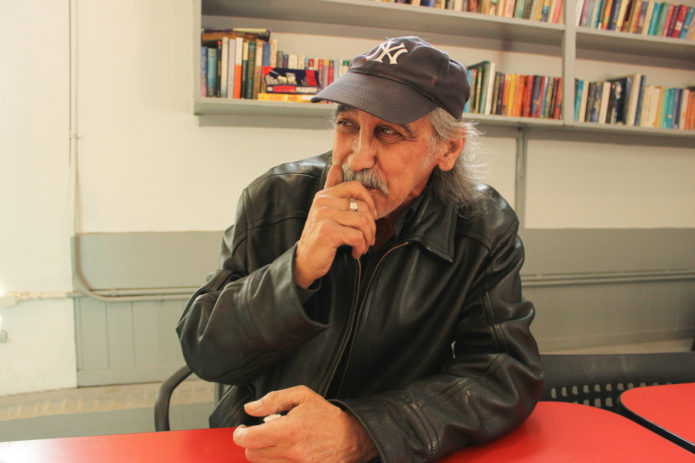
The happiest moments of my life? Hmm. Playing in high school. Sports. I was an athlete back in my days. Soccer, basketball. Played things like that. Those were the happiest moments of my life. High school. My favourite sport was soccer.
What’s your favourite sports team?
Montreal and Edmonton. For soccer, Juventus. Rome, Spain, any good team. Even Argentina, Boca Juniors. I played one game with Boca Juniors when I was 16 back in the 70s.
So you travelled to Argentina?
Well, my mother’s parents lived there. When we came to Canada in 1957 my dad’s sisters and brothers were here, right? So they sponsored us. So we came here and my mum’s parents went to Argentina with her two brothers so she was the only one here. So in 1970 my dad got tired of being treated like “Go back to your own country” and all this. There was that negative story that everyone that comes to Canada goes through that stigma. That “Go back to your country” attitude. So, he got tired of being called all that so we went to Argentina. So, we sold everything here and we moved over there.
How long did you live there?
Well for two months. He didn’t want to stay there anymore, right? I didn’t want to go cause I had my friends and everything else here. I was only 16 at the time. I didn’t want to go, but then when I got there, I didn’t want to come back!
Was this in Buenos Aires?
Buenos Aires, yes. I seen the machine guns at the Parliament building. It’s a nice country. That’s why I wanted to stay there. I had a chance to play soccer. Here in Canada it’s either football or hockey, right. But there I had a chance to play. Then we had to come back to Canada. Then we bought another house and started all over again. Got the place in Castledowns.
I also lived in Castledowns. We were basically neighbours! Did you ever feel like you wanted to go back to Argentina?
Of course.
And did you?
No. I ended up staying here. I ended up working here being a foreman. Then volunteering and then I worked over at the Mustard Seed as a caregiver and outreach and a part time pastor.
Oh, how was that?
Just like everything else. You just give what you got inside you. That’s all. I give from here *points to heart*. I speak what it is inside.
So what are you up to these days?
Uh, honestly? I’ve been lost for a few days. I just buried my mum on Saturday. And my dad is still in the hospital he’s been there since January. So the two of them were in the same place. One’s on one side one’s on the other side. My mom was 85 my dad is 88.
I’m so sorry.
That’s ok. It happens. We have to go once in a while.
How have you been coping?
It’s just like I said. I’m lost. It’s not that I see them every day I used to see them every day because they had their life and I had mine. So I just live day to day. I do my thing. Come here, volunteer, do whatever I have to do to keep myself busy. As long as I keep busy, I’m okay. Seeing that I got all these little problems that I got. COPD, gout. My legs all gave out yesterday I was on crutches all day. I couldn’t even move around. It’s like gout. It’s a touchy thing.
I mean I’m depressed and I gotta do what I gotta do inside I gotta try to be happy. I’m too serious, I’m a serious kind of guy. I am still able to open up.
I appreciate it, I really do.
Be as honest as I can be. If you ask me something else I’ll tell you the truth about something else but I think that’s enough, hey?
So then, do you have any goals? Or dreams?
My dreams are gone. My dreams were to play professional soccer. And I didn’t have a chance because I couldn’t go no where. Not here in the city you couldn’t go. I could end up being a coach I wouldn’t mind coaching a team. Stuff like that, I’d coach.
A lot of people that I’ve spoken to in the community have told me they realized that there’s a lot of change in the demographics we’re getting so many more families now and a lot of the kids want to play sports. So I was talking to a lot of parents and they’re thinking, “Damn would it be good to get subsidized leagues.”
The Boys and Girls Club, they do that. They need funding too. When I was at the Mustard Seed I had a kids program through Alberta Alternatives. It was funded by a man from Calgary who took me under his wing and he gave me a job. That’s what I had I had the kids every Tuesday I used to bring them to St. Albert from two o’clock to eight o’clock. I had the kids. We had a bus that was donated to us so we took the kids. Sometimes it was to the theatre, sometimes to the museum, bowling alley. Wherever I could fit them in, I took them there. At five or six o’clock whenever the doors were closed we had a BBQ at Borden Park. So we had some parents there that had everything prepared for us and we would get there and start munching with the kids and we would do arts and crafts. Then that got taken away because well — the funding! You’ve got Boys and Girls Club, The Big Brothers and Big Sisters, so where are we going to fit?
That sounds like such a valuable program if they could fit that into something that already existed?
That’s what it’s all about right? It’s for the kids. That’s what I’ve always told the Mustard Seed. The kids have to be involved. That’s when the parents started bringing the kids in to help out with the meals so to show the kids. You have to start with the kids. The parents already know what should be happening. It’s the kids that have to learn, to share.
In the Mustard Seed coffee area that’s where I had my couch and chairs and TV. A lot of people around here don’t have TV, so, on Saturday I had permission from whatever time to whatever time and, people came. And then I started Hockey Night Canada Trip. They showed Hockey Night Canada every Saturday. I started Safe Night for Halloween, for the kids.
So what is that? What do they do on Halloween Night?
The kids they just come over [to the Mustard Seed] and they have fun. They [parents] don’t want it over there anymore because, well, devils. That’s how they look at it. That’s how they see life. I didn’t see it like that *chuckles*. It’s a fun time for the kids! If the city has it, why can’t the inner city have it? So that’s why I started it. It was our 25th anniversary this year. The McCauley school let us have it this year and that’s where we can get it that’s where we put it. But yeah, I started that. And Meet the Street.
Meet the Street? I’ve never heard of that or been to it
They started off with $3. Before it was with nothing, but now the people that sponsor the Mustard Seed they get $3 and that’s all you get for the whole night. So you take a scenario: you’re a prostitute, you’re a drug dealer, you’re this, you’re a homeless guy. So you take that and you go around pretending you’re one of those people. And then you see how far it goes.
So what does the money have to do with it?
Well the money like that you only have $3? Well that’s to buy yourself a coffee, to see how far you could go on $3. Or nothing.
Last question. In terms of OFSS, how has your experience been with it?
Fine, good. Not excellent. They have their problems.
Do you have one nice memory of your time here at OFSS.
See how long I have to think about it? Just being around certain people, some of the staff, that see what I see.
Which is?
Realism. But they don’t do nothing about it. They could be doing more but they don’t. Either they’re afraid of being canned for speaking up. We have all these meetings every month. What’s the point of having these meetings if nothing is done.
Let’s say you were one of these people — the staff — what would you do?
I would start programs. Education. The individuals that need help with their life. If they’re just users, if they’re just using the premises for whatever reason then it’s not a sustainable solution. These guys [OFSS Staff] can only do so much! Right? They can’t start sending people to some kind of class. Life skills. They should be sending more people to get life skills, show them what life should be all about so they can help themselves. Not to depend on other people. Someone walking around with a cane just so they can be first in line? Heh? And then they’re walking around that pool table like nothing happened! You know! You got to open your eyes. Two words in life: common sense. How are you going to teach common sense? As long as you have common sense, you’ll go far in life.
And social supports.
Ahhh social supports.
Not government ones, necessarily, I meant personal ones.
Community! But with heart. You need real people, you need people that just care about keeping their jobs. Saying what you want to hear. Isn’t it time that the good people start coming out of their shells? And I didn’t even go to school for all this. It comes from in here *points to heart*.
To read more stories, visit: Hello Lumen Series

Judy
This interview conducted by Yesmine Elloumi and Natalie Czuczman of The Lumen Series in partnership with Operation Friendship Senior’s Society.
Dec 20, 2018
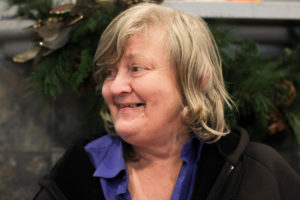
We always try to start by asking people if there’s a moment in your life that’s really awesome or that made you really happy or that you were in awe of?
Probably the birth of my son, I would guess.
And how old is he?
54.
And is he in Edmonton?
No, he’s in Dawson Creek and he has four children.
Do you see your son often?
That’s one of my saddest parts, I haven’t seen him for 5 years. I’ve never met my grandchildren, and I’m planning on trying to open that door. Whether it will open or not, I don’t know. ‘Cause I was with some very violent men when he was little. I had him and at 4 years old I sent him back to his dad, because the fellows were scary. The safety of my child was first and foremost. And my family rejected me. And yeah, I was quite rejected, by the community also, because women didn’t do that. But all I knew was that I had to get my son out of the mess that was happening and his dad was a good man. So that’s what I did.
How did that feel? That’s a heavy question, I know. But I don’t think many people our age know how it feels to be condemned by a group. You know, you’re usually accepted by the group because you live in a bubble. But as you grow up you start to make decisions that go against the group. How did that feel?
Well, terrible. Horrendous. Especially about my son. But even prior to that I was the “bad girl” in the town. There were a few of us. But my dad being the boss of all the men in town made it doubly as shameful. Yeah it wasn’t pretty.
How did you get through that?
You know, I can honestly say that I probably really didn’t. That’s why I ended up down here, because all of that.
Do you think now you have a little bit of perspective?
Oh yes. Much. This landed me in a — because I was always saved, eh. Whether it was by a friend or by a … somebody. Somebody. Somebody was always giving me money, so I always had a way out. This time I didn’t. But my brother did come, I was in hospital for a few days, and he rejected me. Now I’m left… and I’m scared, I’m really scared. You know I’ll be 70 and I’ll …
What’s hopeful though, even a little, is that you have perspective and awareness.
Oh well thank God for that.
There are a few senior places where there are seniors who are in trouble like myself. But I went there and there were all states of brokenness. Physically and … It made me ill so I had to get out of there.
So why do you keep coming back here [OFSS]?
Because this is … it’s older people and it’s a safe haven.
Well at least I’m glad you can come here and feel safe. And I think it’s important to cultivate those spaces.
Oh absolutely. I feel very safe here. And I really need that now. I do a lot of journaling, and a lot of stuff has come out that has even surprised me. Well because I’m in a different space in my life now.
Are there any people that have been allies for you here?
Oh yes plenty. Well this gal here *points to Giselle*, she’s at the Hope. And I met her a long time ago at WEAC, Women’s Emergency Accommodation. There’s been a couple. It’s comforting to have a little bit of something.
So how did you start reading cards?
Well there was a woman in north Edmonton and I befriended her. Her name was “just Mary” — that’s what she called herself— and she lived in a big beautiful house. And somehow and I grasped it from there and I started reading.
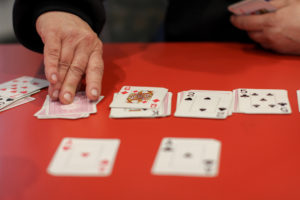
So it’s tarot cards?
No just ordinary playing cards.
Can you do it for us?
Well… I really don’t [feel comfortable]. Sorry.
No don’t you talked about how the right energy has to be there!
I’m all buggered up right now, I’m all over the map.
Can you explain the process?
People choose cards and they represent different things and eventually the personality comes out. And then eventually the person starts talking, and the cards correlate with what the person is saying.
So you must be able to read people really well?
Well they tell me that I am. I’m a channel I guess, they tell me. It’s what I’ve been told. I’m not saying that it always, always works. Some people never open up. They’re just shut and that’s it. If I’m not aware of my own — duding reflexology or reiki or any of that — you can’t get any of your energy in there or you’re dead in the water. You can’t do it. Because you’re taking on the other person’s energy now, plus your own, and you’re dead. You have to put a — some put a white circle around themselves… there’s a bunch of methods, whatever works for them.
That’s such a good metaphor for life [and relationships], because you can’t give someone all of your energy, you need to have your own barriers. Or else you get lost.
Oh absolutely. Even you girls interviewing people, you have to be aware. The word “closed” isn’t the word I’m looking for, but you can pick up other people’s energies and you can become very ill. So dealing with people you have to be very aware of your own stuff. And if something is cropping up you have to deal with it. Because inevitably you’re working with people, you’re going to get something. Something is going to trigger something else. So you have to be fully aware.
And I think that takes knowing yourself fully.
Absolutely, you have to know is triggering for you and not push it aside. Because you can become very ill with all sorts of things.
Well hopefully you can get back to practicing soon. We really hope that for you.
Oh thank you girls, I hope so too.
To read more stories, visit: Hello Lumen Series

Bob Whyte
This interview conducted by Yesmine Elloumi and Natalie Czuczman of The Lumen Series in partnership with Operation Friendship Senior’s Society.
Dec 20, 2018
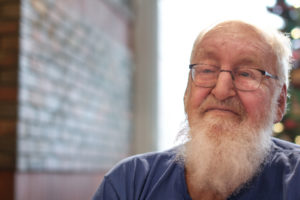
We always like to start by asking people to talk about their happiest moment of their life
I guess there was a sense of aw when I was at Murchison Falls National Park in Uganda. I came to the falls and the animals were so enormous, the crocodiles were the biggest I’ve ever seen in my life, huge hippos and almost invisible flies that could get into your eyes and cause you blindness. But, that part of the Nile I saw my first hippo walking along the bottom of the Nile. When I first came to the Nile, after passing a sign saying, “Elephants have right of way on the road.” Now, no one is going to challenge an elephant but the signs were needed because there were elephants around.
How did you end up in Uganda?
I had left Canada on a trip for four months as a delegate to a conference in the near East and after that while I was over there I wanted to learn more about my own Western European culture so I decided to spend a year and three months in Europe, which I did. And then I felt I was not ready to come back to Canada yet but I didn’t know where to go — and the answer came in a dream! The dream was to go to Africa. And so I went to Marseille, France to take a maritime boat towards Reunion but the boat was full so I had to wait one month and I got a seat on the next boat, but then the military displaced me! And I’m glad they did because that boat sunk and a lot of people lost their lives! So I took the third boat and that took me all the way down to past Egypt and down past Djibouti and then to Tanganyika where I left the boat and visited there a while before going over to Zanzibar and then up to Kenya and then to Uganda and that’s how I got to Uganda!
What pushed you to go and leave for a year?
When I was young, growing up, even before going to school I had a sense of some kind of a path that I was following and being a little boy about four years old they said “What are you going to be when you grow up?”. It’s a common question. My answer was: “I’m going to the school that is after school.” I didn’t even know the word for university. So, I knew what path I was going to and then I was working in a farmer’s field in Saskatchewan and the farmer asked me, “What are you going to do when you finish school?” I was in grade 11. I said, “Well, I think that I’m going to university. I don’t know how but I I’m going to go to university.” And he said, “What are you going to take?” and I said, “I don’t know. Law, I guess?” And it came out of nowhere but that turned out I did well in four subjects: music, geology, and law, and one other subject and then when I was in grade 12 my English teacher was married to a lawyer and he took me into his office and he told me about all the good work he was doing for the Boy Scouts — and that caught my interest. So, I applied to go to university and I got enough scholarships so that I went year by year.
Did you go to the University of Alberta?
The first two years at the University of Alberta, then UBC, then two more years at the University of Alberta. I got a scholarship to go from university to another and then to go back. That’s what that scholarship was for, to go to a different university and get ideas and bring them back to the first university and the idea that I brought to save a lot of students money on books by having a book exchange. It was at UBC but not at U of A and I brought it back to U of A and it saved a lot of students a lot of money, I bet.
It still exists, we still have book exchanges!
That’s the one I’m talking about! I guess I’m the author for the Alberta one!
And then you worked as a lawyer?!
Yes, but don’t tell anybody because too many people will ask me for free legal advice and I’m not in practice right now! *Laughs*.
We also wanted to ask everyone about their experience at OFSS.
Well when I came back to Canada after leaving for a four month’s trip but coming back seven years later instead *laughs*. I didn’t know where to start and so I went to the Boyle Street Co-op and the lady there in charge of housing suggested I go to OFSS. So I came to speak to a housing officer and she took me to one place that I didn’t like because it was too dark but then took me to another place, which I liked! So, I moved into there and I so appreciated OFSS and their attitude to things that I wanted to help them and at that point in my life I was stronger than I am now so I did a lot of volunteering. I’ve been coming here for I think this is my 19th or 20th year. It’s because I feel that there is a lot of good value that this organization brings to our community and I’m willing to be a helper, an assistant to them in serving a lot of needy people. In particular, there are some people that are hard to house. They will deliberately let things run over because they feel it’s some way of expressing themselves in their great freedom although they’re destroying their own home. And yet, these people need help. They’re part of us and OFSS is willing to help them and because of that, I’m willing to help them.
Do you come here every day?
No. I try to come here Monday to Friday. I do not want to come here normally on Saturdays and Sundays. I meet a lot of people here, people that have become my friends. I like these people. I feel part of them. I want to help them. I feel this part of my life. Part of the reason why I am here in my life at this stage in my life is to be the help I can. It makes for a fulfilling life. I feel good about what I’m doing here.
Is there one thing that you like to do on the weekends?
A very harmless, tame thing. I like to read! How can you get more harmless than that?
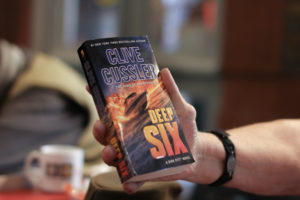
To read more stories, visit: Hello Lumen Series




